Doom in the desert

This story originally appeared in the Oct. 13, 1980 issue of Sports Illustrated. Subscribe to the magazine here.
Round I had ended, and Muhammad Ali, slumped on the stool in his corner, knew then what the world would soon discover. The recently regained body beautiful was no more than a clever counterfeit. Ali was a Ferrari without an engine, a Rolex with the works missing. There was nothing inside. As Ali sat half listening to trainer Angelo Dundee, sadly he understood that the career that had burst so brilliantly into being 20 years earlier at the Olympics in Rome would end this night in humiliation and defeat in a Las Vegas parking lot.
The fight—if Ali’s painful performance against WBC champion Larry Holmes last Thursday in a temporary stadium erected by Caesars Palace can be called a fight—would continue for another nine rounds. But Ali, betrayed by a body that no longer obeyed the commands of his ego, knew after but three minutes of fighting that there would be no fourth heavyweight title; there would be no miracle. As others had before him, he had come back one time too many.
Ali would say later, “All I could think of after the first round was, ‘Oh, God, I still have 14 rounds to go.’ I had nothing. Nothing. I knew it was hopeless. I knew I couldn’t win and I knew I’d never quit. I looked across at Holmes and knew he would win but that he was going to have to kill me to get me out of the ring.”
From The Vault: Every Ali Cover Story
- Cassius invades Britain
- My $1,000,000 Getaway
- Cassius—His Fight And His Future
- The Big Fight: Can Clay Do It Again?
- Cassius Clay vs. Sonny Liston
- The Fight You Didn't See
- The Big Fight: Clay vs. Patterson
- Cassius Clay: The Man, the Muslim, the Mystery
- The Big Fight: Clay vs. Terrell
- Scramble for Ali's title
- Ali-Clay; the once and future king?
- The Slugger And The Boxer
- End of the Ali legend
- The future is a mist
- The Jaw is broken
- Ali Again
- Muhammad Ali: Sportsman of the Year
- Boxing's New Barnum
- The Epic Battle
- Ali's Road Show Rolls On
- Ali's Desperate Hour
- The Champ Again
- Look Who's Back!
- He's no Liston. He's no Frazier.
- The Last Hurrah
- The man and his entourage today
- 35th anniversary
- Once and Forever
- Battle of Champions: Ali vs. Frazier
- Who's that guy with Howard Bingham?
Ali, who would be sitting on that same stool 35 minutes later as Dundee signaled surrender before the start of the 11th round, did not come into the ring old and fat; he came in old and—for him—thin. Too thin. A blubbery 256 pounds just a few months ago, at the weigh-in the day before the fight he had balanced the scale at 217 1/2 pounds. And with his graying hair dyed black, to outward appearances he had wiped away 10 years. But while no one knew for certain then, this was to be his final victory. He had won the battle of the bulge but it had cost him—if indeed he had ever had any chance—the war. He had gained sleekness at the cost of strength and endurance. It was as though he had trained for a beauty contest and not for a fight.
As Keith Kleven, Holmes’s physical therapist, explained: “Getting his weight down, looking fit and trim, became an obsession with him. He thought if his weight came down everything else would fall into place. He lost at least 37 pounds in a very short period. He went too far. When you lose so much so fast, after such a dramatic change in diet and physical activity, there is a drastic change in the function of the body’s enzymes. Instead of losing fat, you begin to deplete muscle substance. Strength and stamina are lost. It wouldn’t have mattered either way, but against Larry the old man was merely a shell of his former self.”
Four weeks before the fight, as Holmes trained in his hometown of Easton, Pa., for a brief time it had looked as if it wouldn't matter if Ali weighed 217, 256 or 300 pounds. That was on the day the champion threw a right against sparring partner LeRoy Diggs and felt pain searing through his hand. It was the same hand he had broken in a bout with Roy Williams in 1976.
Holmes was rushed to the hospital, where X-rays showed there was no fracture this time. Still, there was this terrible pain. The punch had caused a severe bone bruise and soft-tissue trauma in the carpal bones of the wrist and the metacarpal bone junction just above the thumb. After consulting with Holmes’s manager-trainer Richie Giachetti, Kleven treated the fighter’s hand three times a day for two weeks. He also devised a foam cast that the champion wore under the tape on the hand during his workouts.
“And he wore the cast at night,” said Jake Holmes, the champion’s older brother. “Then we’d take it off in the morning before any reporters showed up. The hand hurt Larry but it kept improving, and we didn’t want people making a lot more out of it than it really was.”
When Holmes arrived in Las Vegas for his final three weeks of training, there was no visible evidence that he was in anything but excellent physical condition. He worked harder for Ali than for any previous opponent. He ran more, sparred more. In Easton, part of his roadwork was on a hill that soared nine-tenths of a mile almost straight up. In Las Vegas his route was out where the desert grades upward toward the mountains. Most mornings he ran five miles at a seven-minute pace. Every morning he ran with grim determination.
During sparring, Holmes worked over his hired hands with savage intensity, and when he was done he had boxed 210 rounds. “He was averaging 75 punches a round,” said Giachetti. “I counted rounds as high as 95. Now you know why he pays his sparring partners $1,000 a week and offers them a $10,000 bonus if they can knock him down. When Ali spars he’s playing; when Larry spars he’s all business.”
While “playing” on an afternoon 11 days before the fight, which would earn him $8 million, Ali, too, had experienced a sharp pain, in his left arm. He had pulled a muscle. The following morning several members of Ali’s staff went to the Desert Springs Hospital and tried to purchase an ultrasound machine and a muscle stimulator. They were asked if they had the required licenses to operate them.
“We'll pay any price,’ was the reply. “Just give us the machines.’
“Sorry.”
As has been his habit for years, Dundee, who has trained Ali since his second professional fight, arrived for the final stages of the former champion’s training. Dundee watched and he frowned, and then he watched some more and he began to worry. He saw the flat stomach and he was impressed, but everything else he saw left him depressed.
While sipping coffee in his room, Dundee put his fear into words. “The gym,” he said, “did you see him in the gym?”
“Yeah, he was doing nothing. Those sparring partners were all over him.”
“It's not that,” Dundee said. “Ali hasn’t won a round in the gym since I’ve known him. He’s the worst gym fighter in the world. But he always showed me flashes: 10 seconds, 15 seconds. Out there I begged him: show me something. Just show me a little. It wasn’t there. He didn’t have anything to show.”
In Room 301 of the same hotel Ali was once again—perhaps for the 100th time, or it could have been the 1,000th—watching a TV tape of Holmes’s lackluster but winning fight against current WBA champion Mike Weaver. Of all the fights Ali could have picked to study, this showed Holmes at his worst. Holmes had been ill from a virus that would have put most men in bed when he stepped into the ring against Weaver. An hour before the fight he was injected with a double dose of antibiotics. It was a miracle he could walk, much less fight.
When the tape ended, Ali stared at the flickering light. Then he said, “I got to go out and win the first five rounds to win the judges, to win the people. I’ve got to go right out and attack him, then stick and move. That’s why I lost to Spinks. I lost the first four rounds and I never got them back. I can’t lose this fight. I’ve shot off my big mouth too much. If I lose, the press will tear me up. You don't think I can lose, do you?”
The question hung in the air like the blade of a guillotine.
Gene Kilroy, the administrative aide who brings some semblance of order to the madness of Ali’s tumultuous entourage, finally sliced the silence. “It's no contest,” said Kilroy. “You’ll eat him alive.”
Satisfied, Ali went on, “I've got myself to the point where I’m so psyched, it’s either life or death. I’m a Kamikaze pilot. Holmes is only thinking about his little kids, his big house, his wife and his swimming pool. All I’m thinking about is winning.”
On a large mirror on one wall of Suite 4520 in Caesars Palace, Holmes had indeed taped up a huge hand-printed sign that said FIRST: MY WIFE, MY CHILDREN, MY FAMILY. MY HOUSE. P.S. MY POOL.
Over it was a picture of his wife Diane and his six-month-old daughter Kandy, and just to the right of this list of priorities, on purple art board, was an architect’s drawing of the home Holmes is having built in Easton. On another wall was a small picture of Ali. Luis Rodriquez, Holmes’s press representative and friend, had blackened both of Ali’s eyes with dark ink—an accurate prophecy.
Less than 48 hours before the fight, Holmes, his hand healed, and now weighing a fit 211 1/2 pounds, sat in the suite with Kandy planted on his hard left thigh. She gurgled a sentence and Holmes laughed as he translated. “She just said I was going to whip Ali,” he said.
Then the smile was gone; the moment became serious. “I hear that Ali was in his room at 5 a.m. watching films of my fight while I was sleeping,” Holmes said. “Why? Because he’s worried and he can’t sleep. We talked last night. We made a deal. We are going to meet in the center of the ring and we are going to fight until one of us drops. I’m not mad at him. In fact, I find him amusing. He makes me laugh. I’m a nice guy outside of the ring. But no one should mistake my kindness for weakness.” Holmes’s voice dropped and hardened. “In the ring I am a different person. All I’ve heard since I’ve been fighting is Ali, Ali, Ali. I’m sick of being compared to him. If Ali killed me in the ring I wouldn’t care. All I want to do is go out there and get the monkey off my back. I want to get him out of there as fast as I can. If I can knock him out with my first punch, then that is what I am going to do.”
Despite an unseasonably hot spell in Las Vegas, the night of the fight was relatively cool. No wind had been predicted, but a slight breeze had come up from the northeast, wafting refreshingly through the 24,790-seat open arena. At 8:07 p.m., Ali came into the ring. His face was grim. Seven minutes later, Holmes, appearing even more grim, followed him.
Then Ali and his sidekick Drew (Bundini) Brown went into their act. The sellout crowd, which had paid a record $6,200,000, began to chant, “Ali! Ali! Ali!” Grim no longer, Ali lunged as though to attack Holmes but was restrained by Dundee and Assistant Trainer Wali Youngblood. “I want you,” Ali screamed at the champion, who stonily ignored him. As Jake Holmes held up his brother’s green championship belt in answer to the crowd’s chants, Bundini charged toward Jake, who would probably go off at even money against a tank. There was a flurry of bumps and shoves and shouts, and subsequently Bundini decided to harass Holmes from a distance.
As the Ali-Bundini act swirled toward madness, Holmes, continuing to ignore them both, walked over to the box of resin dust. Ali tried to block his way. Holmes shoved him aside. “I just wanted to show him I wasn’t there to clown around,” Holmes said later. “I was there to fight.”
Finally, Referee Richard Green, who was getting fed up with the crowd scene, yelled to Dundee, “I'm going to have them ring the bell.”
“Please do,” said Dundee.
But Bundini wasn’t finished. “I want to bet $500,” he screamed at the Holmes camp.
“You got it,” said Giachetti, getting to him before Jake. The two men shook hands to seal the wager, and with that sanity reappeared. The ring was quickly cleared, and the fight was on.
Holmes came out with a rush, and Ali tried to fend him off with a wild looping right that missed. Holmes introduced him to his jab, which is a ripping weapon, fired hard and true, and is more damaging than most fighters’ hooks. Then he hooked Ali to the temple and drilled a right to the head. The tempo was set; the final chapter of a legend was being written under the darkened Nevada sky.
Ali’s jab, so brilliant in the past, was no more than a tired push. It was both little used and useless. In the first round he hit Holmes with one solid right hand over a jab. “A-li! A-li! A-li!” In the second round he scored with two rights. “A-li! A-li! A-li!” But even the chant seemed to have lost some of its fervor, its hope. From that point on there was nothing, only a condemned man waiting to be summoned from his cell.
But Giachetti was taking no chances. When Holmes came back to the corner after the second round, Giachetti said, “Did you see that right hand? That's all he's got.”
“I saw it,” Holmes assured his manager. “I saw it and I said, ‘Oh-oh, I better take a step back and get serious.’ ”
“Well, that's the punch I warned you about.”
“I know.”
What they didn’t know was that Ali didn’t have another right hand in his arsenal. He was through. All he had left was his mouth. After taking a beating in the third round, Ali followed Holmes to his corner shouting insults. The referee grabbed Ali and pushed him toward his corner. “You're scared to death,” Jake Holmes yelled at the retreating ex-champion. Larry Holmes took no notice.
By the fourth round Ali, an exhausted man trying to survive, had an ugly bruise under his left eye.
After the fourth round Giachetti told Holmes to work Ali into the middle of the ring. “The ropes are the only thing holding him up,” Giachetti said. “Get him out where he can fall down.”
Over in Ali’s corner Dundee was begging his man to fight. “I was trying to pump him up,” Dundee would say later. “But you can’t pump up what isn’t there. You can’t get water out of a dry well.”
It had almost ended in the fourth. Near the end of the round Holmes caught Ali with a vicious right hook to the kidneys. Ali’s knees began to buckle. Holmes thought the fight would end at that moment: “When the hook hit him he moaned and started to fall. Then all of a sudden he jerked himself up. His damn pride just wouldn't let him fall. There’s not another man on earth who would have been on his feet after that punch.”
Ali fought the fifth and sixth rounds like a man in a semi-daze. He was continually blinking as though trying to clear his head. When he wasn’t blinking, he just stared, as if trying to make out a figure moving swiftly through a fog. The figure was Holmes, firing bursts: lefts through Ali’s upheld hands, then thudding jabs down to the midsection. But after each brutal flurry, the champion would step back as though reluctant to go on battering this man who once was his idol and would not fall.
In the seventh, seemingly rejuvenated, Ali came out dancing, firing the jab, stirring hope in the hearts of the sentimental. But it was only the final gasp of a man who knows his difficult craft well but doesn’t know how to surrender. Ali fired 18 straight jabs; the first 17 missed. He danced for a minute and 15 seconds ... and then almost fell from exhaustion. After that, Ali didn’t throw a single meaningful punch. It was as close as Ali would come to winning a round.
After the eighth round Dundee warned Ali that if he didn’t start fighting, the referee was going to stop it. In the ninth Holmes hit Ali with a quick, tight right hook and followed with a stunning right uppercut. Held up by the ropes, Ali turned his back on Holmes and, cowering, covered his eyes with his gloves. It was almost unbearable to watch.
The fight should have been stopped then. But when Green hesitated, Holmes moved in for the finish. With tremendous will Ali forced himself away from the ropes and—with the crowd imploring “A-li!
A-l ! A-li!”—survived the round.
Barely able to stagger back to his corner, with ugly bruises under both eyes, Ali slumped onto the stool. “This is your last round,” Dundee told him. “One more round and then I’m going to stop it.”
There was no response.
When the bell rang for the 10th, Ali forced himself to his feet and staggered forward. Holmes was on him quickly: four jabs, a right, a hook, two jabs, a hook to the kidneys, a three-punch combination almost too fast to follow, and then a barrage that probably would have destroyed half of the heavyweight division. Incredibly, Ali was still on his feet.
And then the fight started in Ali’s corner. “That's it!” Dundee screamed at Green. “It’s over.” Bundini, tears streaming down his cheeks, clawed at Dundee’s sweater and begged, “No, one more round, one more round.”
“Take your goddam hands off me,” Dundee snarled. “He can’t take any more. He’s defenseless. Get the hell away from me. I’m the boss here. It’s over.”
On his stool Ali lifted his head as though to protest; instead he slowly let his head fall. He said not a word.
The furor was over nothing. Green said later that if Dundee hadn’t stopped it, he would have.
When he realized that the fight was over, Holmes, tears in his eyes, rushed across the ring and embraced Ali and kissed him on the cheek. “I love you,“ Holmes said. “I really respect you. I hope we’ll always be friends. Your house or my house, if you ever need me for anything, just call and I’ll be there.”
Slowly they led Ali from the ring to a nearby trailer that had served as his dressing room. He said he just wanted to lie down for a moment. Then Kilroy ordered a limousine to drive the battered fighter the few hundred yards back to the hotel. Upstairs in his suite they asked him if he wanted to undress and take a shower.
“No,” Ali said slowly. “I think I just want to lie down and rest for a little while.”
Within half an hour, Holmes and his brother Jake came to the suite and went into the darkened bedroom.
“Are you O.K., champ?” Holmes asked. “I didn’t want to hurt you.”
“Then why did you?” Ali asked, laughing softly.
Holmes hesitated; then, “One thing is really bothering me. They say I thumbed you. The referee came over in the third round and said your corner said I was thumbing you. Now don’t jive me. Did I thumb you?”
“No,” said Ali. “You didn't thumb me. I don’t know why they said that. I don’t know, Larry, something was wrong with me. Either I was too old or I was too light.”
“Both,” said Holmes. “Now I want you to promise me one thing: that you will never fight again.”
In the darkness Ali began the low chant that had been heard so often in the weeks preceding their bout: “I want Holmes. I want Holmes. I want Holmes.”
“Oh, Lord,” said Holmes, laughing. “Jake, let’s get out of here.”
Only a few hours later, at 4 a.m. Las Vegas time, Ali, his puffed and blackened eyes concealed by dark glasses, was up and being interviewed by David Hartman on Good Morning America. “Next I want to fight Mike Weaver, the WBA champion,” Ali said.
Oh, Lord! World, let’s get out of here.
SI's 100 Greatest Photos of Muhammad Ali
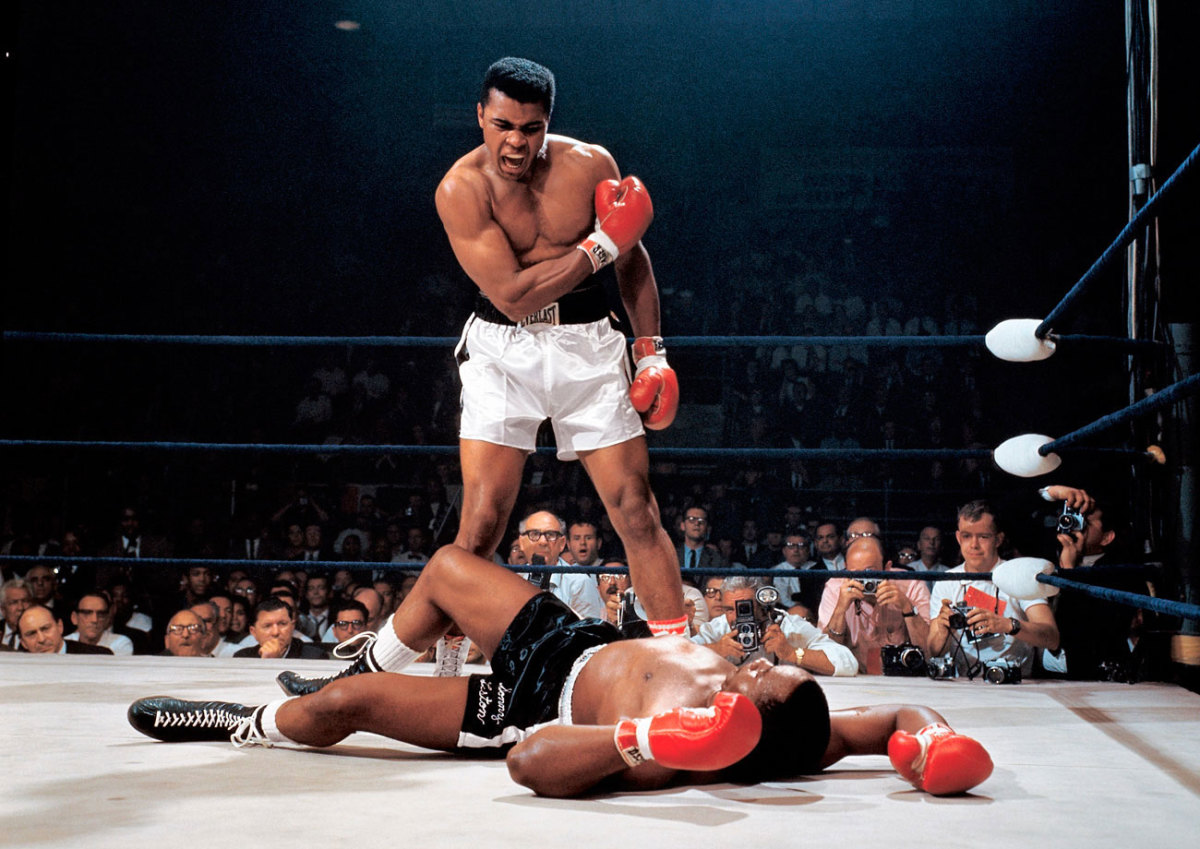
In one of the most iconic and controversial moments of his career, Ali stands over Sonny Liston and yells at him after knocking the former champ down in the first round of their 1965 rematch. Skeptics dubbed it "the Phantom Punch," but films show Ali's flashing right caught Liston flush, knocking him to the canvas. Refusing to go to a neutral corner, Ali stood over Liston and told him to "get up and fight, sucker."
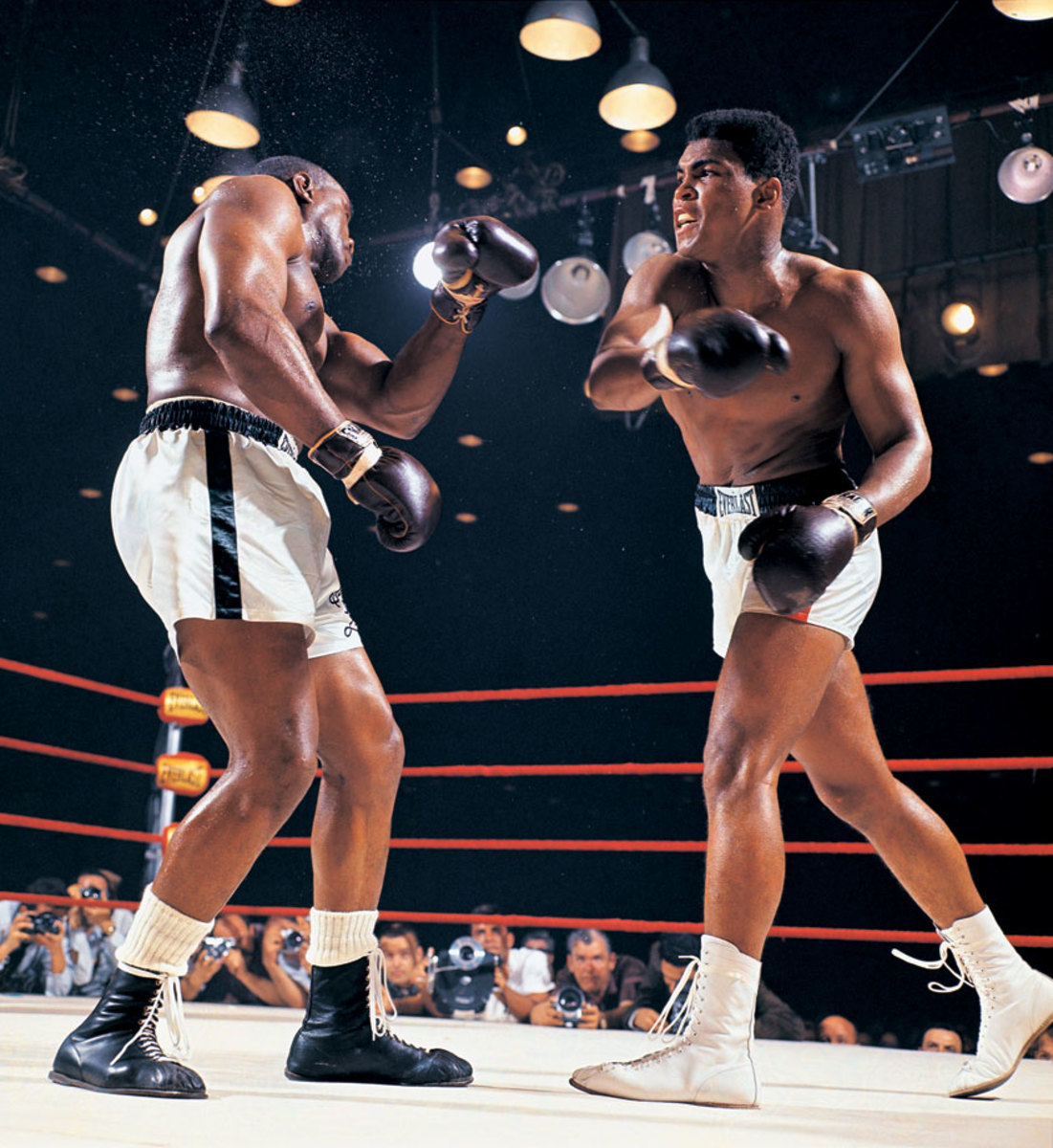
At 22-years-old, Cassius Clay (Muhammad Ali) battered the heavily favored Sonny Liston in a bout that shook the boxing world. The fight ignited the career of one of sports' most charismatic and controversial figures, whose bouts often became social and political events rather than simply sports contests. At the peak of his fame, Muhammad Ali was the best known athlete in the world. Liston, one of the most feared heavyweight champions in history, was a 1-8 favorite over the young challenger known as the Louisville Lip. But Clay, here stinging the champ with a right, used his dazzling speed and constant movement to dominate the action and pile up points.
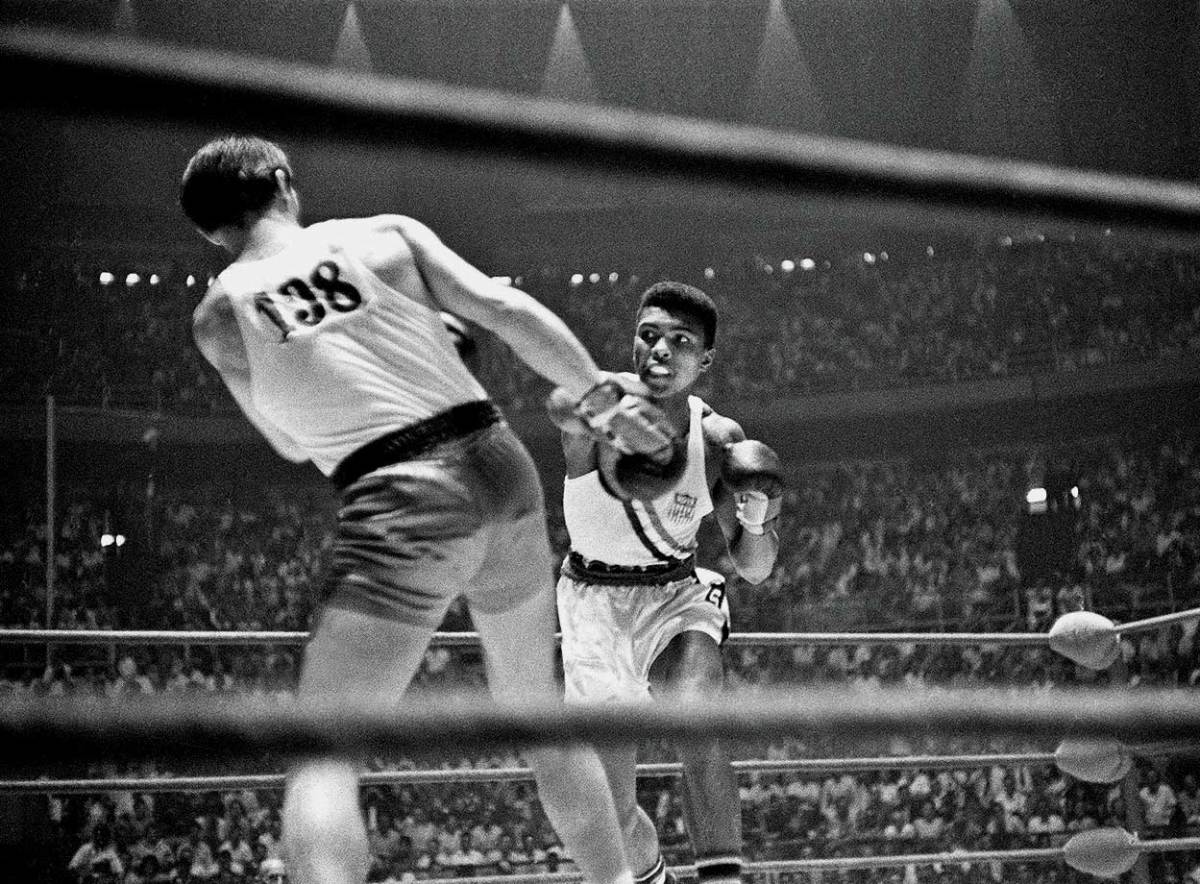
Cassius Clay punches Zbigniew Pietrzykowski of Poland during their gold medal bout at the 1960 Rome Olympics. Clay defeated Pietrzykowski 5-0 for the light heavyweight gold medal.
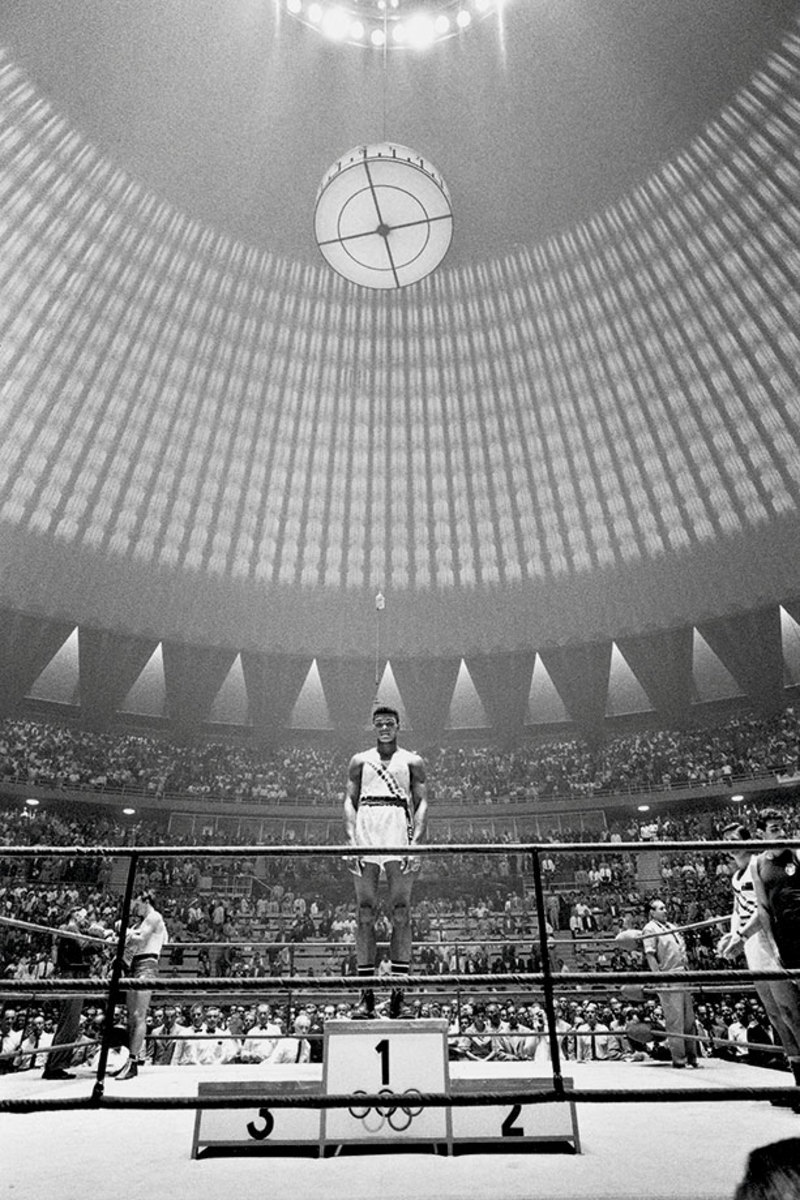
For the 18-year-old from Louisville, here atop the medal stand after his Olympic victory, all roads led from Rome. Clay finished his amateur career with a record of 100-5 and made his professional debut two months after the Games.
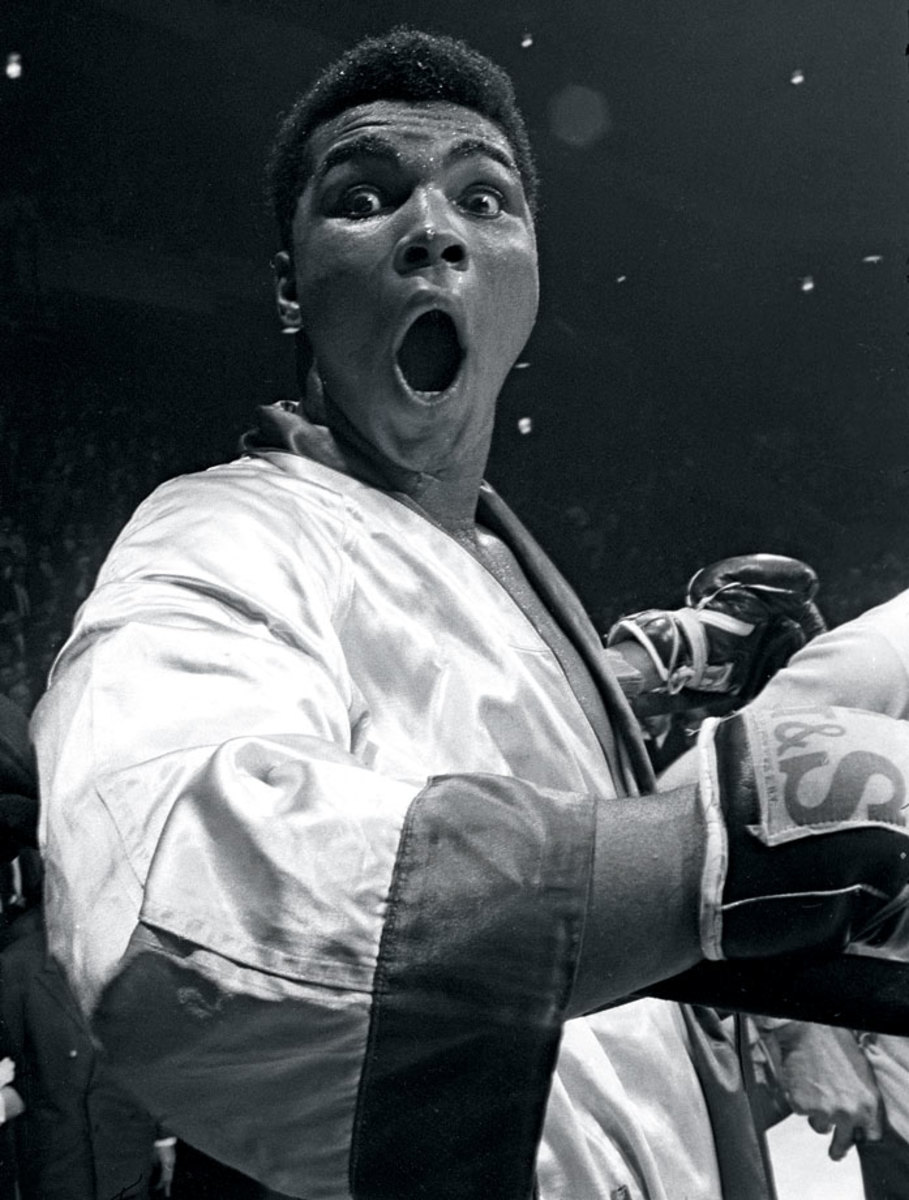
Undefeated in his first 17 pro fights, Clay mugged for the camera before the start of his 1963 bout against Doug Jones in Madison Square Garden.
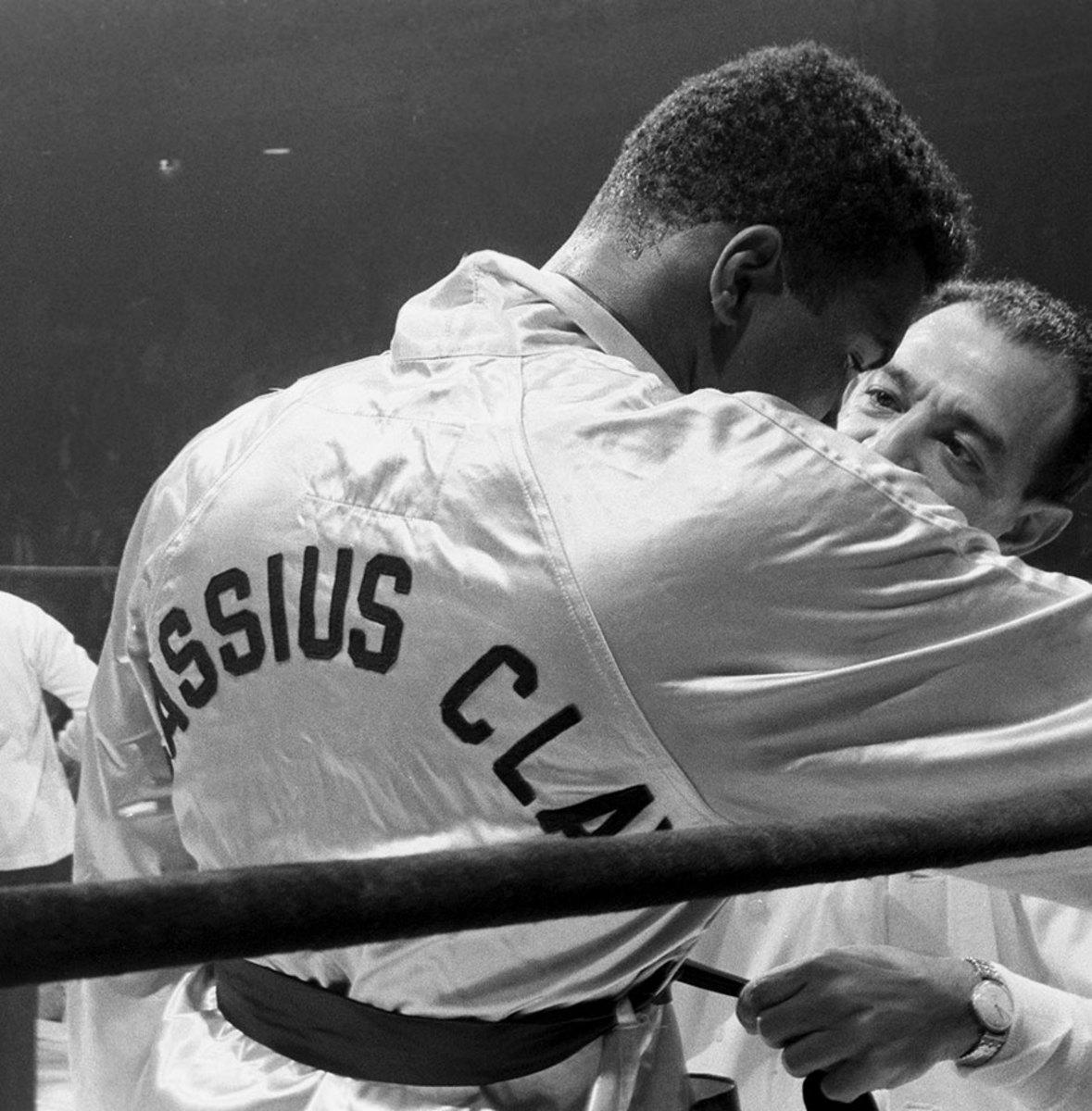
Trainer Angelo Dundee urged his young charge to get serious before the opening bell against Jones. Clay followed instructions and emerged from a tough fight with a unanimous decision victory. Three months later he would stop Henry Cooper and close out 1963 at 19-0.
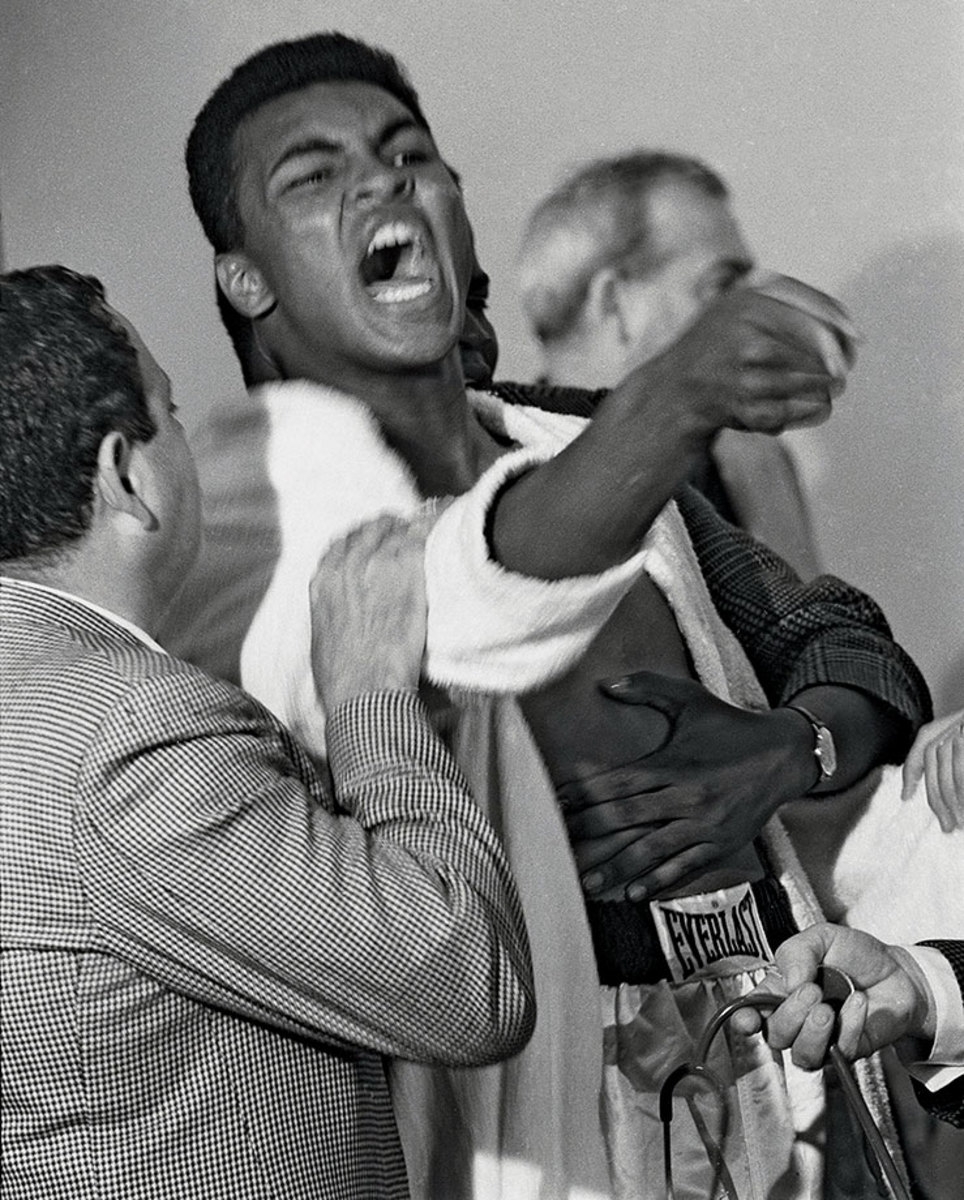
A seemingly hysterical Clay taunted Sonny Liston during the pre-fight physical for their 1964 bout. He had consistently baited the Big Bear during the lead-up to the fight, saying he was going to "use him as a bearskin rug ... after I whup him." The Miami Boxing Commission would fine Clay $2,500 for his outburst at the physical.
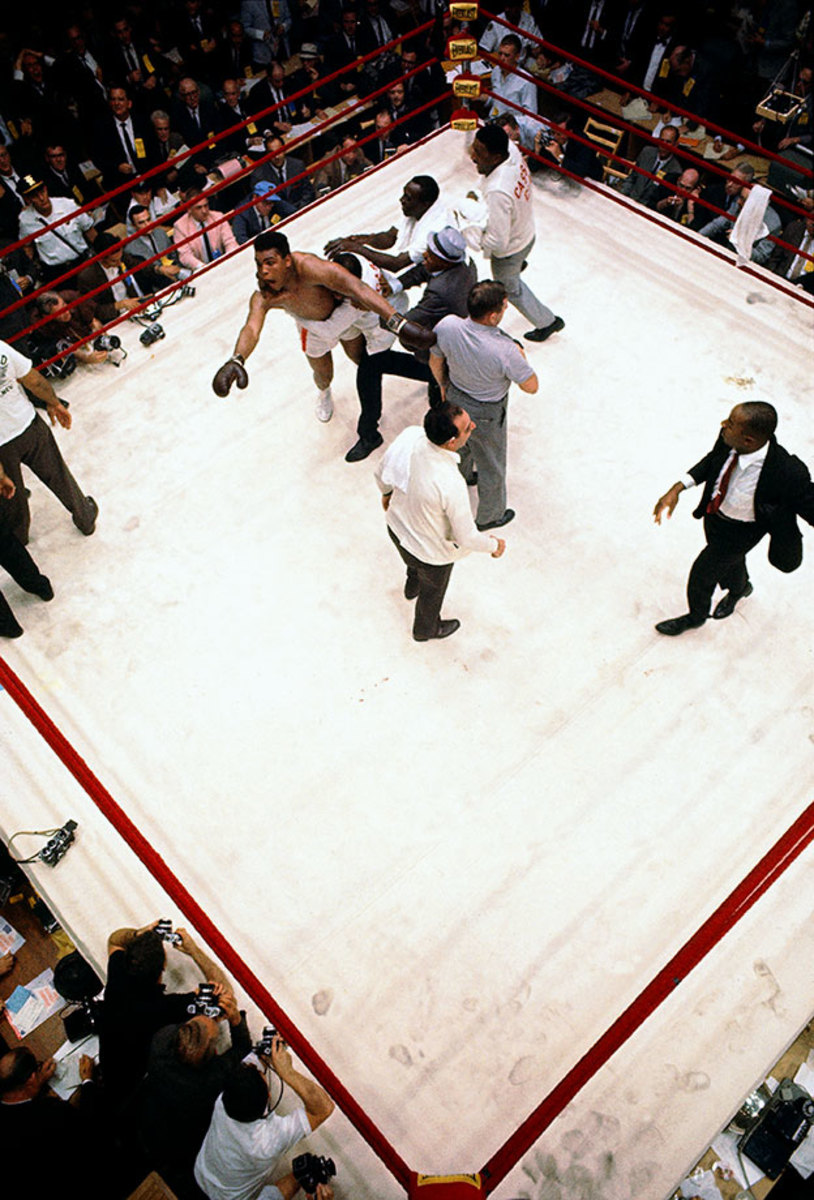
"I shook up the world!" an emotional Clay hollered to ringside reporters after his shocking defeat of Liston. And he did just that, claiming the heavyweight title at age 21 after a clearly beaten Liston, complaining of a shoulder injury, failed to answer the bell for the seventh round.
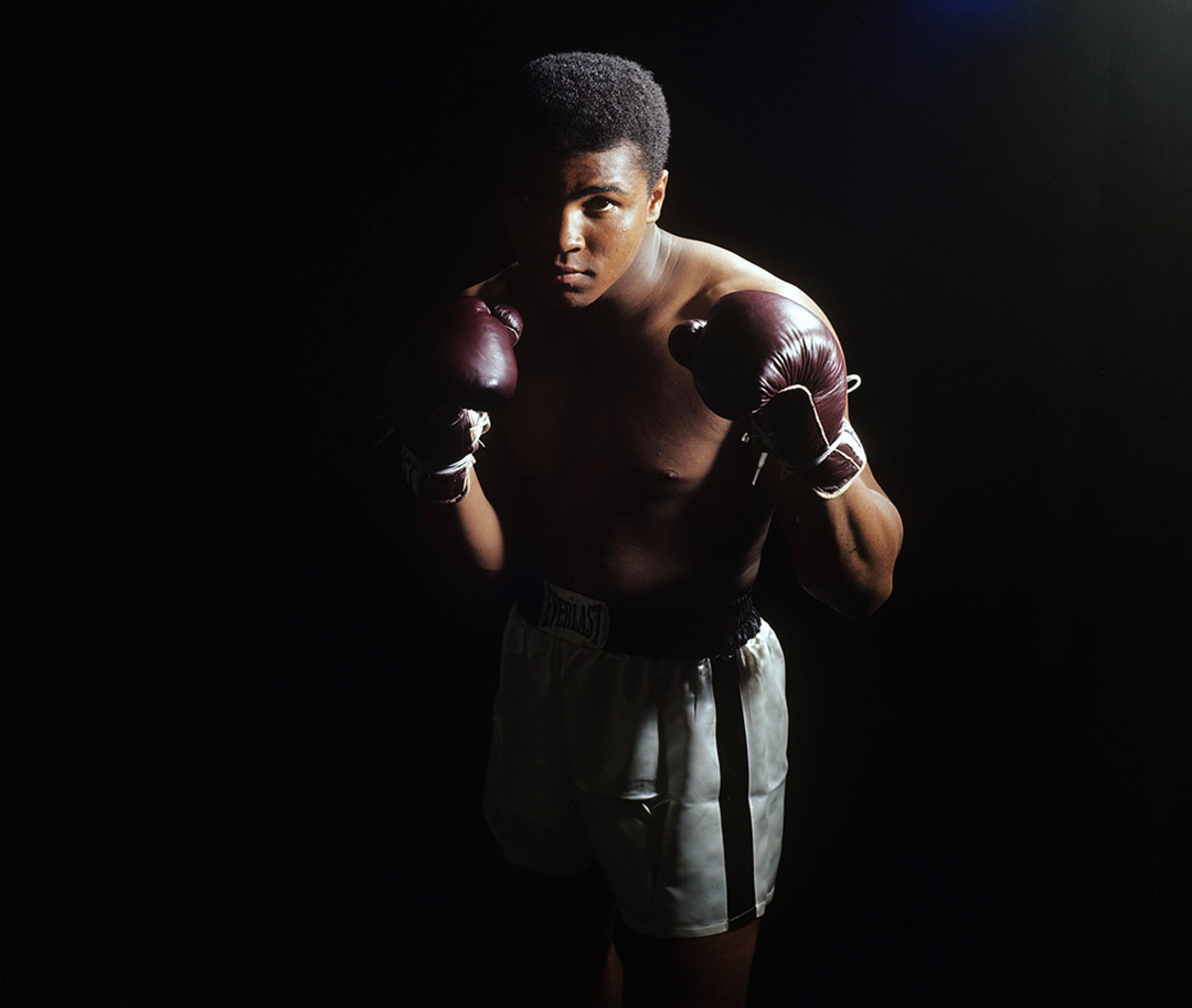
Draped in shadow, the young king — now known as Muhammad Ali — stared down the camera during a photo shoot in April 1965, one month before his rematch against Sonny Liston.
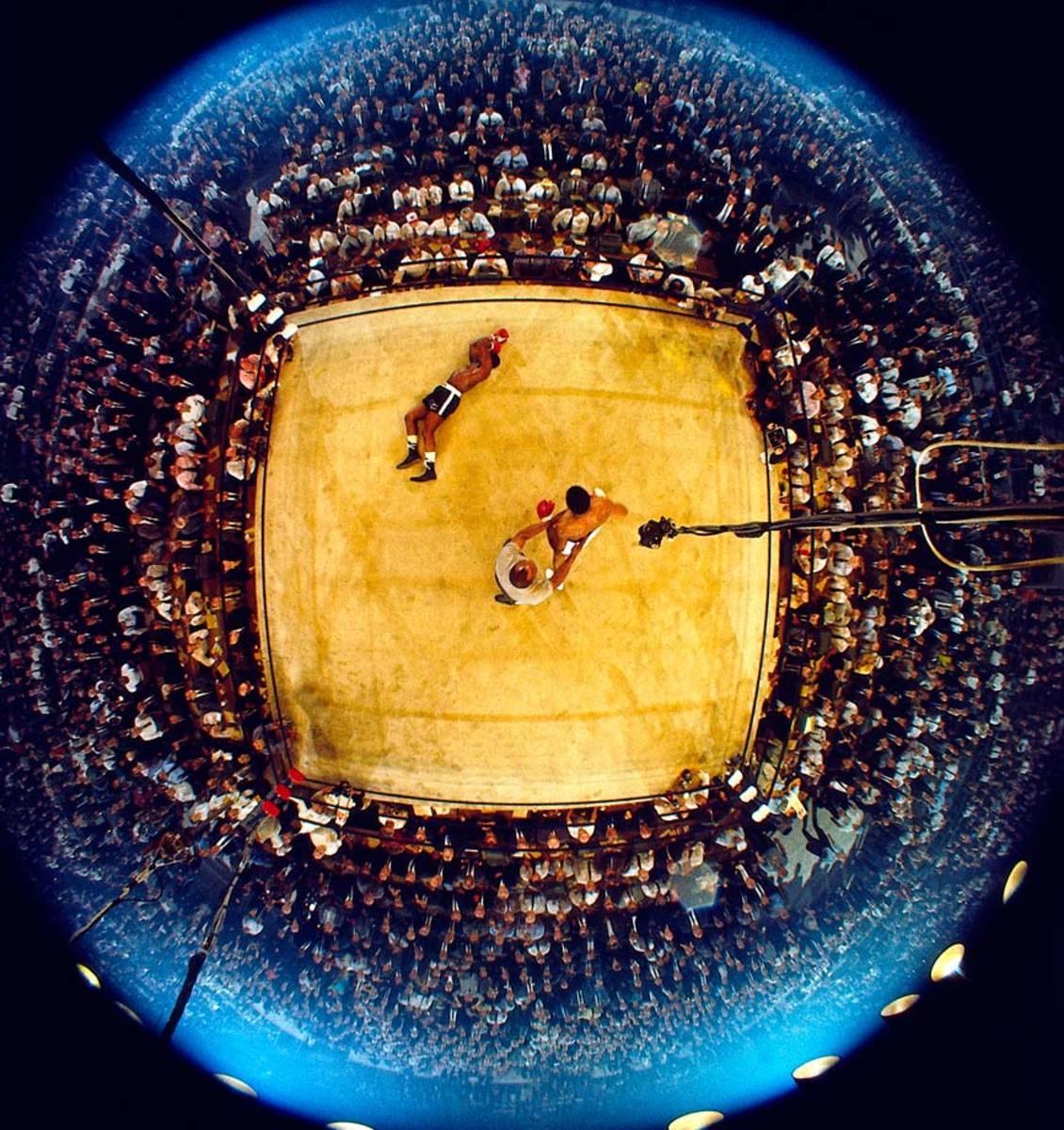
As Liston lingered on the canvas and the referee, former heavyweight champ Jersey Joe Walcott, tried to control Ali, the 2,434 spectators on hand in the Lewiston, Me., hockey arena — a record low for a heavyweight championship fight — tried to make sense of what all that had happened in less than two minutes after the opening bell.
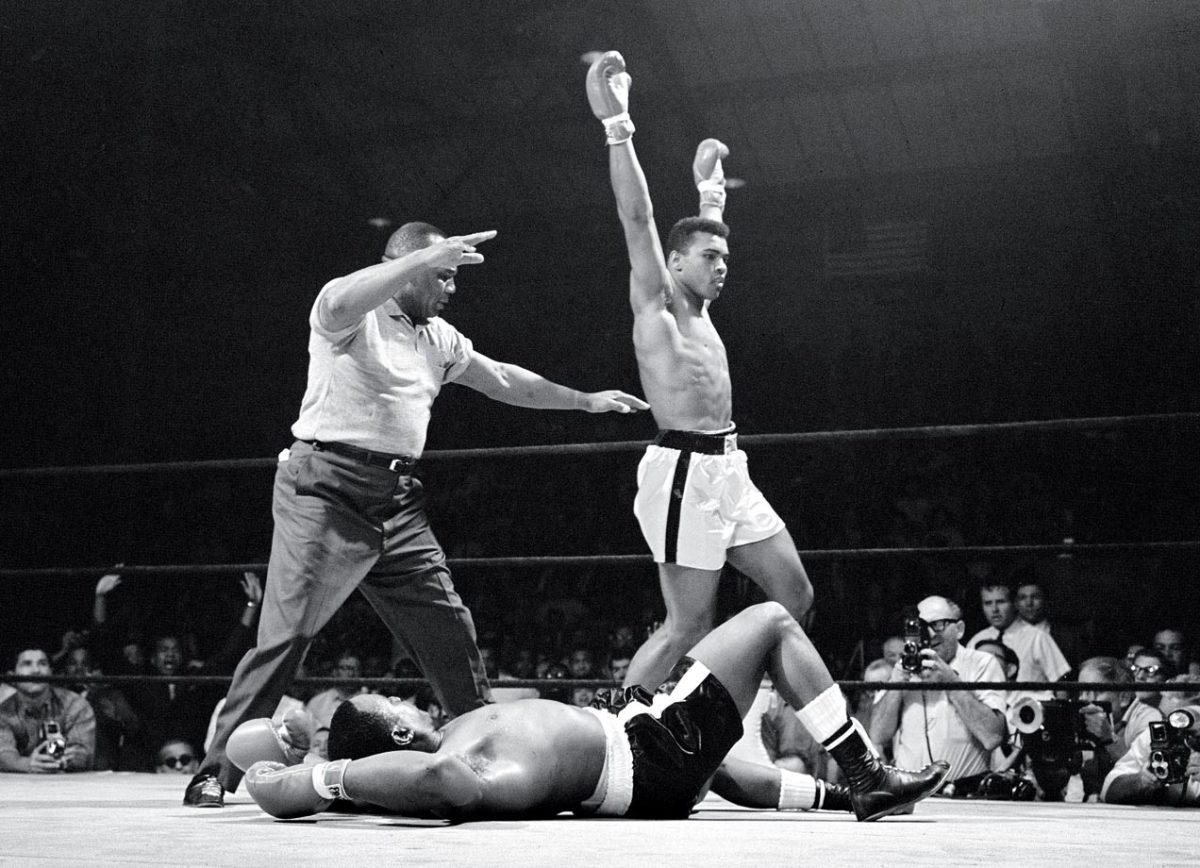
The celebration over Liston continued. In a chaotic ending, Ali was awarded a knockout when Nat Fleischer, publisher of The Ring, informed referee Jersey Joe Walcott from ringside that Liston had been on the canvas for longer than 10 seconds after Ali knocked him down. The bout remains one of the most controversial in boxing history, with many observers insisting that Liston took a dive.
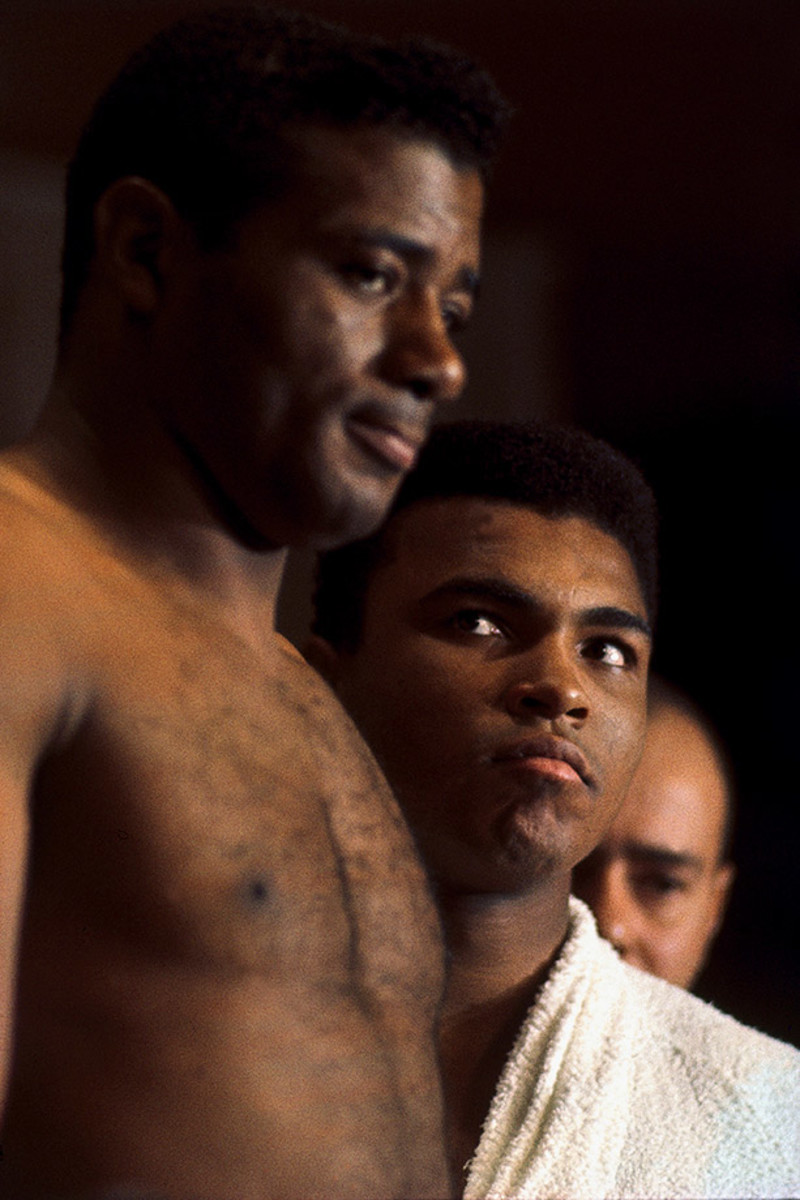
Ali's second title defense came in November 1965, against former two-time heavyweight champion Floyd Patterson. During the build-up to the bout, the normally soft-spoken Patterson earned the new champ's wrath by refusing to call Ali by his Muslim name. At the weigh-in, Ali's glare made it clear that he intended Patterson to pay for the disrespect.
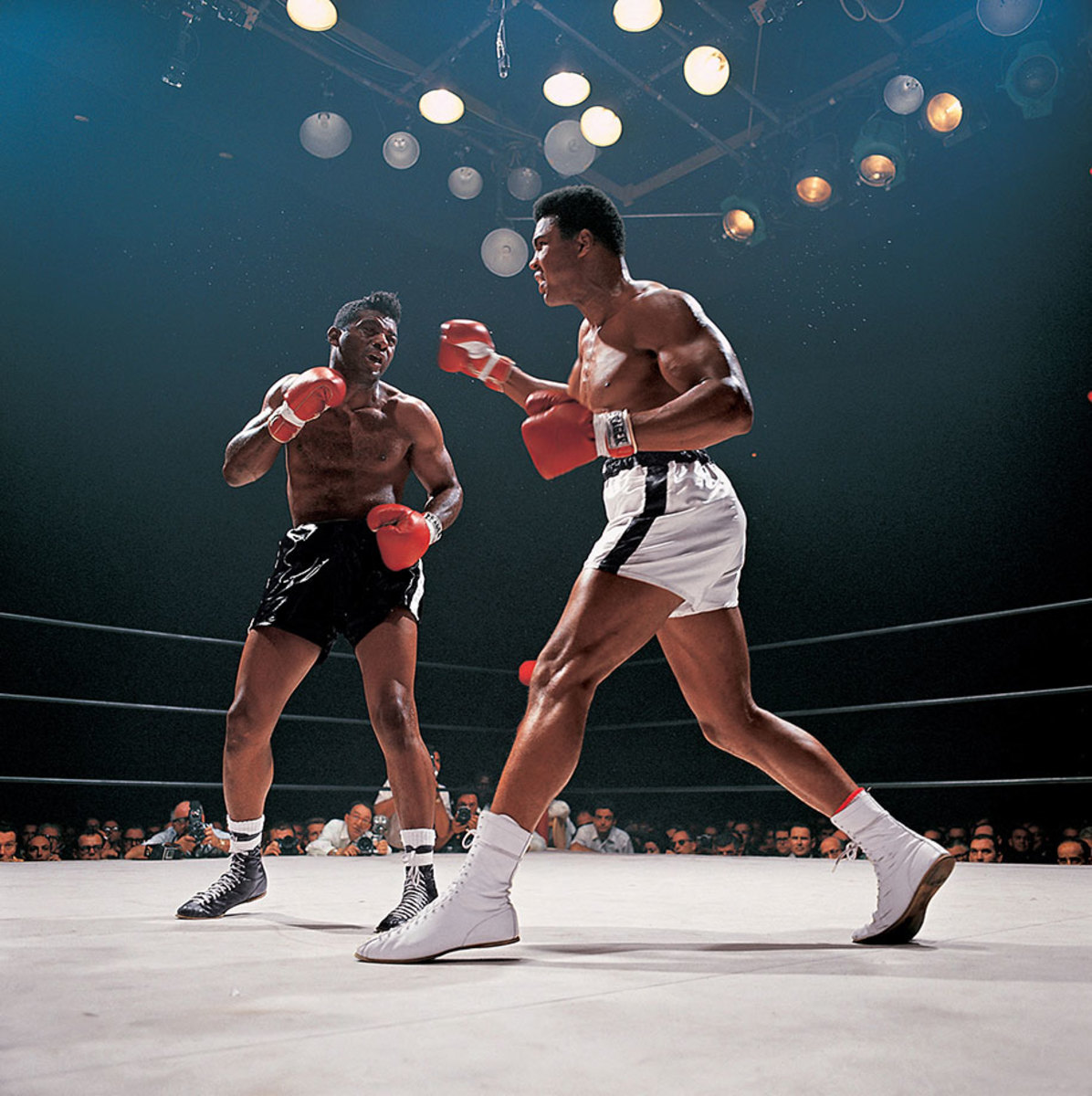
In cruelly efficient performance, Ali punished Patterson — who was hobbled by a painful back injury — seemingly toying with the former champ throughout the bout, hitting him at will and calling, "What's my name?" before finally winning on a 12th-round TKO.
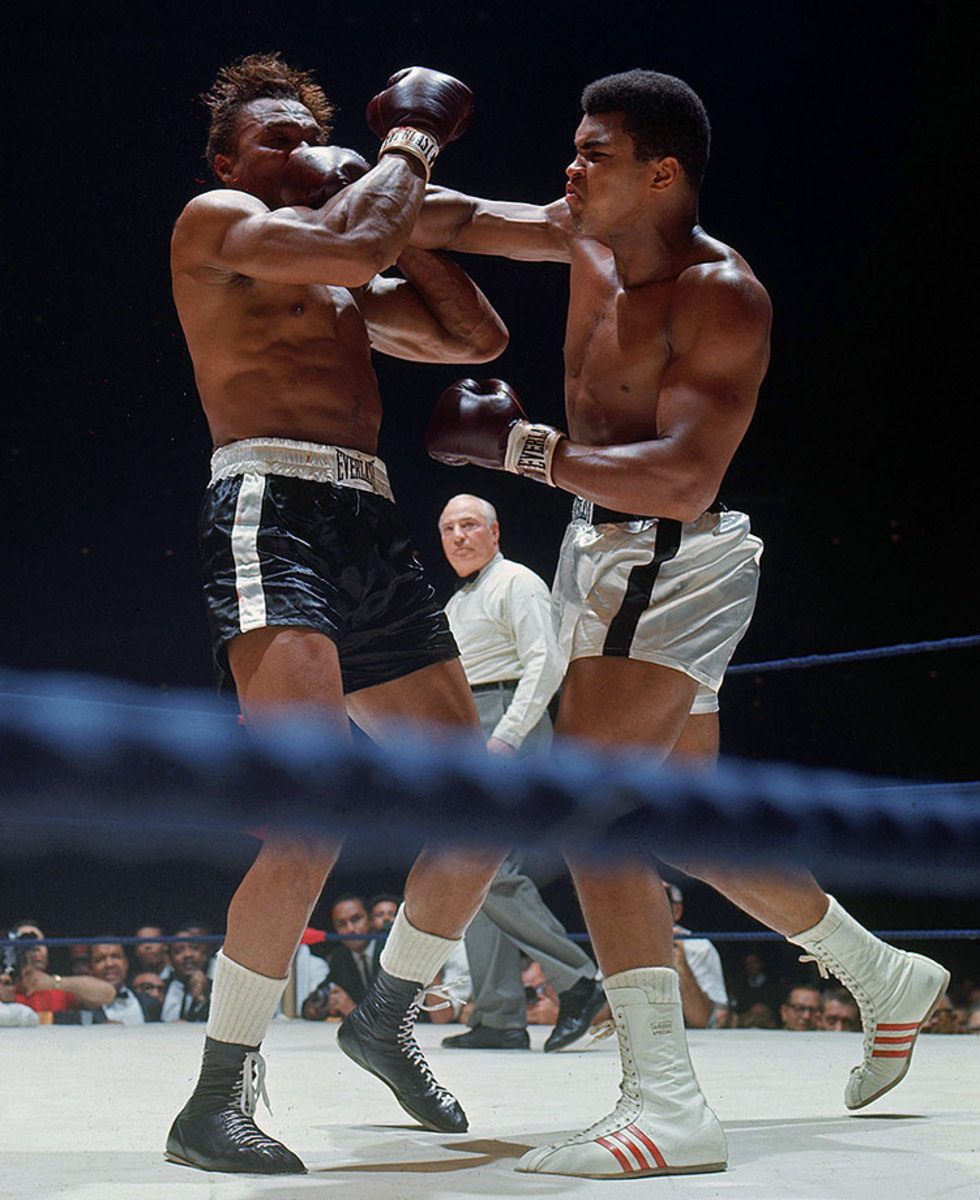
Capping off a five-fight campaign in 1966, Ali faced Cleveland Williams in the Houston Astrodome on Nov. 14. Known as the Big Cat, the heavily-muscled Williams was a power puncher who had racked up 51 knockouts in 71 fights. But he was also 33, barely recovered from a gunshot wound sustained the year before, and up against a young champion very much in his prime. Ali wasted little time in unleashing a withering attack.
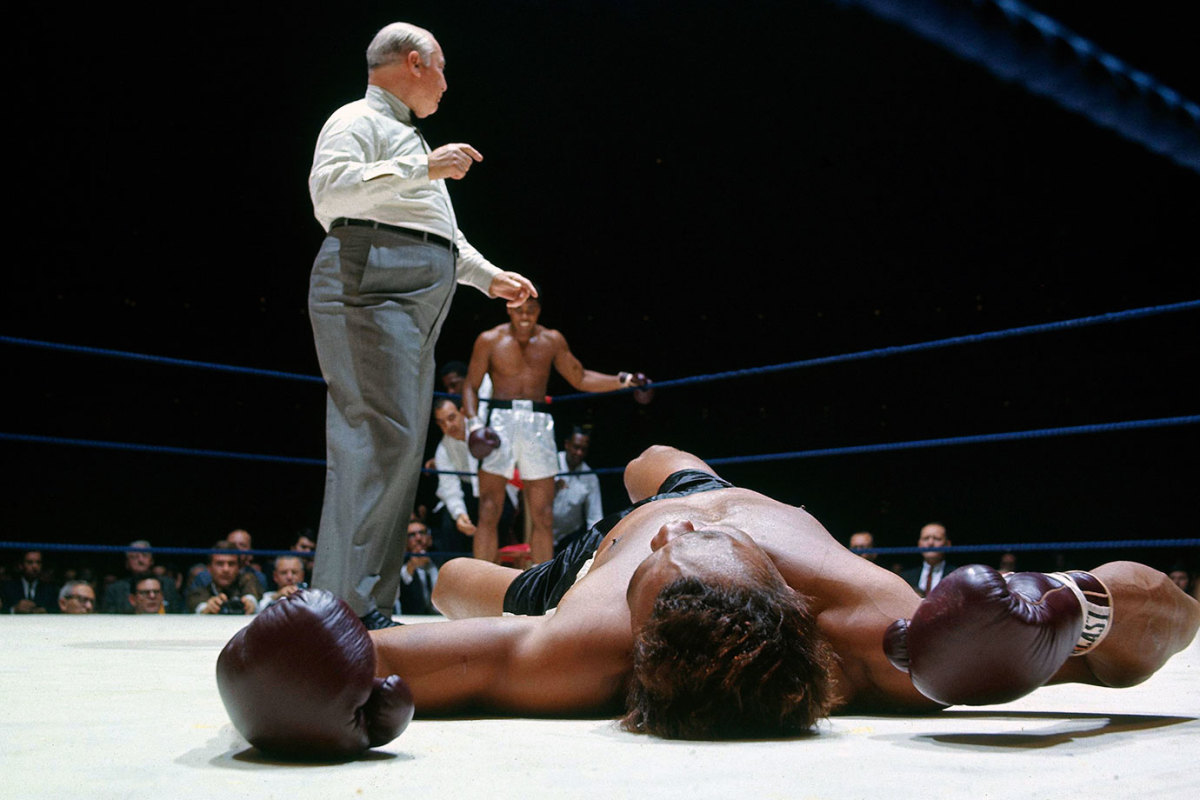
Float and sting: In a display of speed and combination punching unmatched in heavyweight history, Ali overwhelmed Williams from the start. The challenger, here down for the third time in round 2, would be saved by the bell before referee Harry Kessler could count him out, but it would only postpone the inevitable.
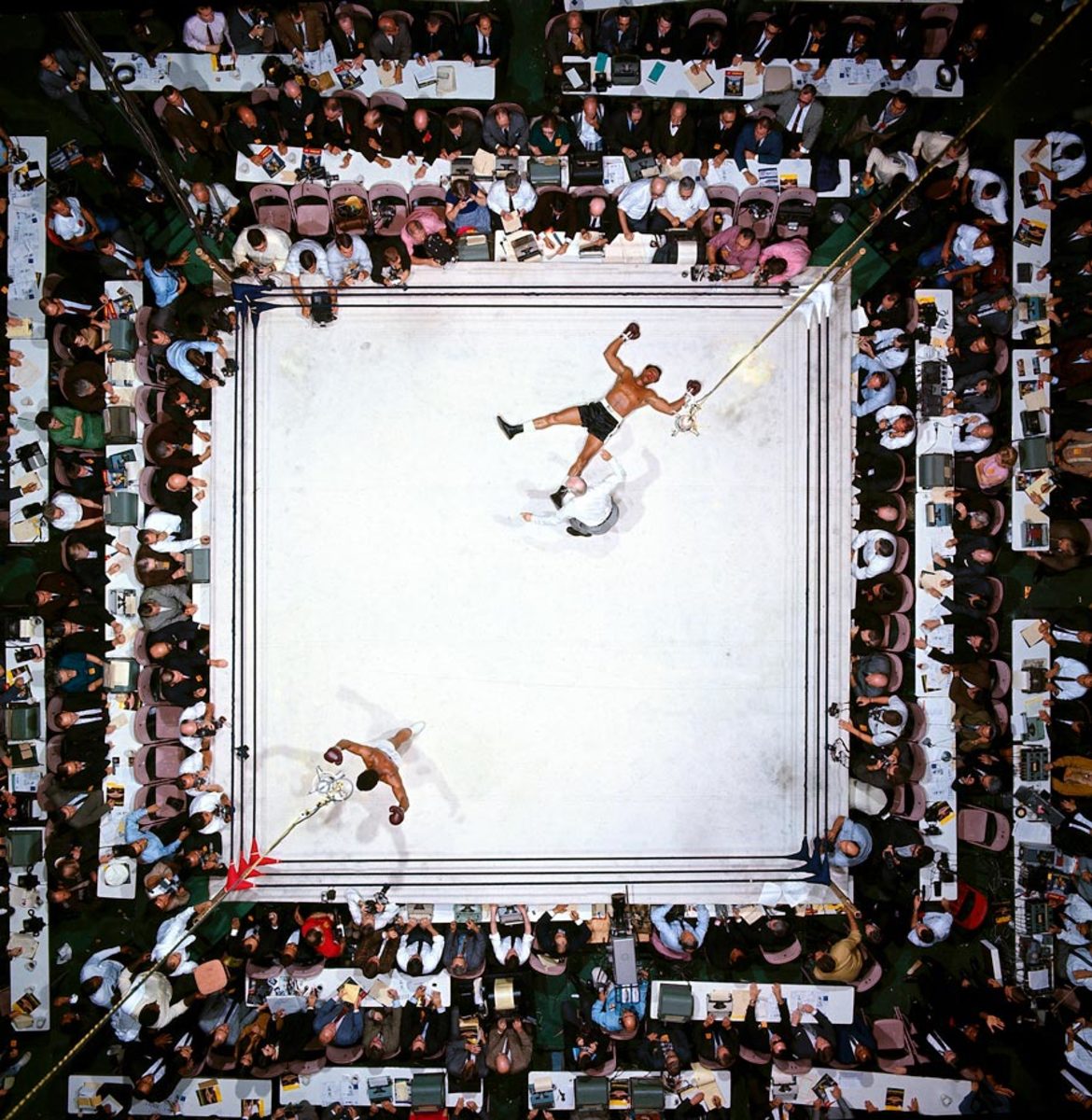
Ali dropped Williams again early in the third round, and Kessler waved the mismatch over at 1:08 of the third.
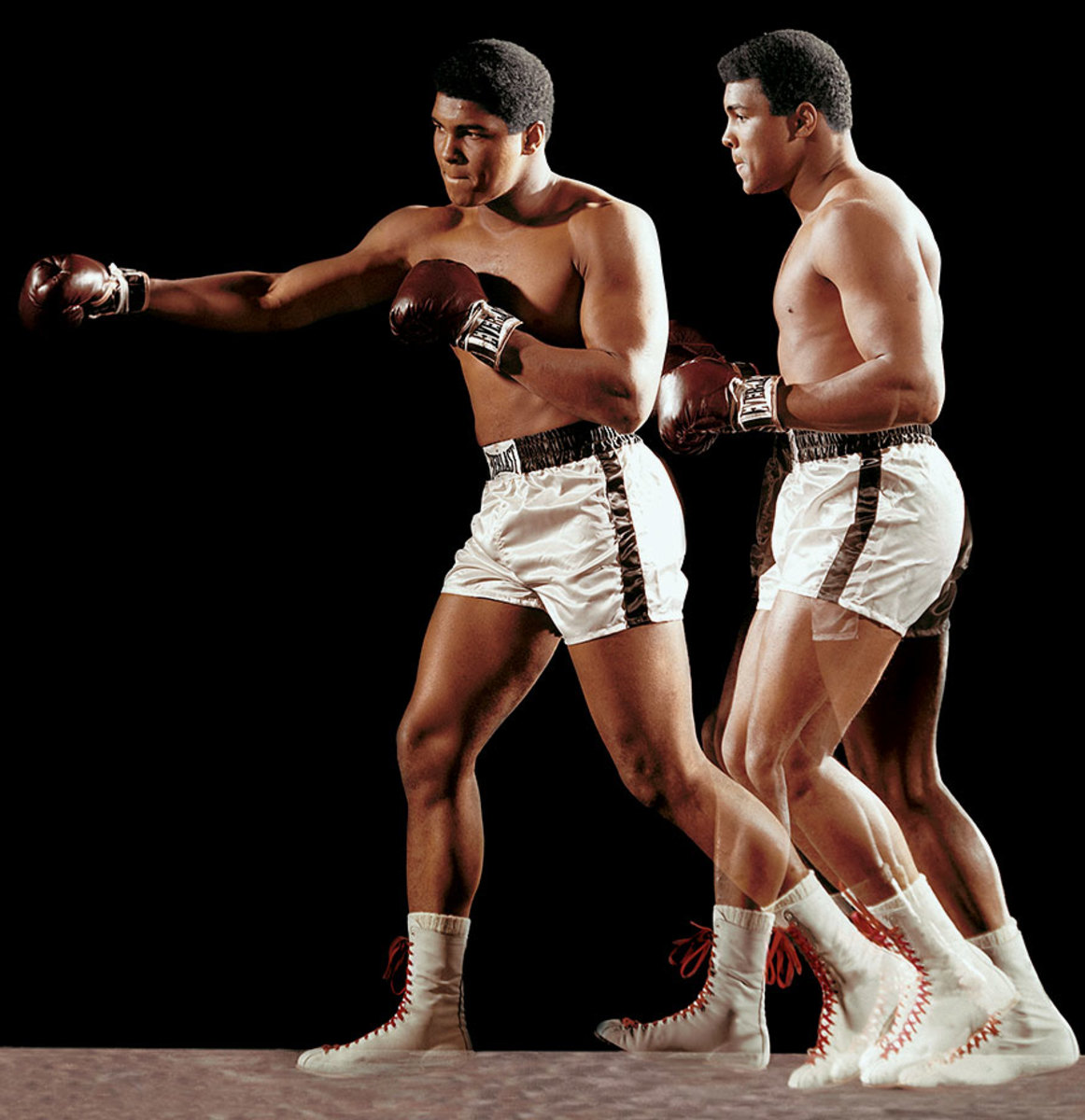
In a multiple-exposure portrait, Ali demonstrates his signature double-clutch shuffle during a photo shoot in December 1966.
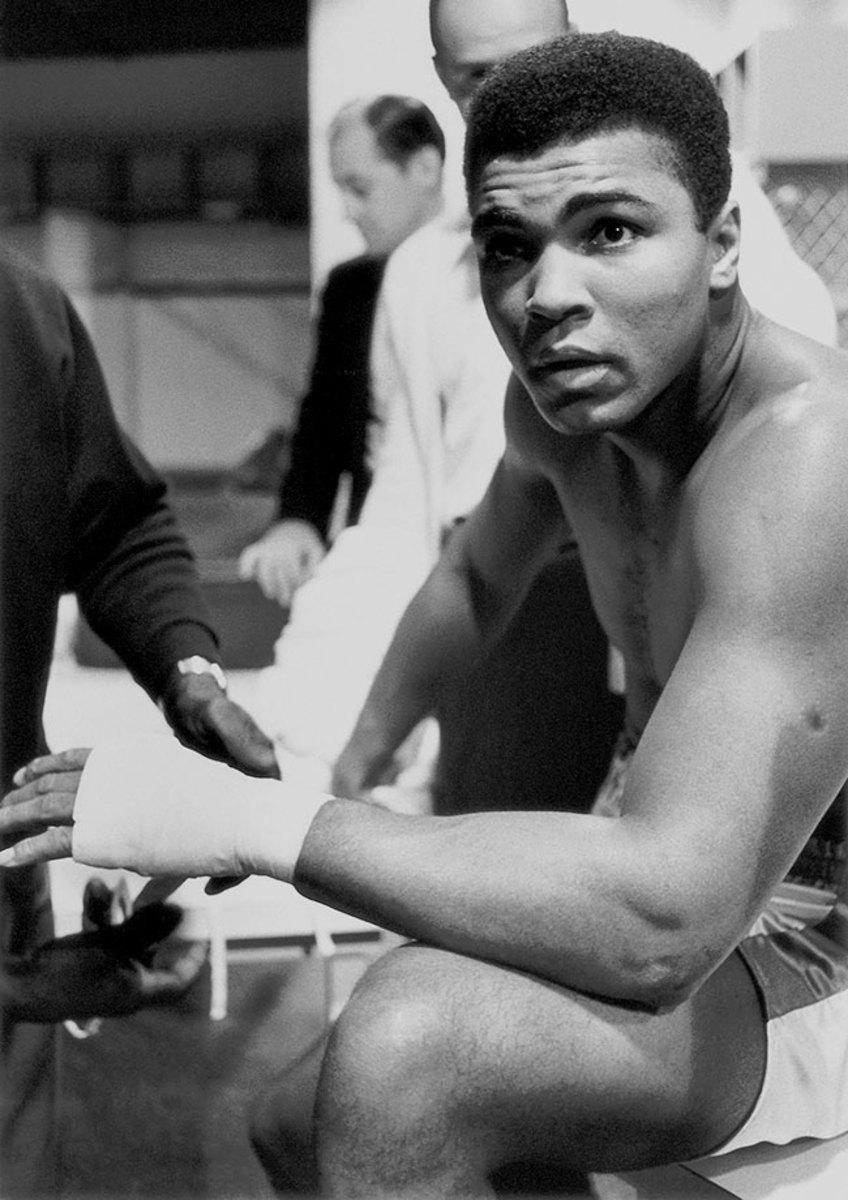
Ali sits in the locker room before his February 1967 fight against Ernie Terrell. Like Patterson before him, Terrell refused to call the champion by his Muslim name. Also like Patterson, he paid a stiff price, as Ali punished Terrell for 15 ugly rounds before winning by unanimous decision.
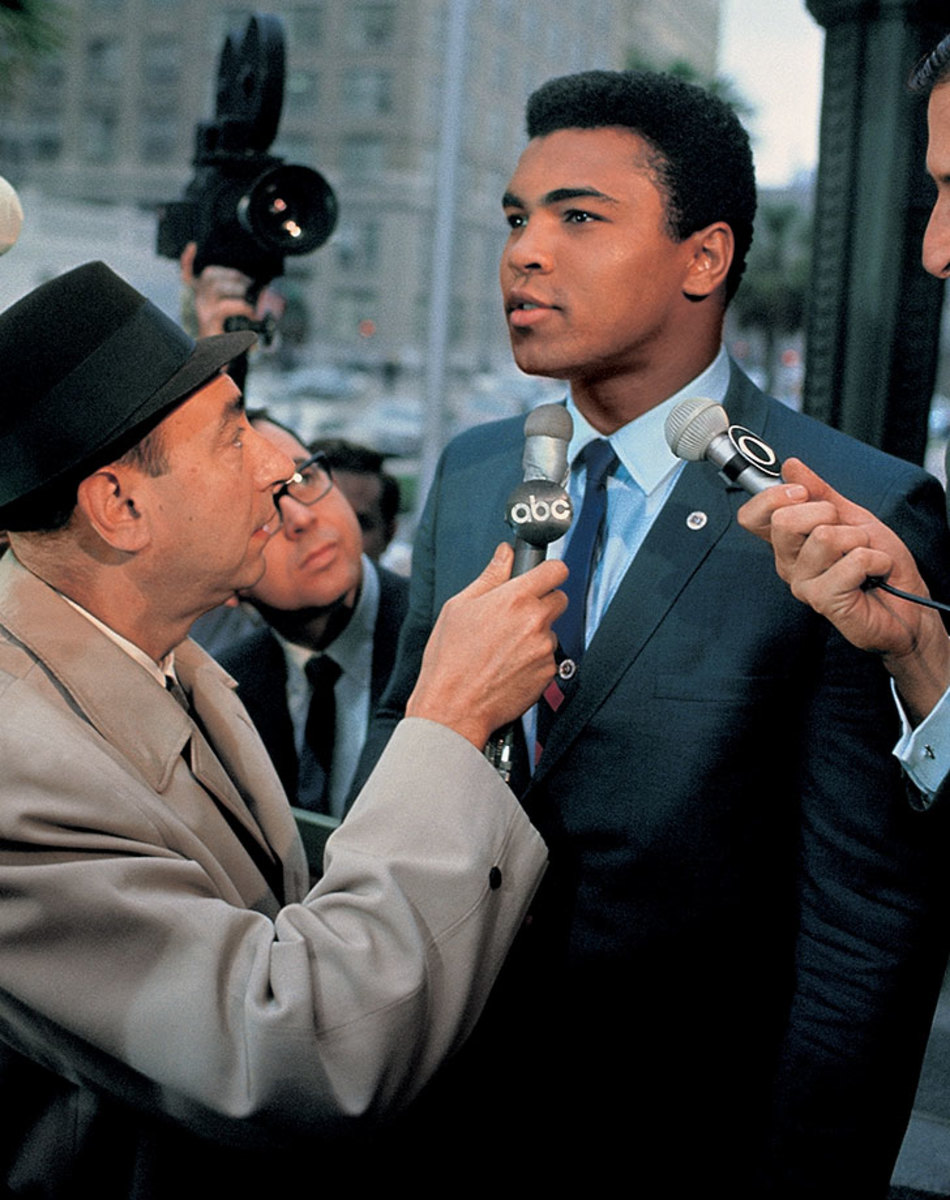
Outside the Armed Forces Examining and Entrance Station in Houston in April 1967, Ali spoke to the press about his refusal to be inducted into military service. Among those on hand was ABC's Howard Cosell, who would be a staunch supporter of the fighter's stance. The decision cost Ali his boxing license and his heavyweight title, and he was sentenced to five years in prison but remained free pending an appeal.
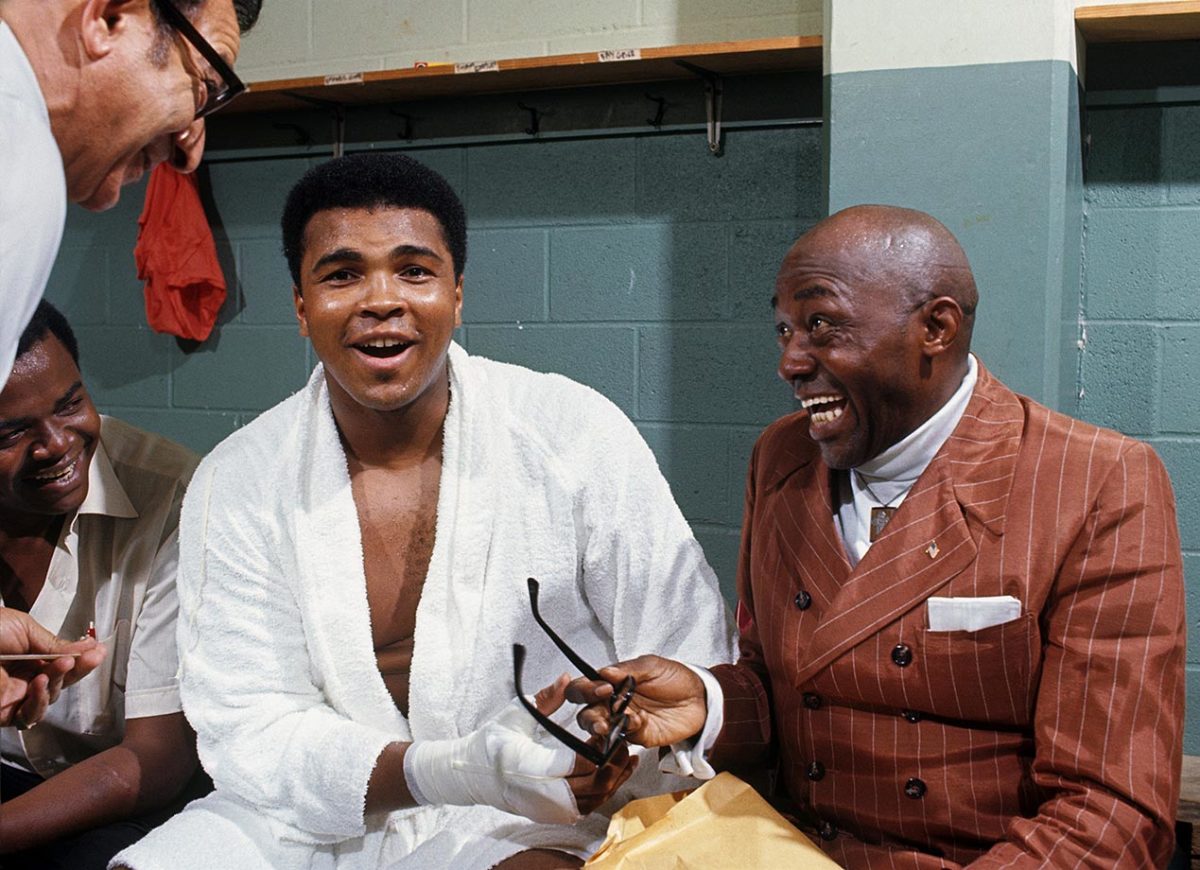
In professional exile for three and a half years because of his draft case, Ali sought to return to boxing in 1970. He began with a night of exhibition bouts at Morehouse College in Atlanta, where before going into the ring, he shared a locker room laugh with actor and comedian Lincoln Perry (right), better known by his stage name of Stepin Fetchit. The friendship between the two black icons would later be examined in an acclaimed play by Will Power, Fetch Clay, Make Man.
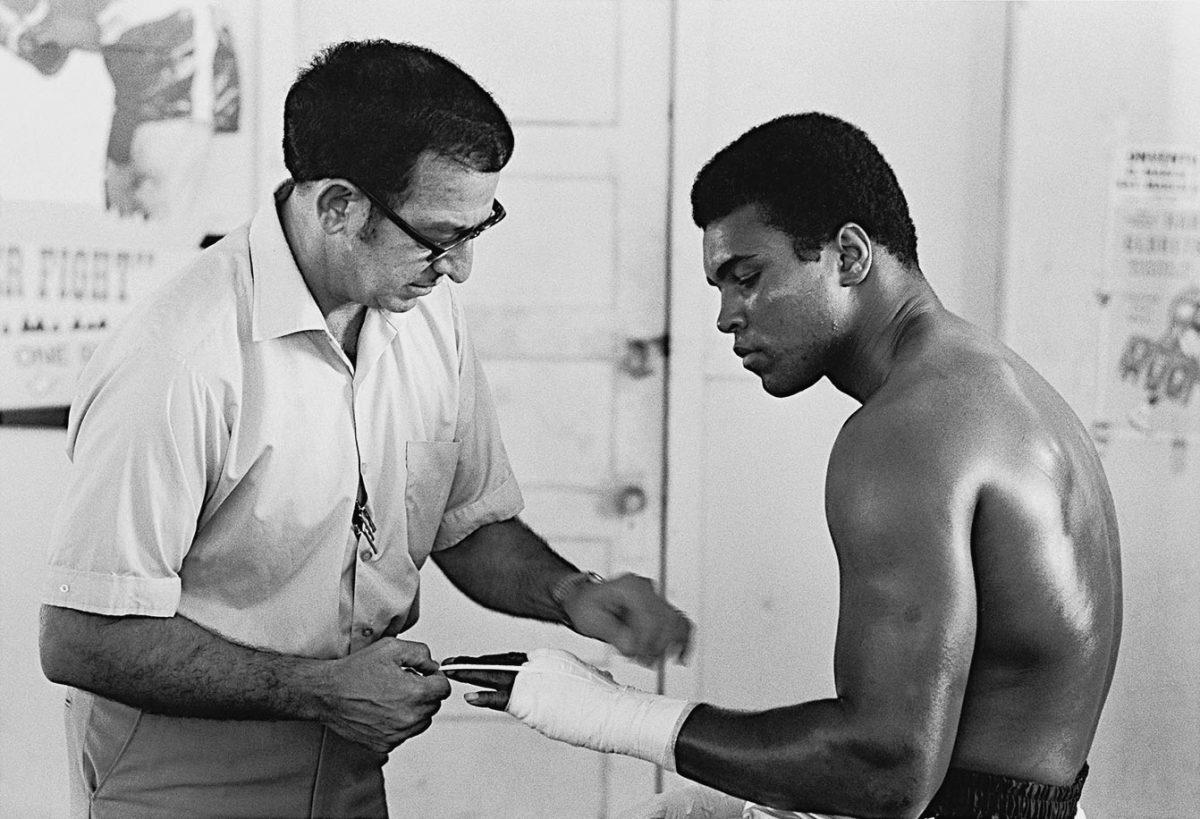
After the Atlanta Athletic Commission at last granted Ali a license, the deposed champion went back into serious training. He was, as ever, in the capable hands of trainer Angelo Dundee, here wrapping boxing's most famous fists at the 5th Street Gym in Miami in October 1970.
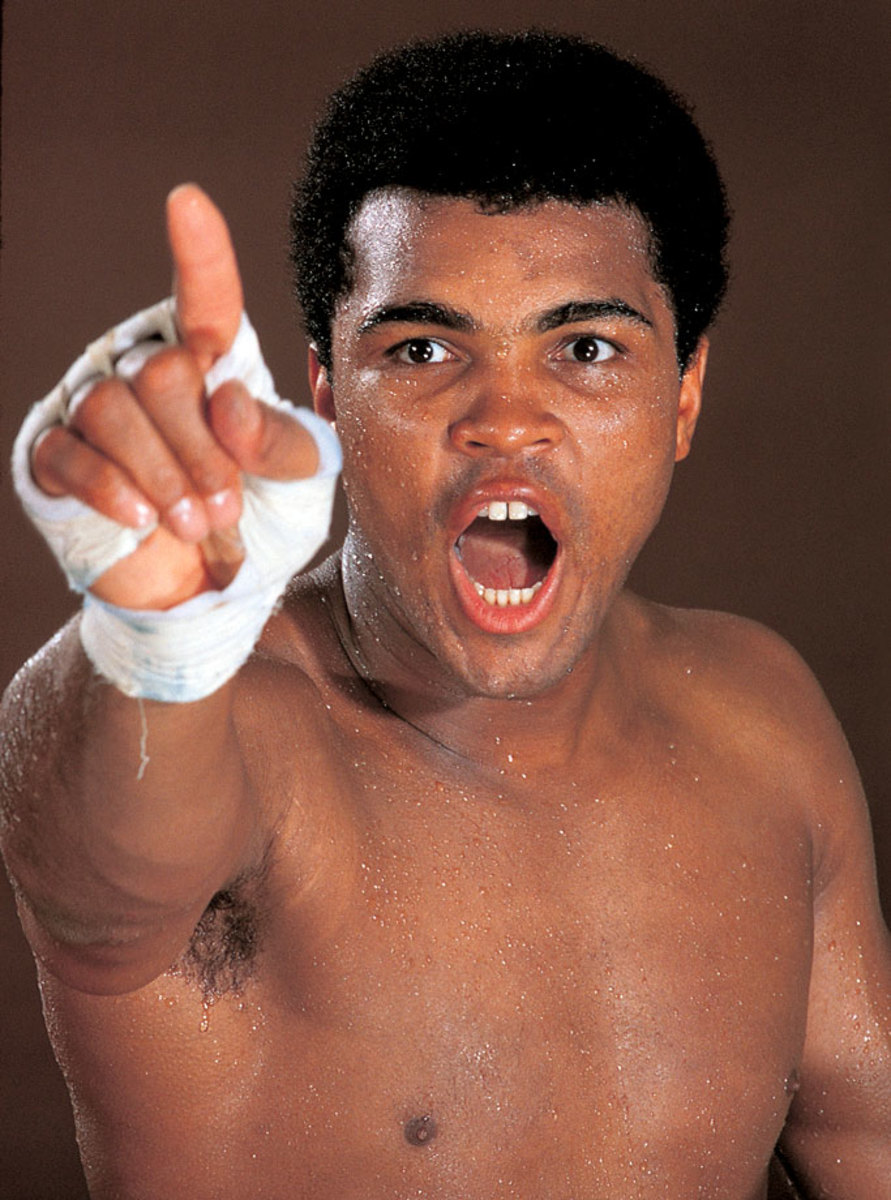
With his return to the ring scheduled for Oct. 26, 1970 in Atlanta, against dangerous contender Jerry Quarry, Ali made it clear to all who would listen that he was on a mission to reclaim the title that had been stripped of him.
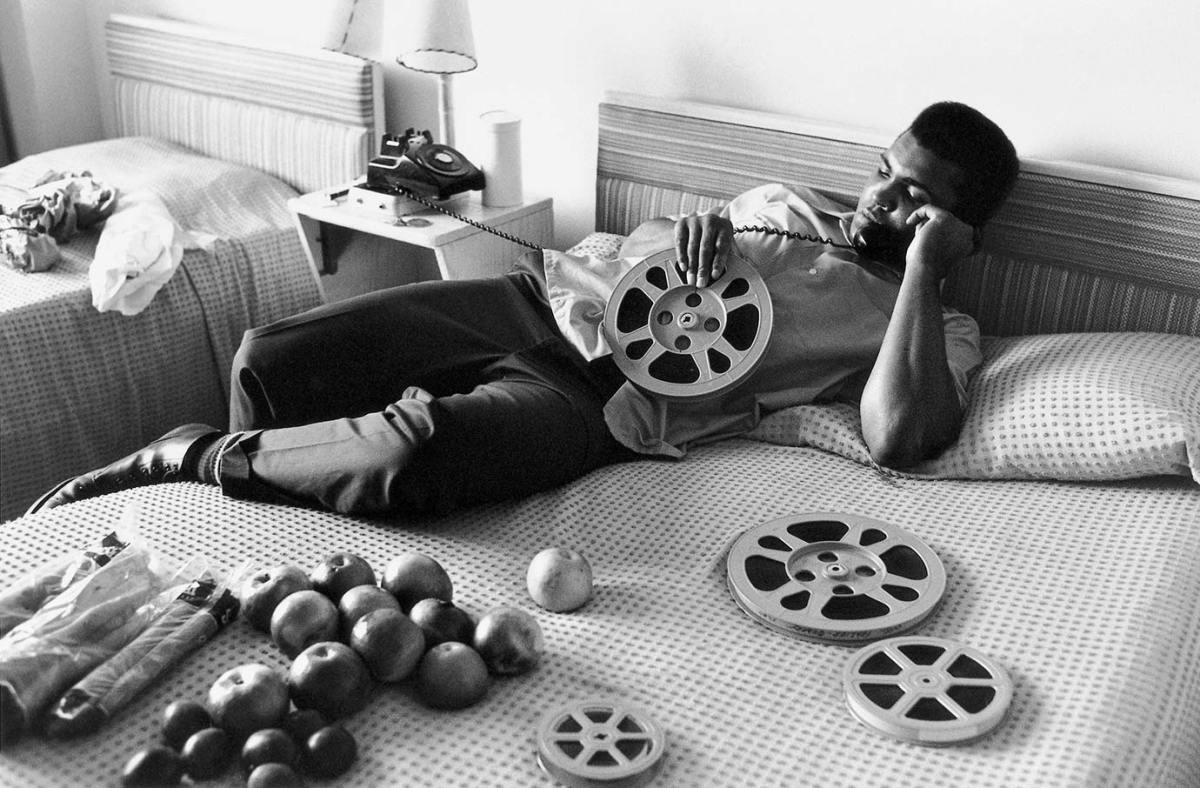
Reel to spiel: For the ever-loquacious Ali, even a rare moment of down time — like this afternoon in 1970 in a Miami hotel room — was a chance to do some talking.
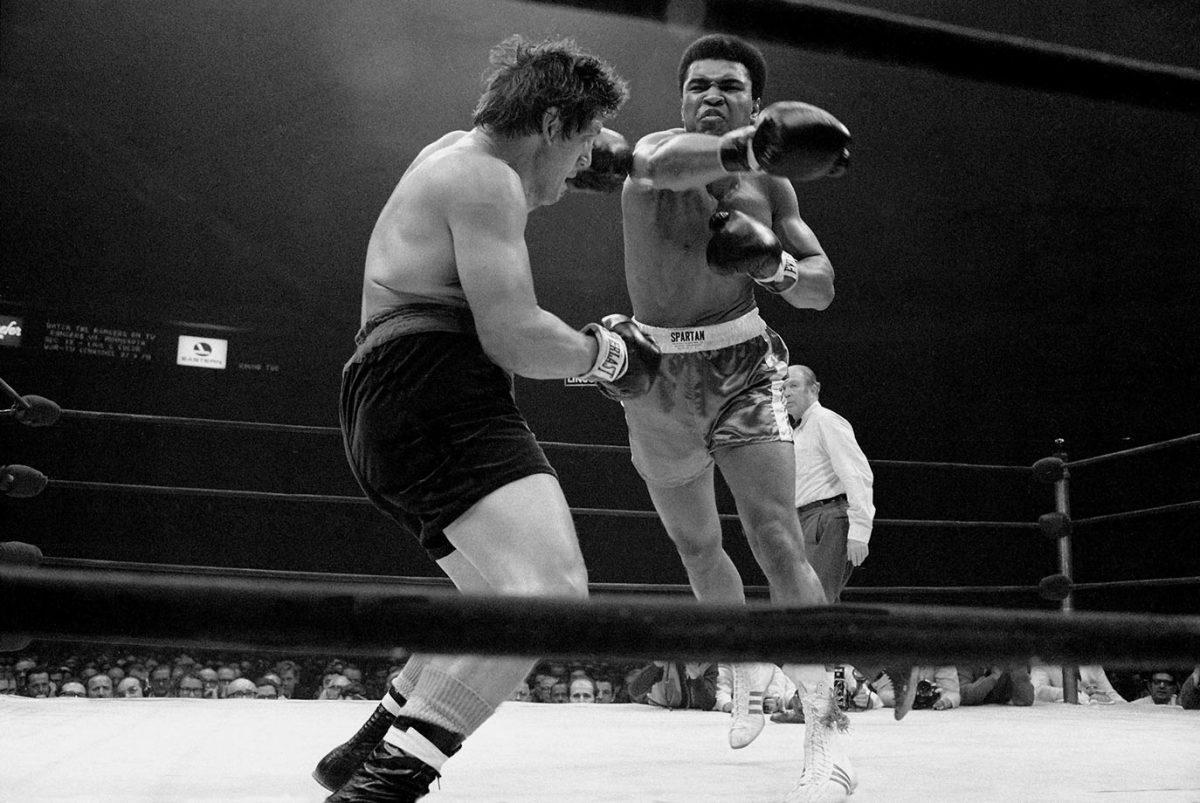
Despite Ali's long layoff, his comeback campaign would include no easy tune-up bouts. He stopped Quarry in three rounds on Oct. 26, 1970, then, just six weeks later — an unthinkably short interlude by today's standards — took on Argentine contender Oscar Bonavena in Madison Square Garden. Here, Ali fires a right at the rugged and awkward Bonavena, who took the fight to the former champion all night.
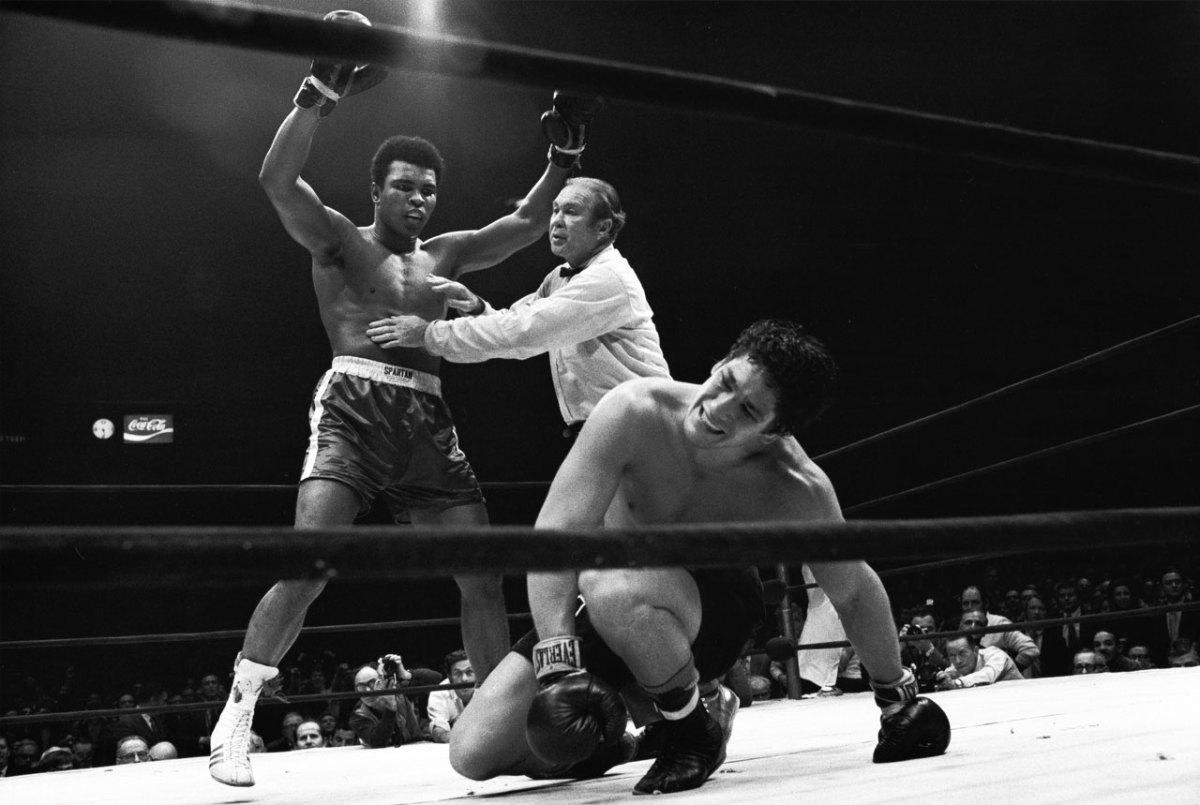
After a long, often sloppy bout, Ali — here being held back by referee Mark Conn — produced one of the most dramatic finishes of his career, dropping Bonavena three times in the 15th and final round to automatically end the fight. The win cleared the way for a showdown with Joe Frazier, the man who had taken the heavyweight title in Ali's absence.
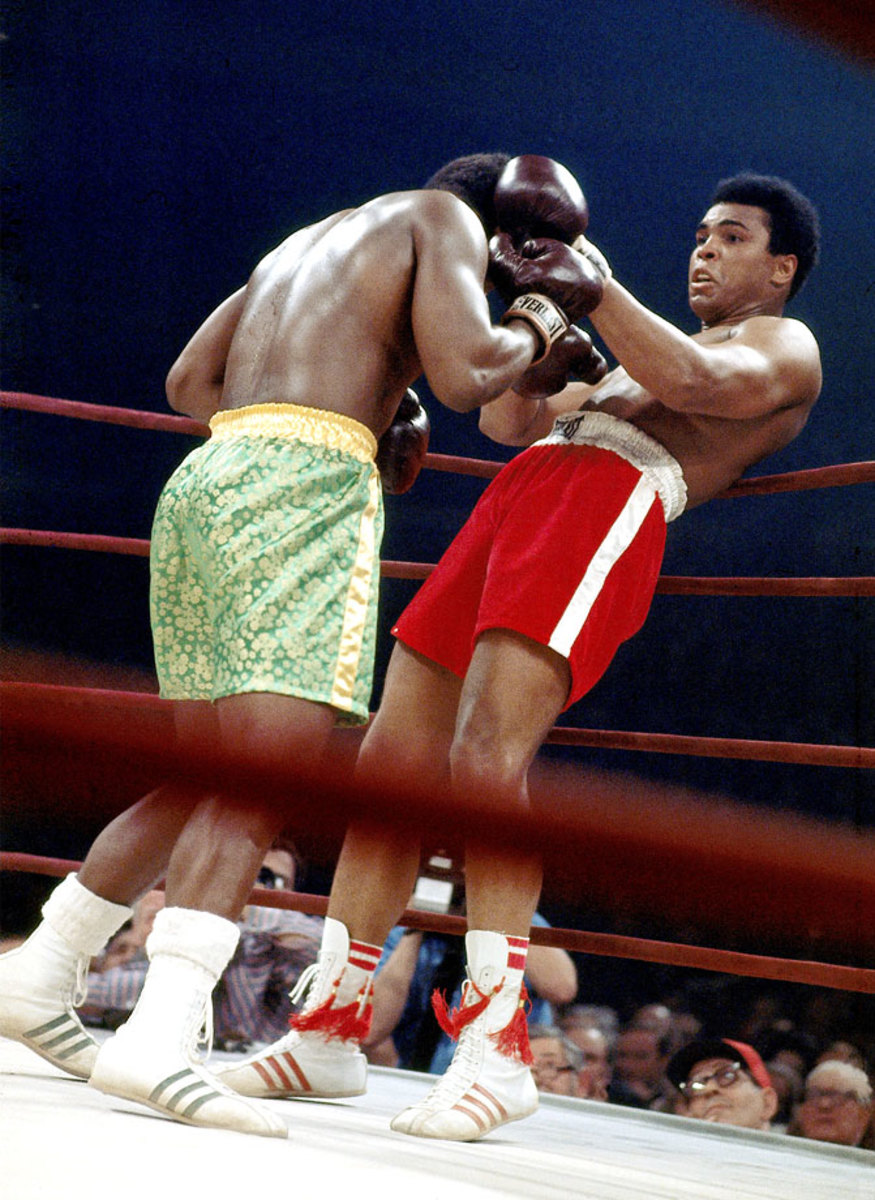
On the night of March 8, 1971, the eyes of the world were on a square patch of white canvas in the center of Madison Square Garden. There, Ali and Joe Frazier met in what was billed at the time simply as The Fight, but has come to be known, justifiably, as the Fight of the Century. For 15 rounds the two undefeated heavyweights battled at a furious pace, with each man sustaining tremendous punishment. In the end Frazier prevailed, dropping Ali in the final round with a tremendous left hook to seal a unanimous decision and hand The Greatest his first loss in 32 professional fights.
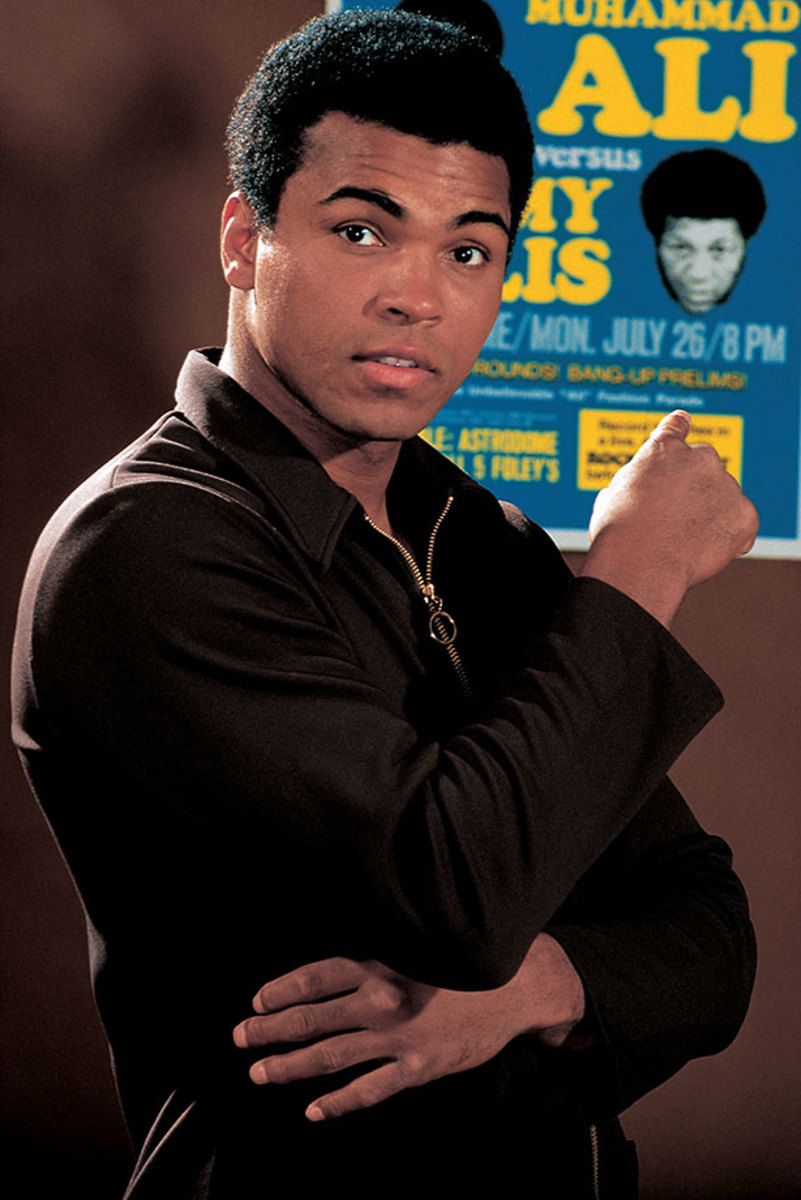
Ali poses with the fight poster for his upcoming fight against Jimmy Ellis during a photo shoot in July 1971. Ellis was an old friend of Ali's — both were trained by Angelo Dundee — and knew his fighting style well from many rounds of sparring.
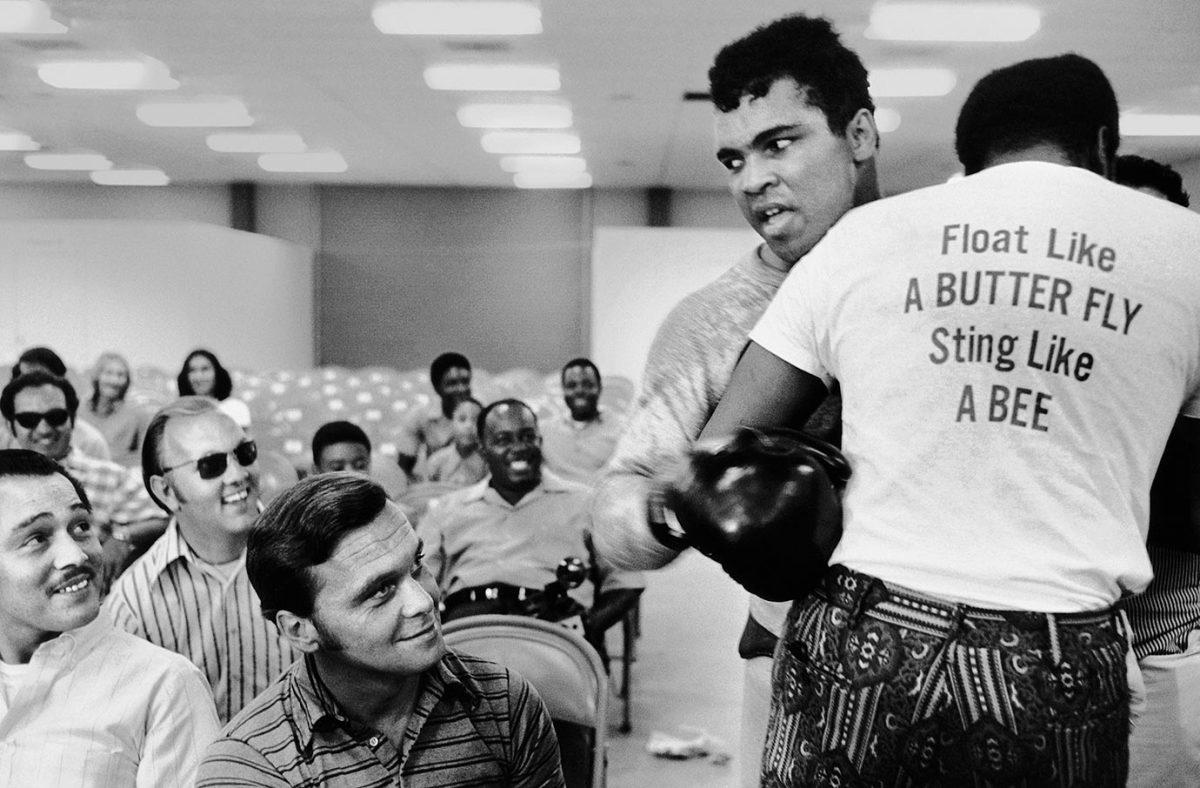
For those sportswriters lucky enough to cover Ali on a regular basis, each day brought surprises and, more often than not, plenty of laughs. of Trainer Drew Bundini Brown helps Ali train for his fight against Ellis. Ali won the bout by technical knockout in the 12th round to claim the vacant NABF heavyweight title.
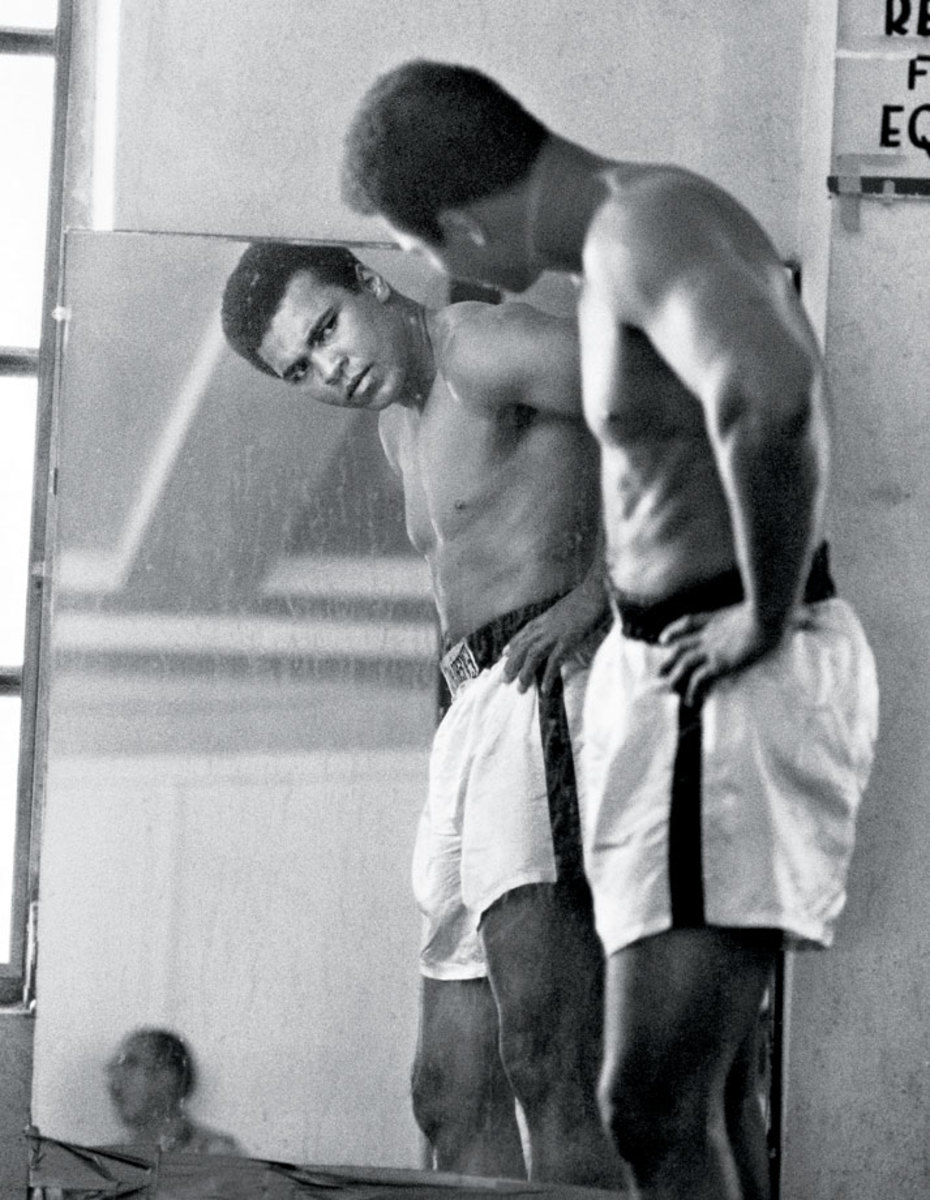
The man in the mirror stares back as Ali examines himself while training for a fight in 1972. He won all six of his fights that year.

The Louisville Lip stands next to George Foreman before Ali's fight versus Jerry Quarry in June 1972. Ali won by technical knockout in the seventh round. Foreman at the time was 36-0. Ali would not get his shot against Foreman for more than two years.
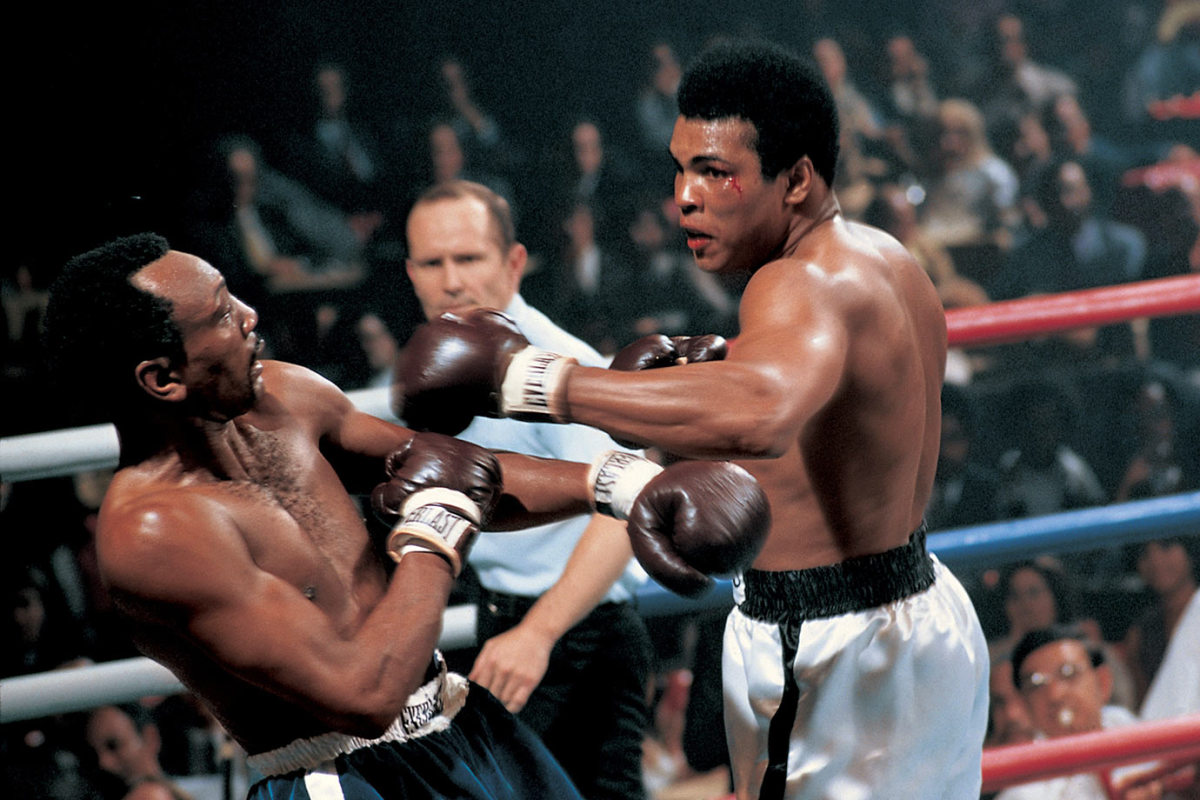
Ali throws a left hook at Bob Foster in their 1972 fight at Stateline, Nev. Although Ali knocked Foster out, Foster did leave his mark: a cut above Ali's left eye, his first as a professional.
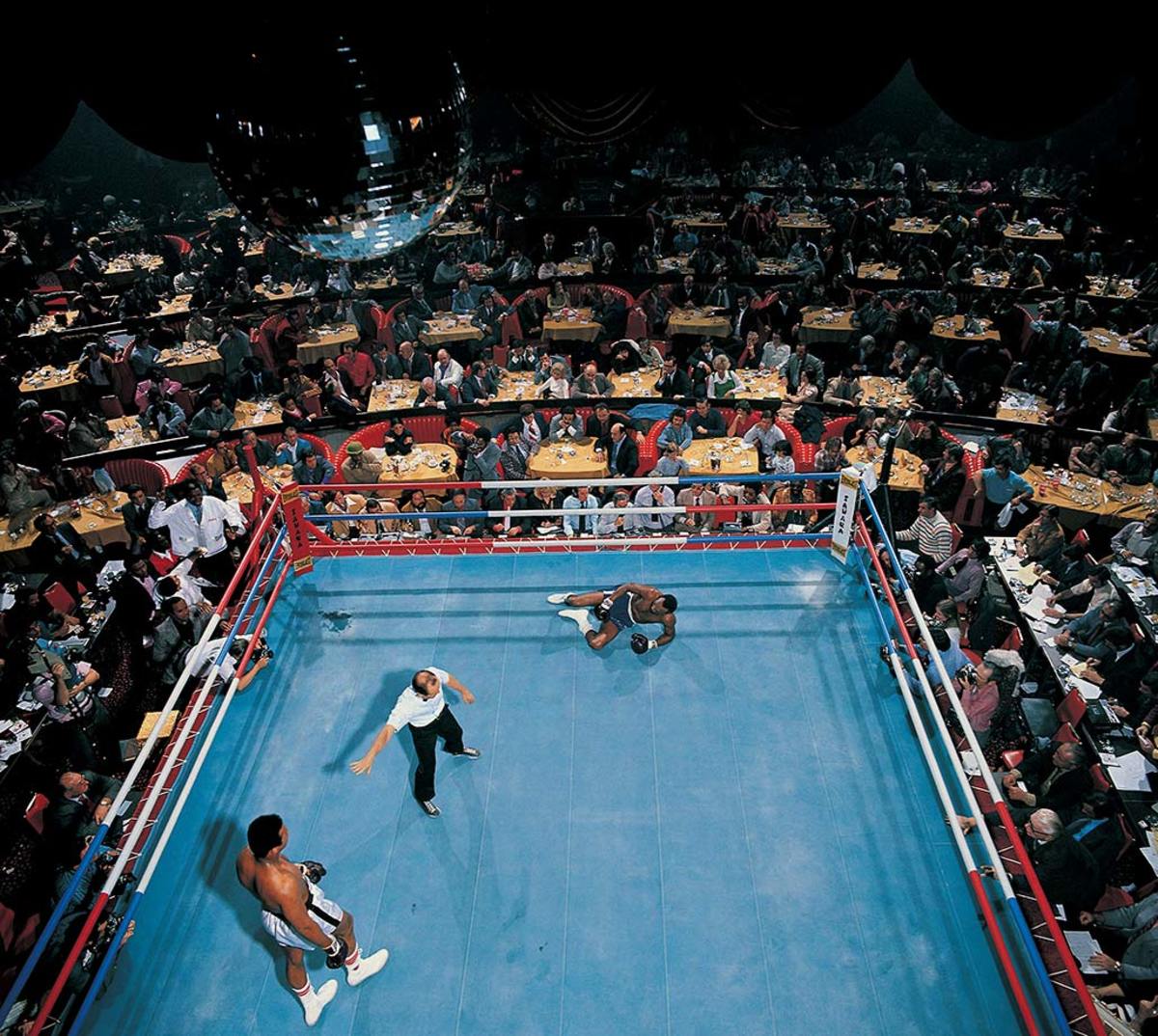
Foster lies on the canvas after getting knocked down by Ali. Ali knocked Foster down four times in the fifth round and twice more in the seventh round before he was finally counted out after Ali knocked him down again in the eighth round.
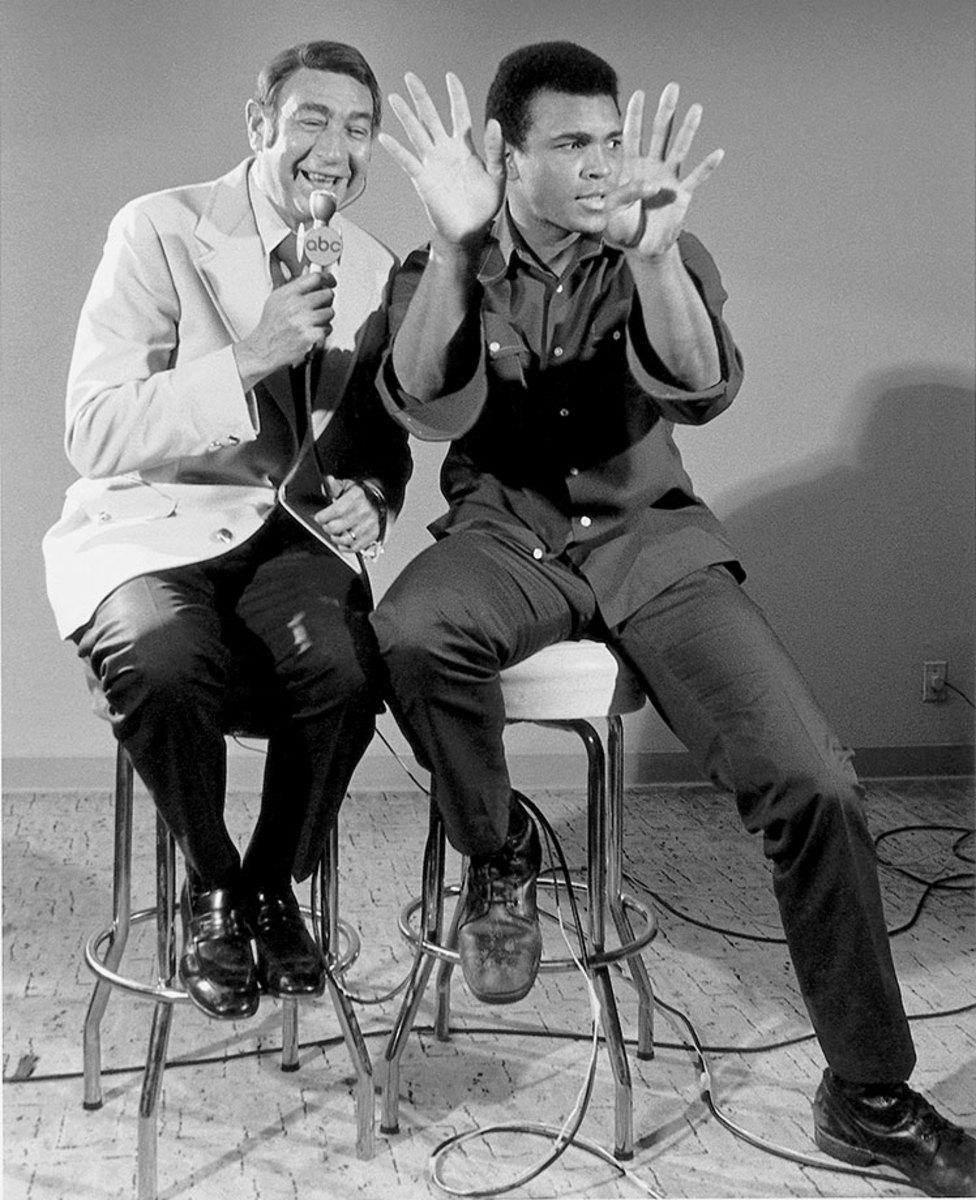
Ali sits with sportscaster Howard Cosell before his fight with Joe Bugner in February 1973. Although unable to knock Bugner out, Ali won comfortably by unanimous decision.
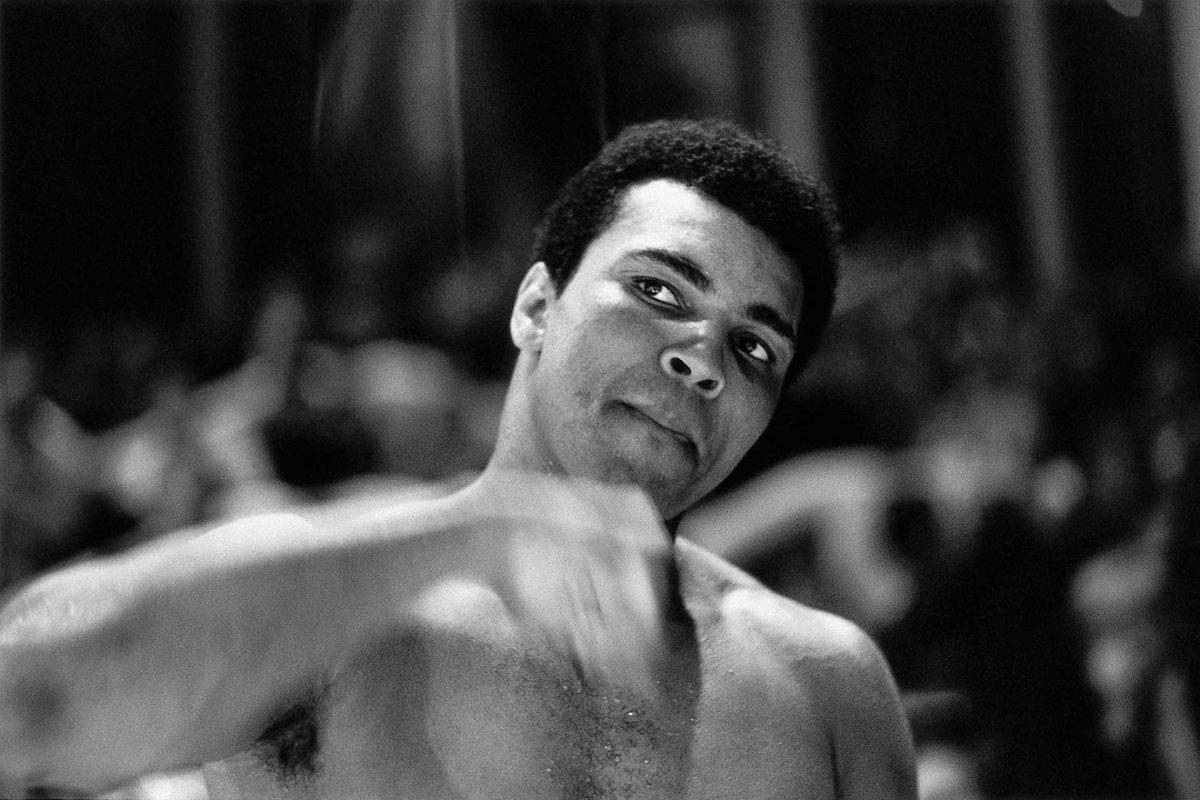
Ali hits a speed bag while warming up for his bout with Bugner in Las Vegas. Ali prepared ferociously for the fight, training 67 rounds the week leading up to the fight, including six rounds the day before the fight.
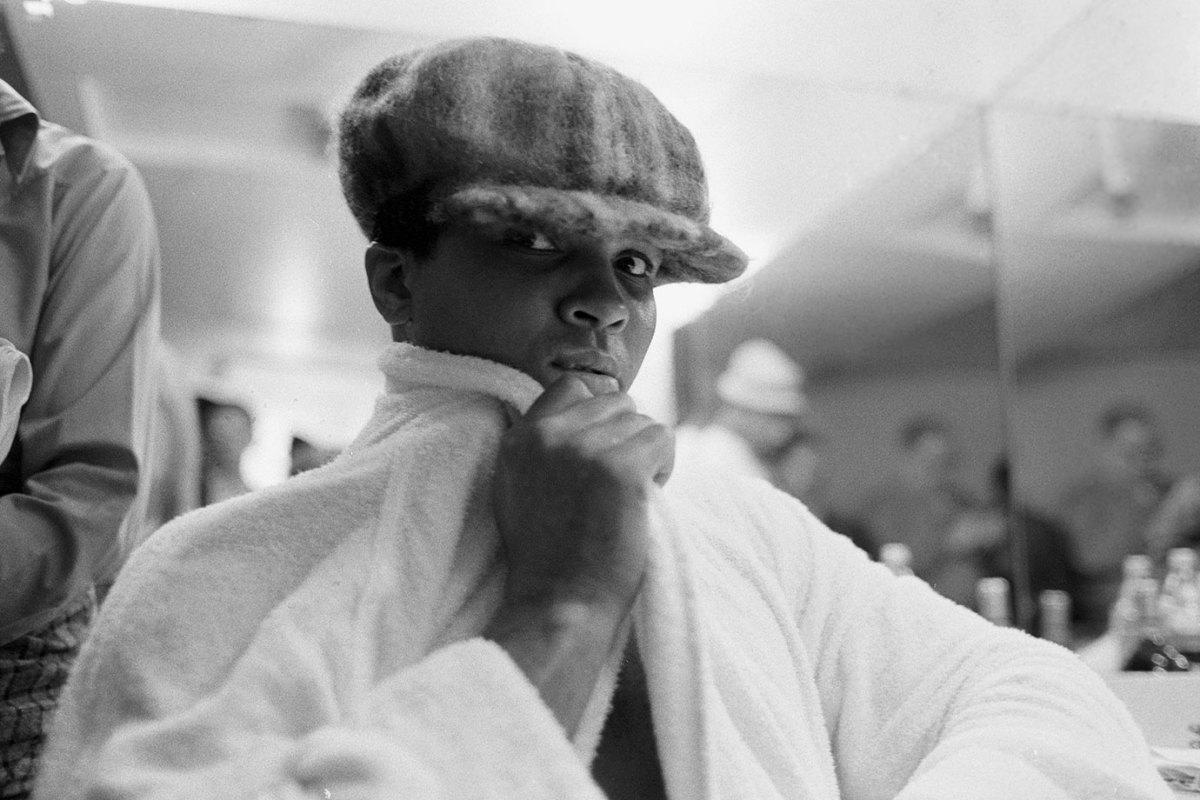
In a lighter pre-fight moment, Ali poses for a portrait wearing a hat in his dressing room before the match with Bugner.
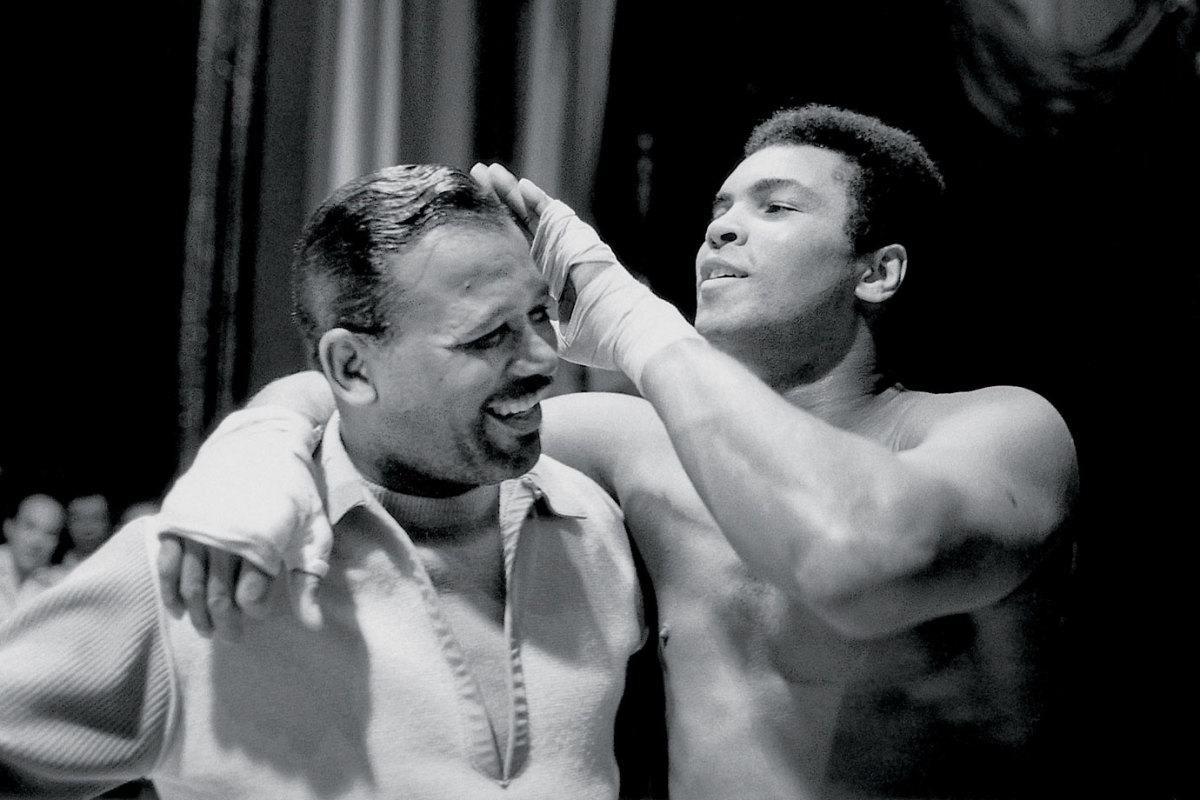
Ali plays with Sugar Ray Robinson's hair in the locker room before his bout with Bugner. The former welterweight and middleweight champion was Ali's childhood idol.
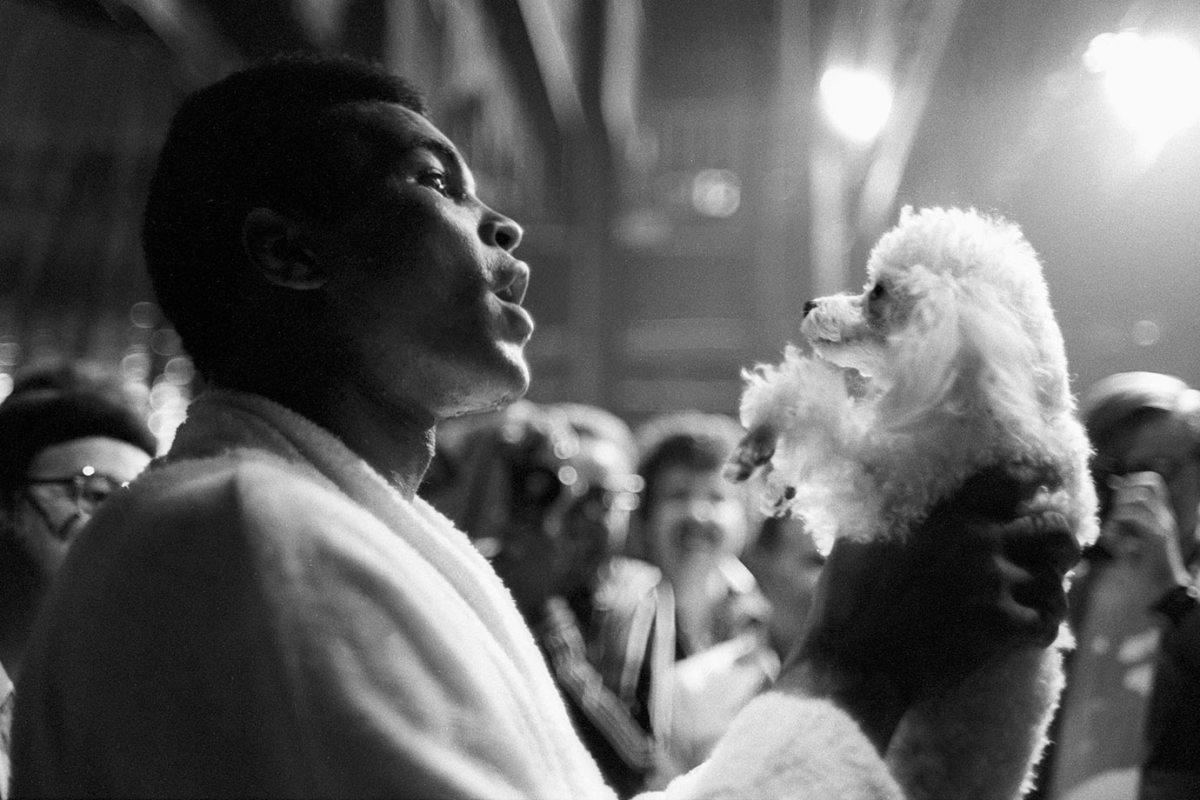
Before the fight with Bugner, Muhammad Ali enjoys a relaxed moment with a poodle at Caesars Palace Hotel. He won the fight with Bugner by unanimous decision.
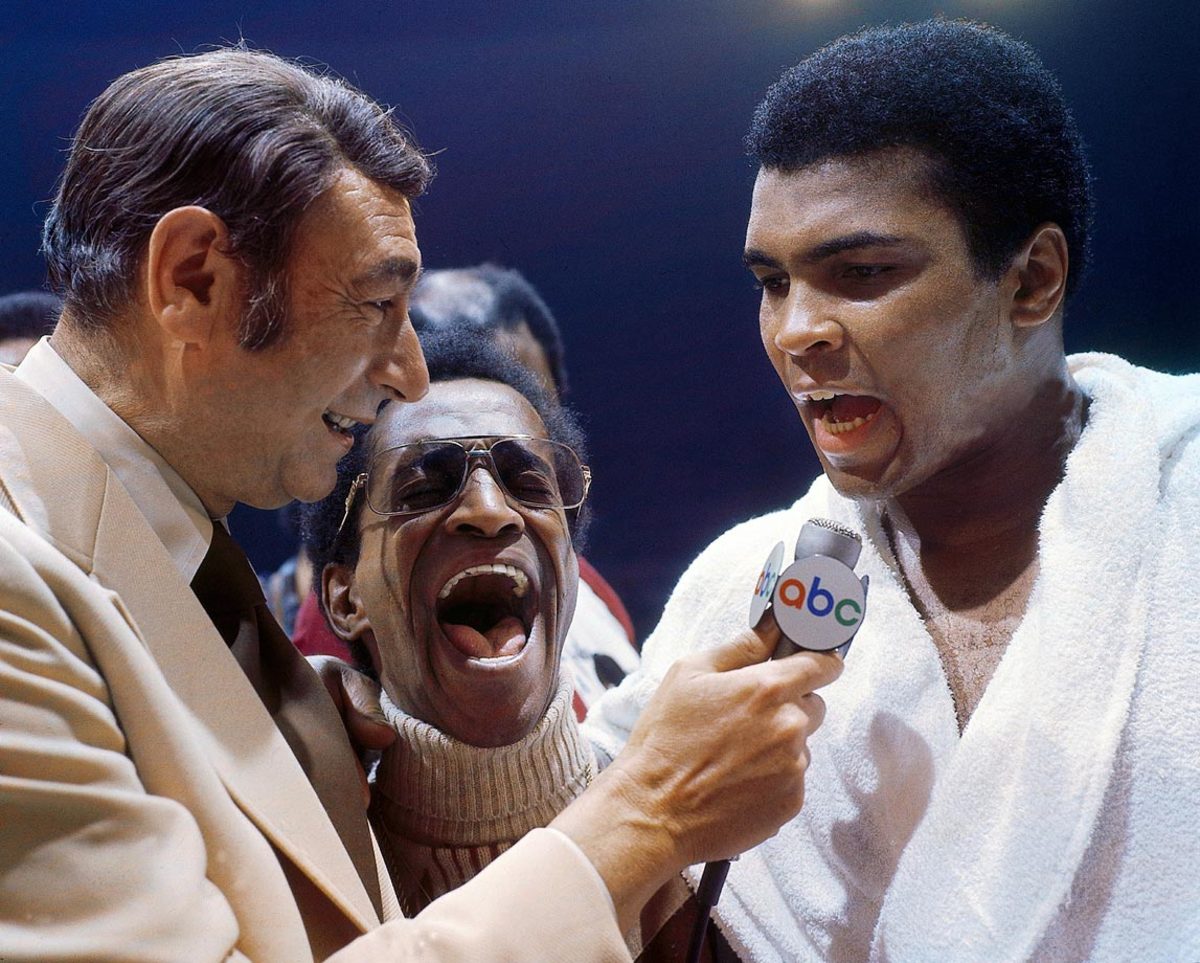
Howard Cosell interviews Ali, with entertainer Sammy Davis Jr. in the middle, after his victory over Joe Bugner by unanimous decision in. Although the fight was never in jeopardy of getting away from him, Ali praised Bugner's legs and said he could be a champion in a few years.
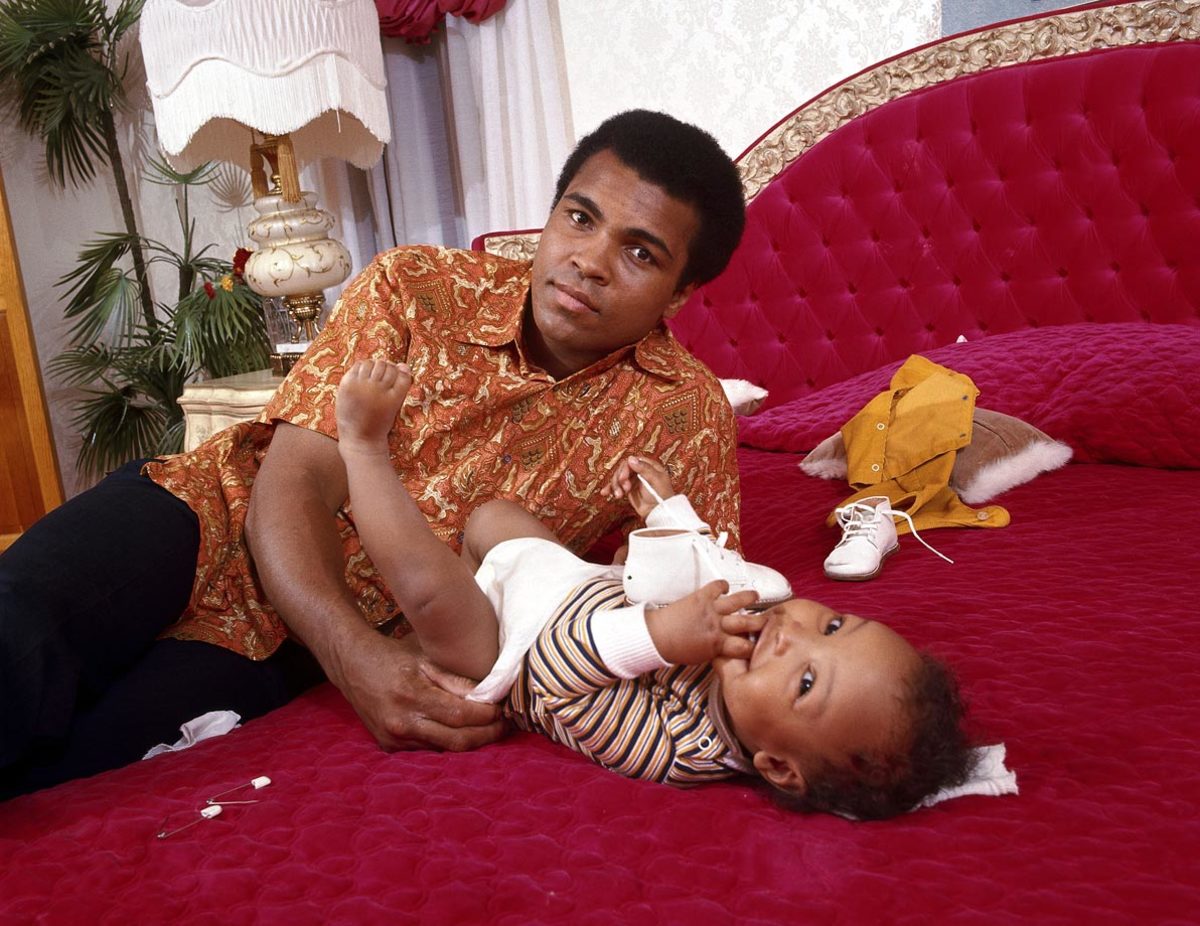
Ali changes the diaper of his son in his bedroom during a photo shoot at the family's home in April 1973. Ali had suffered a broken jaw less than a month earlier in his fight against Ken Norton.
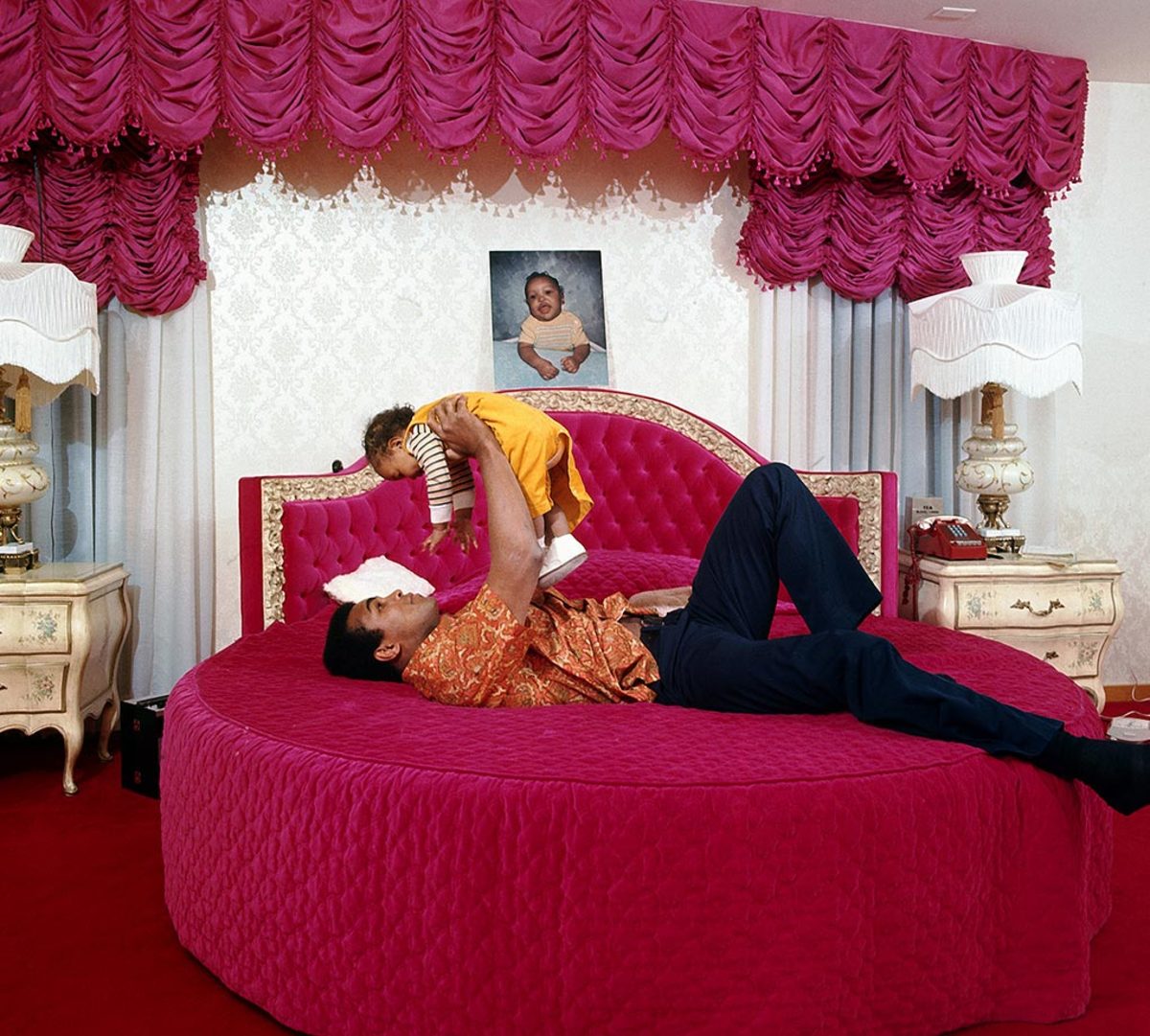
In the wake of his split decision loss to Norton, Ali plays with his son in his bedroom at home in Cherry Hill, N.J.
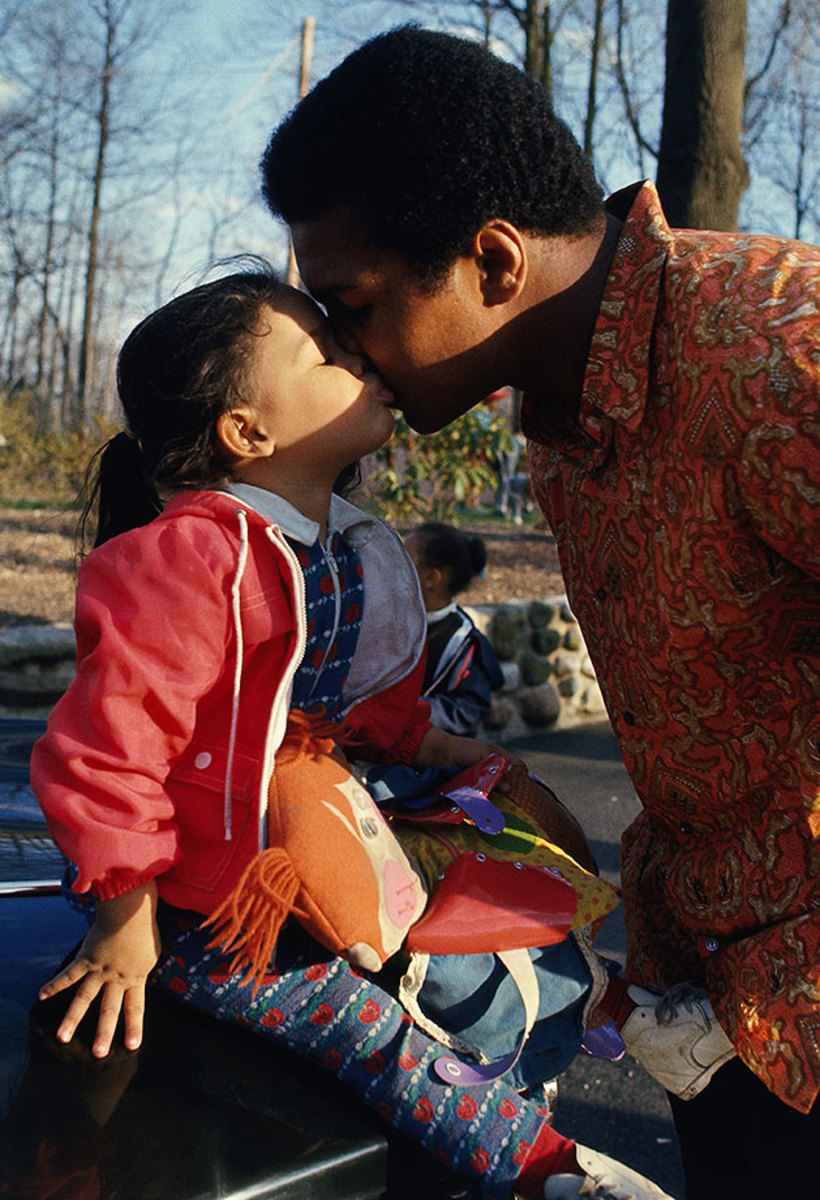
Ali kisses his daughter Jamillah outside of their home following the loss to Norton, just the second defeat of his career.
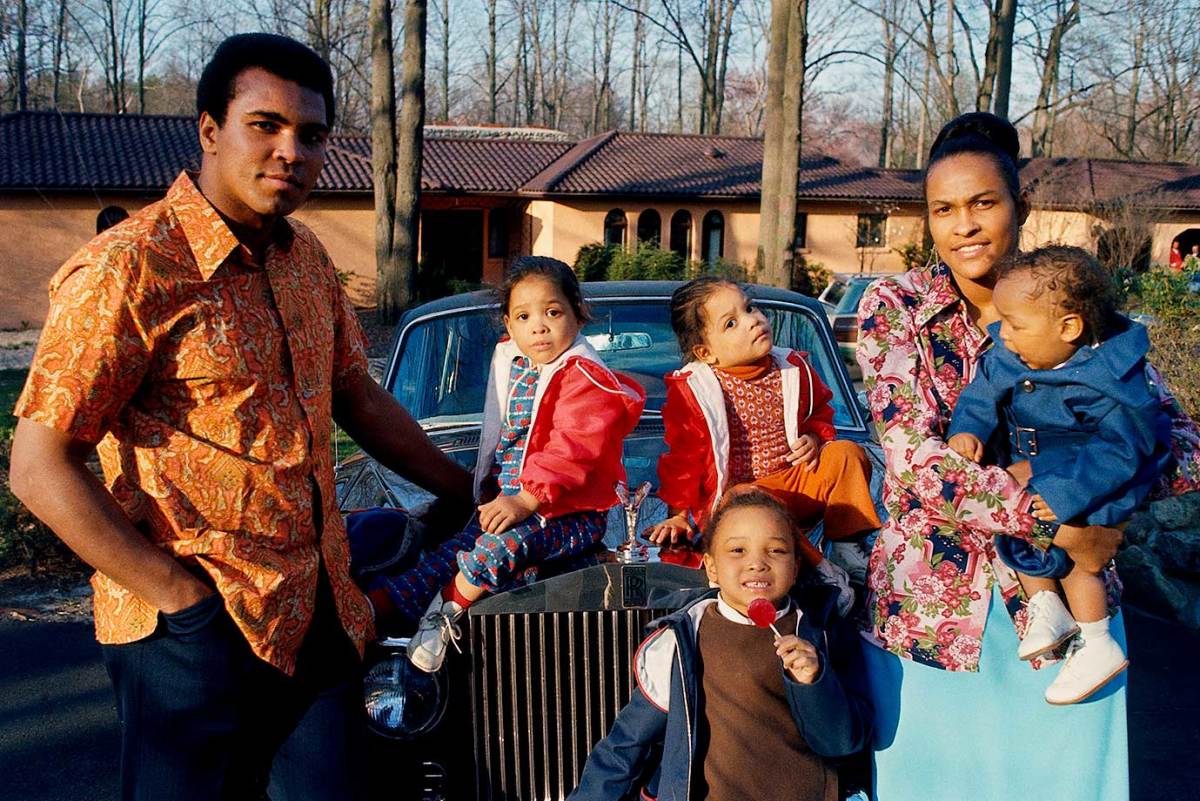
The Ali family standing outside their New Jersey home. To the right of Muhammad Ali are his twin daughters, Jamilllah and Rasheda, daughter Maryum and his wife, Khalilah, holding their son Ibn Muhammad Ali Jr.
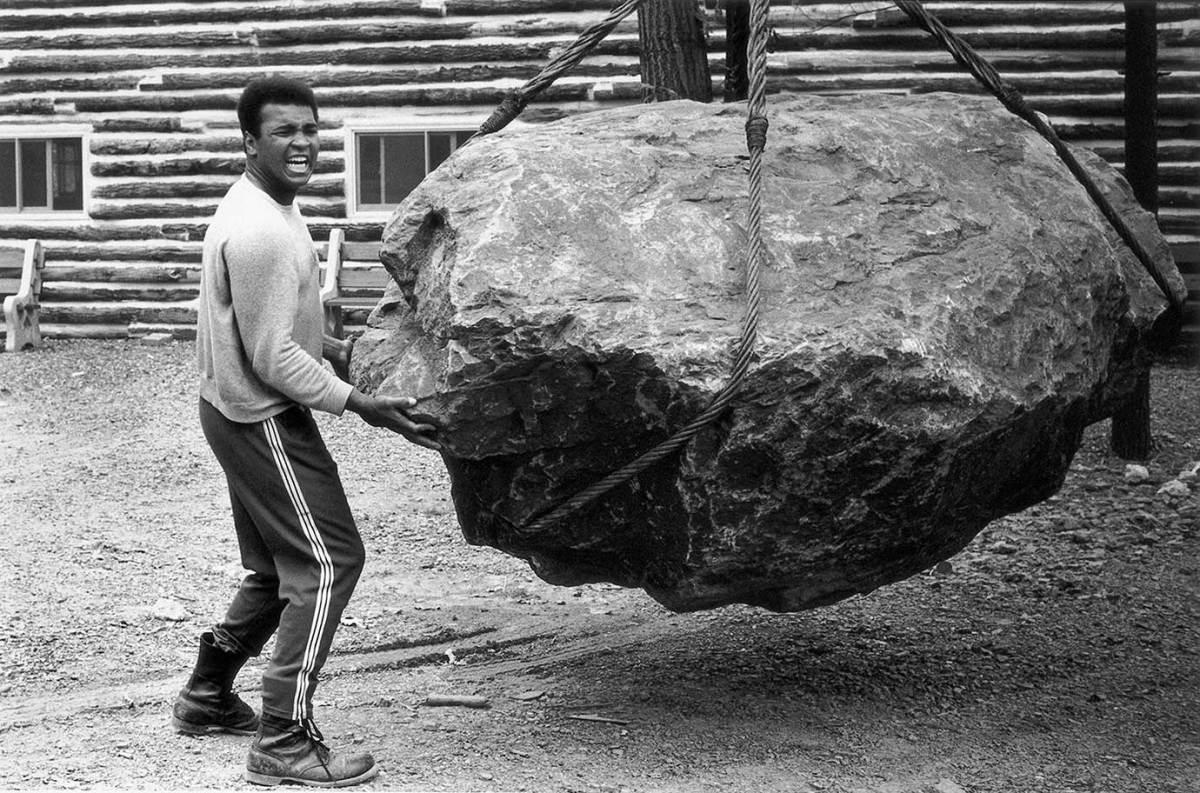
At his training camp cabin, Ali pushes a boulder during a photo shoot in Deer Lake, Penn., in August 1973. Ali was training for his rematch against Ken Norton, who broke his jaw five months earlier.
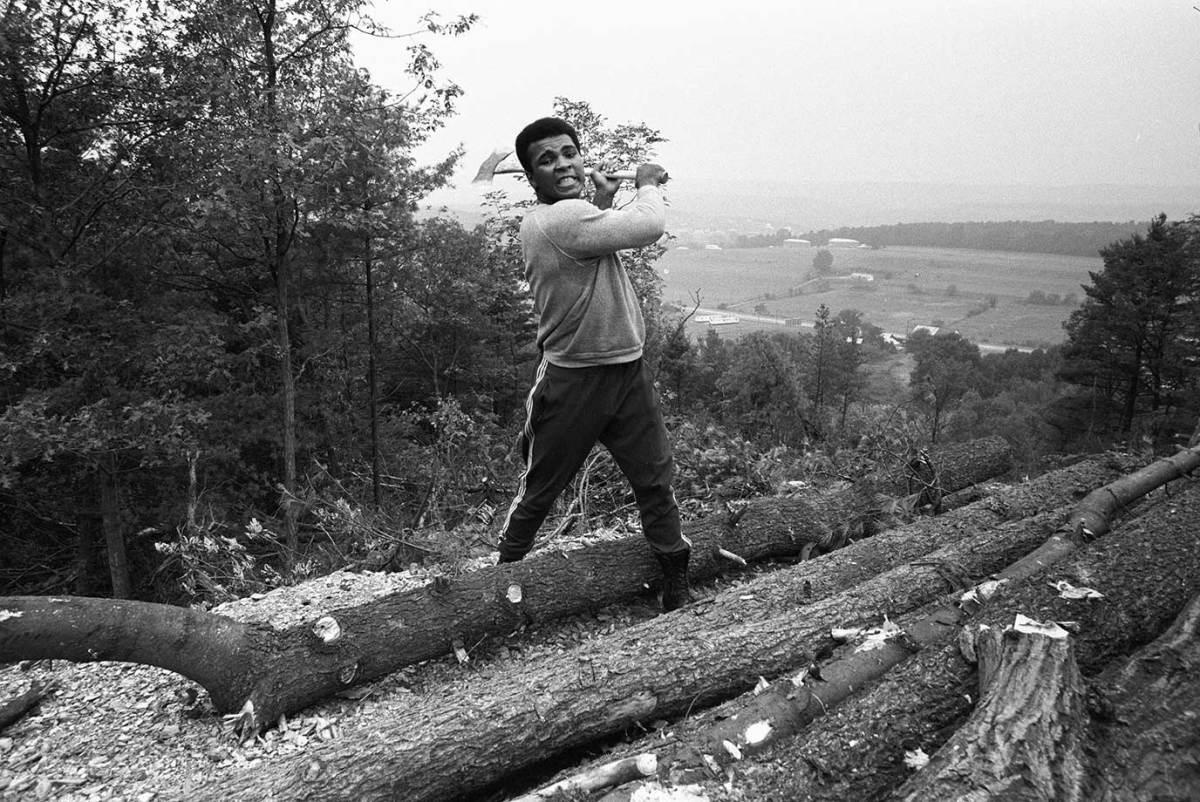
Ali chops wood at his cabin in Deer Lake. He referred to the training camp as "fighter's heaven" and used it to prepare for fights away from the spotlight.
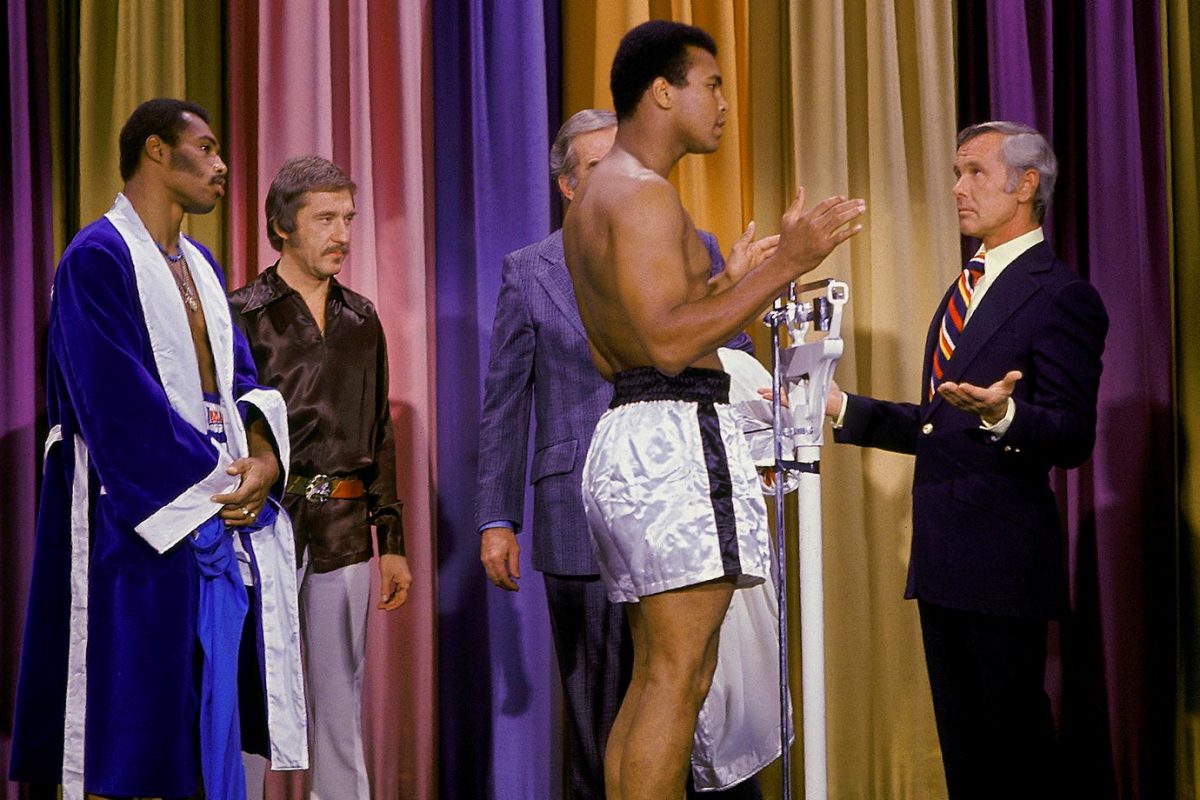
The fighters weigh in on the Tonight Show with Johnny Carson ahead of Ali and Ken Norton's September 1973 fight.
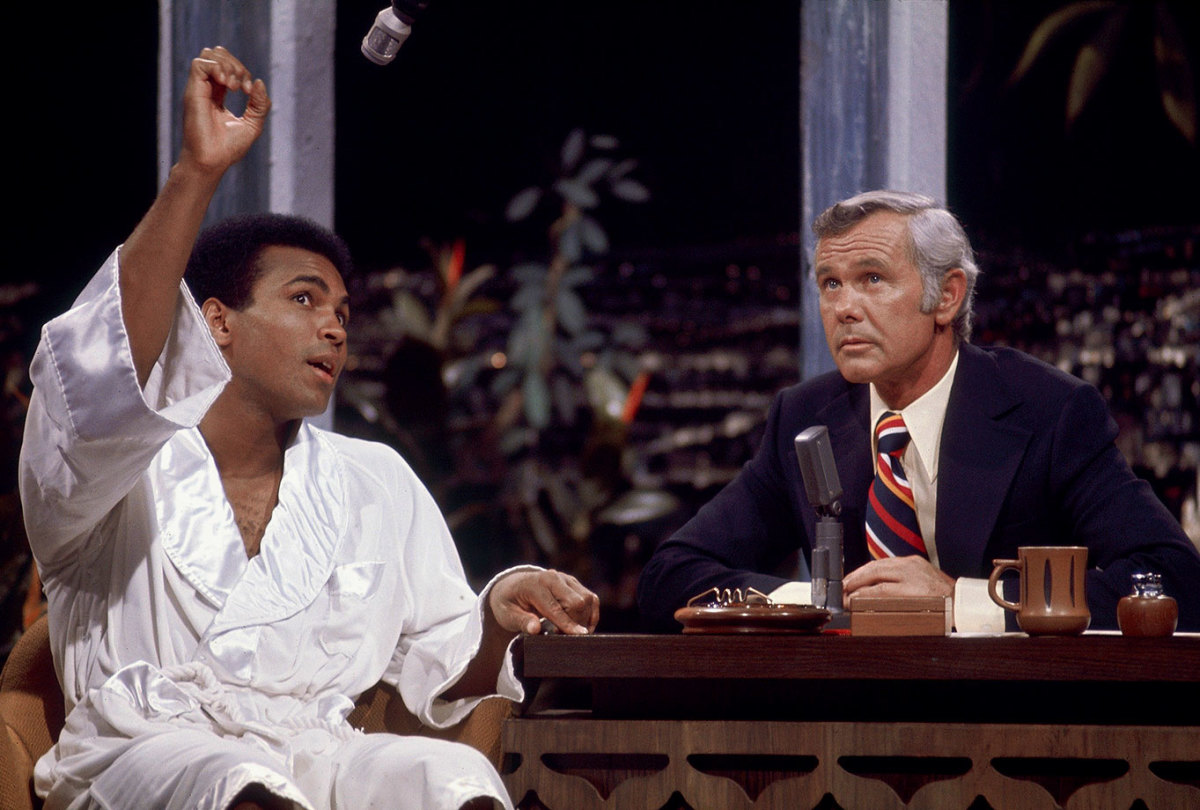
Johnny Carson listens to Ali on the Tonight Show three days before his rematch with Norton. Ali would avenge his earlier loss to Norton, winning a narrow split decision.
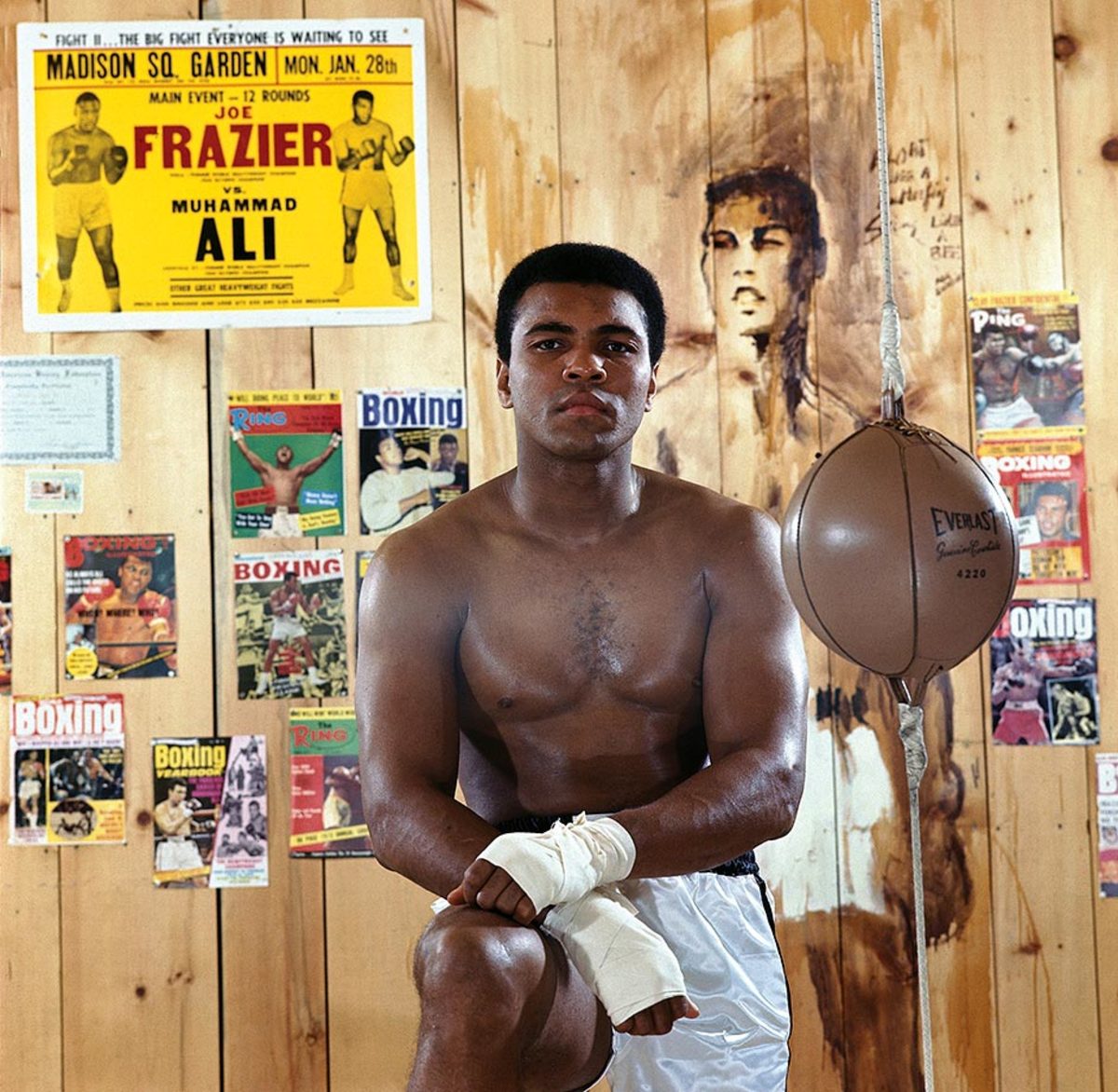
Ali poses in front of posters and magazine covers from throughout his career at his training camp cabin in Deer Lake in 1974.
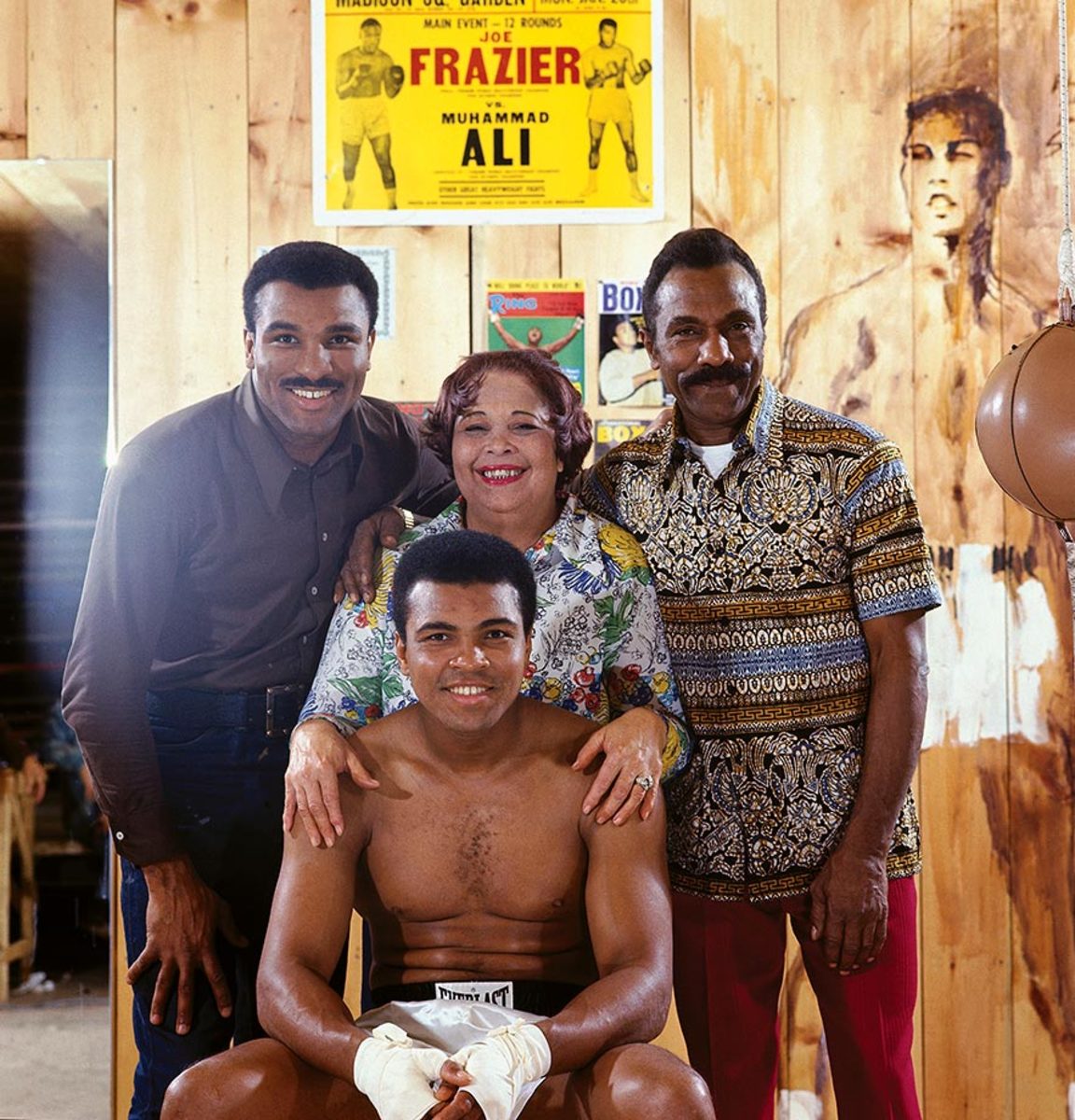
Ali poses with members of his family in front of a poster from his first fight with Joe Frazier. Ali's brother, Rahman Ali; mother, Odessa Clay; and father, Cassius Clay Sr. stand behind the boxer.
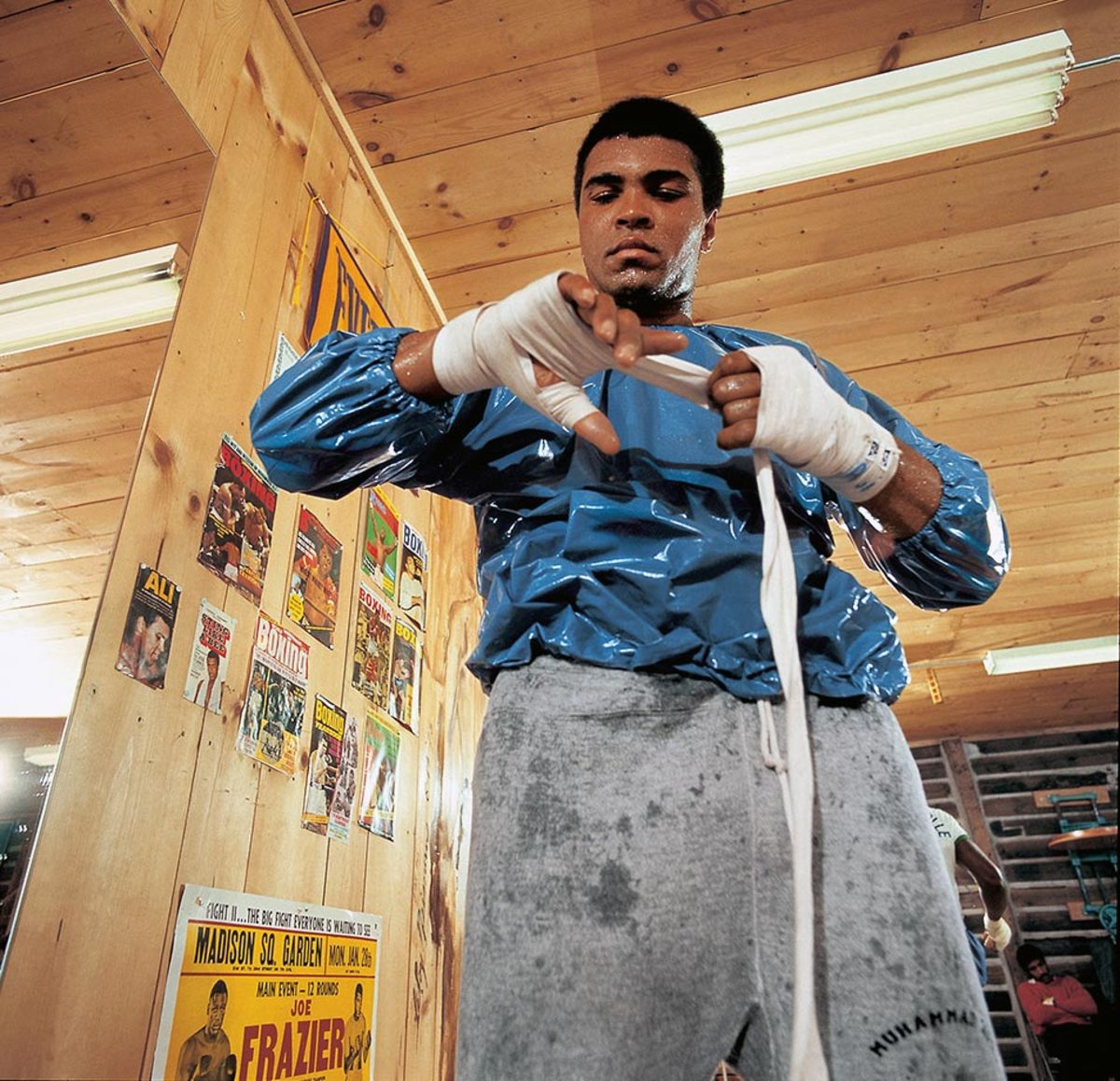
Less than three weeks before his rematch with Joe Frazier on Jan. 28, 1974, Ali wraps his hands while wearing a sauna suit at his training camp cabin.
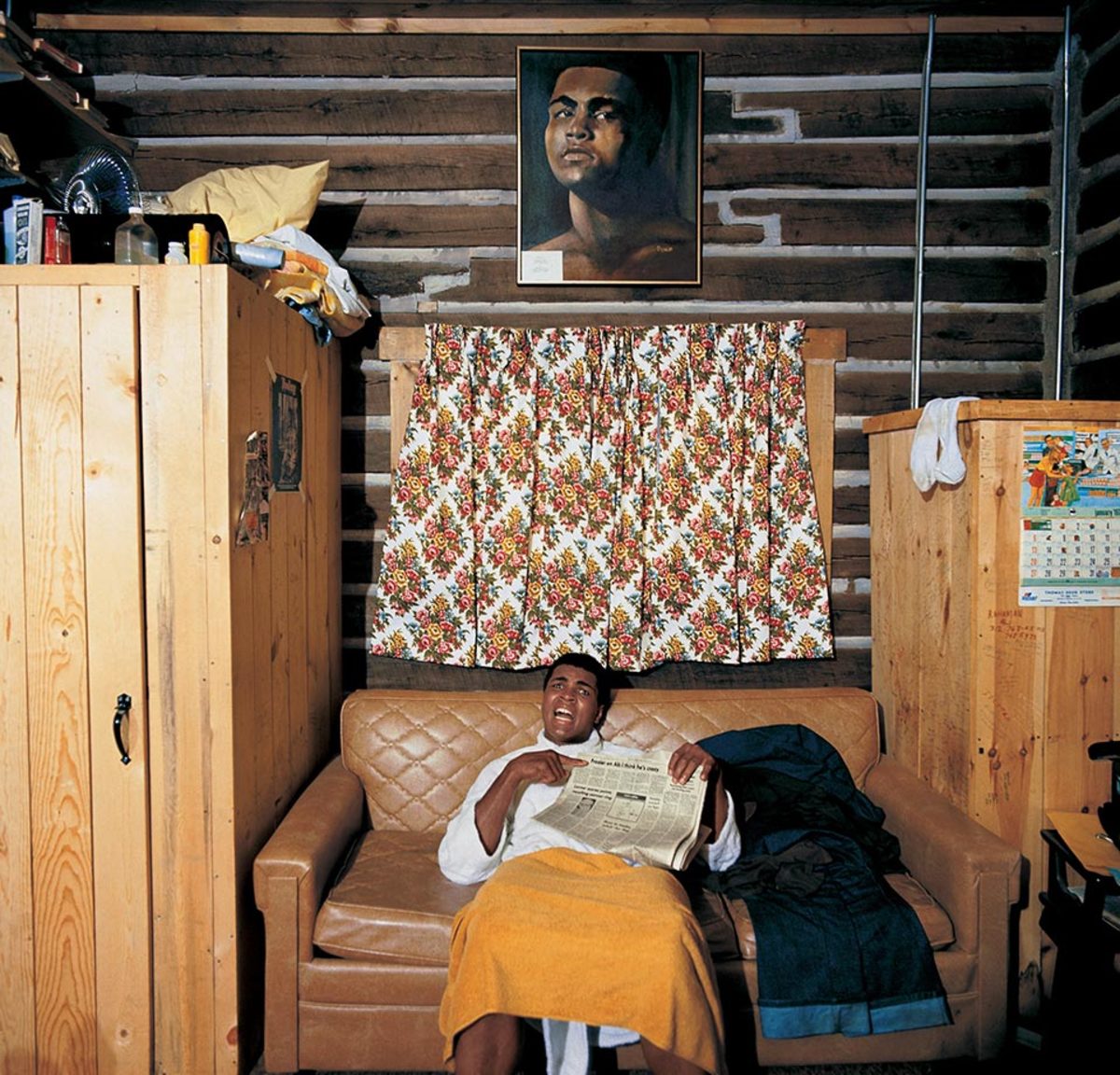
Ali holds a newspaper at his cabin in January 1974. He is pointing to a headline that reads, "Frazier On Ali, I Think He's Crazy." Ali and Frazier fought for the second time later that month with Ali winning by a unanimous decision.
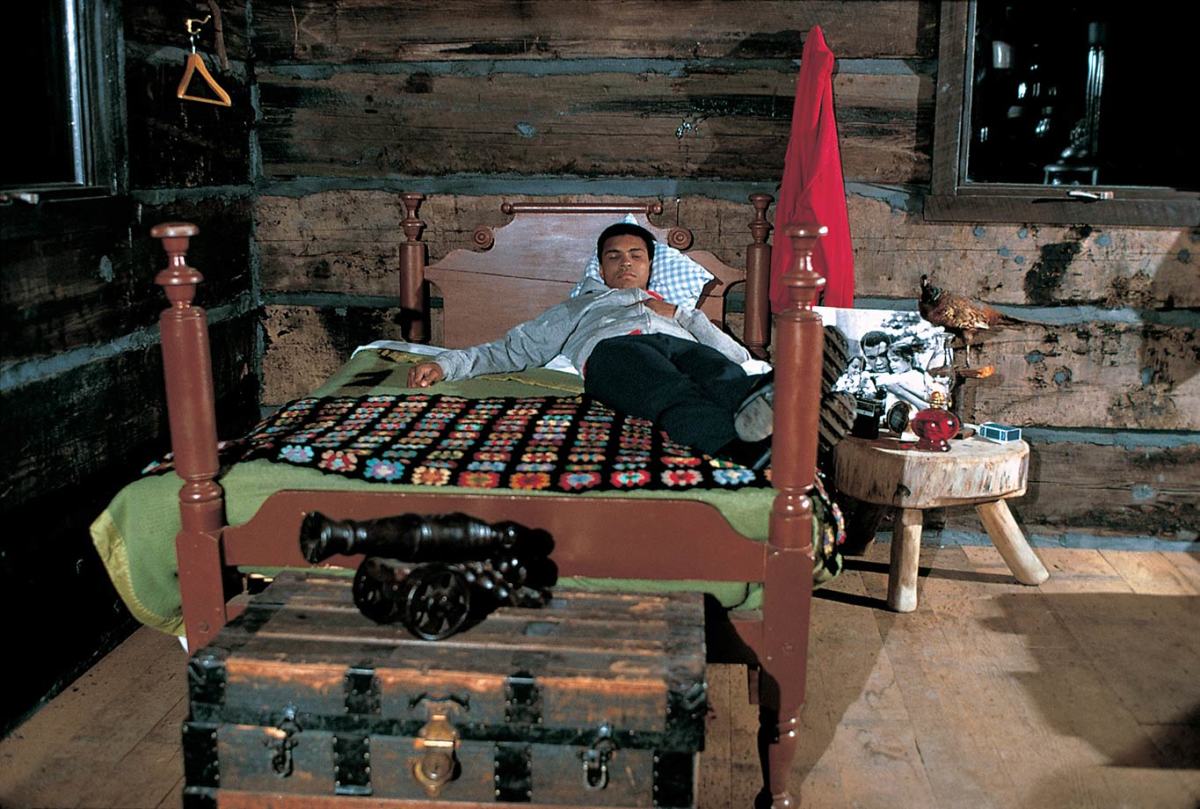
Ali lies on his bed at his cabin during the January 1974 photo shoot.
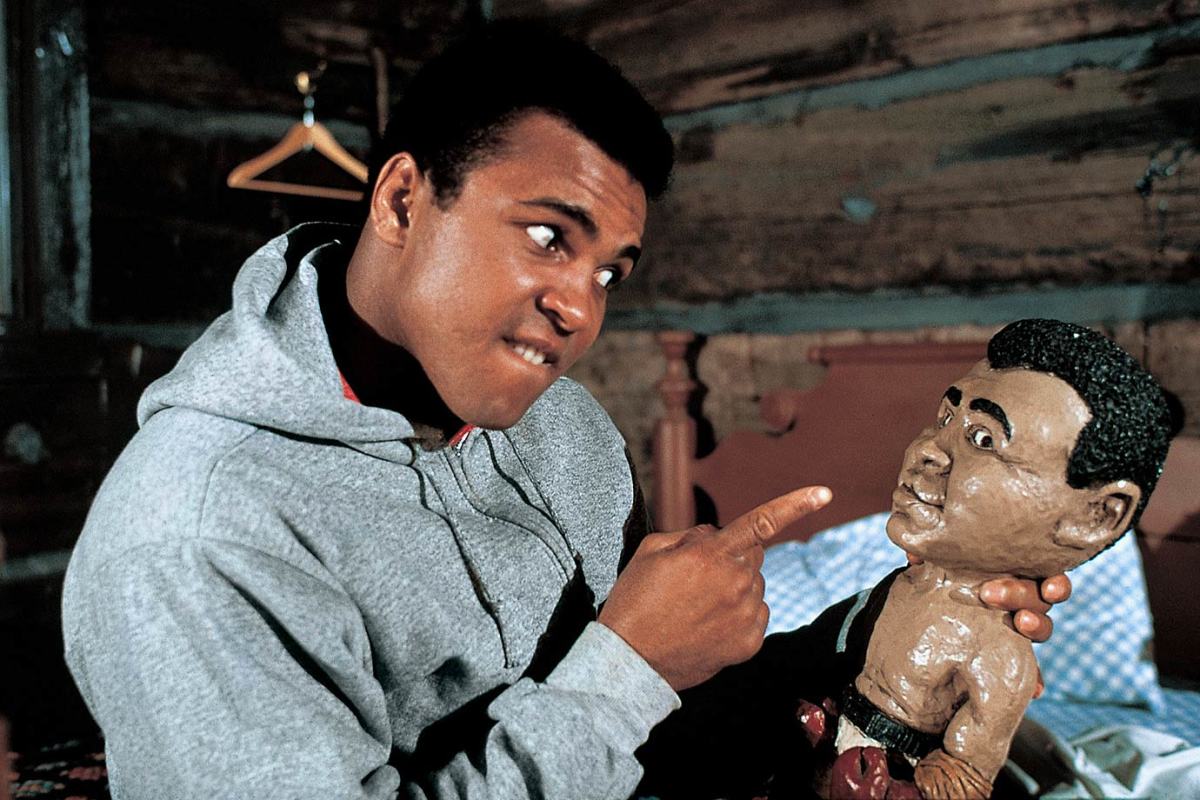
His smaller incarnation stares straight back as Ali plays with a doll of himself during the same 1974 shoot at his training camp cabin.
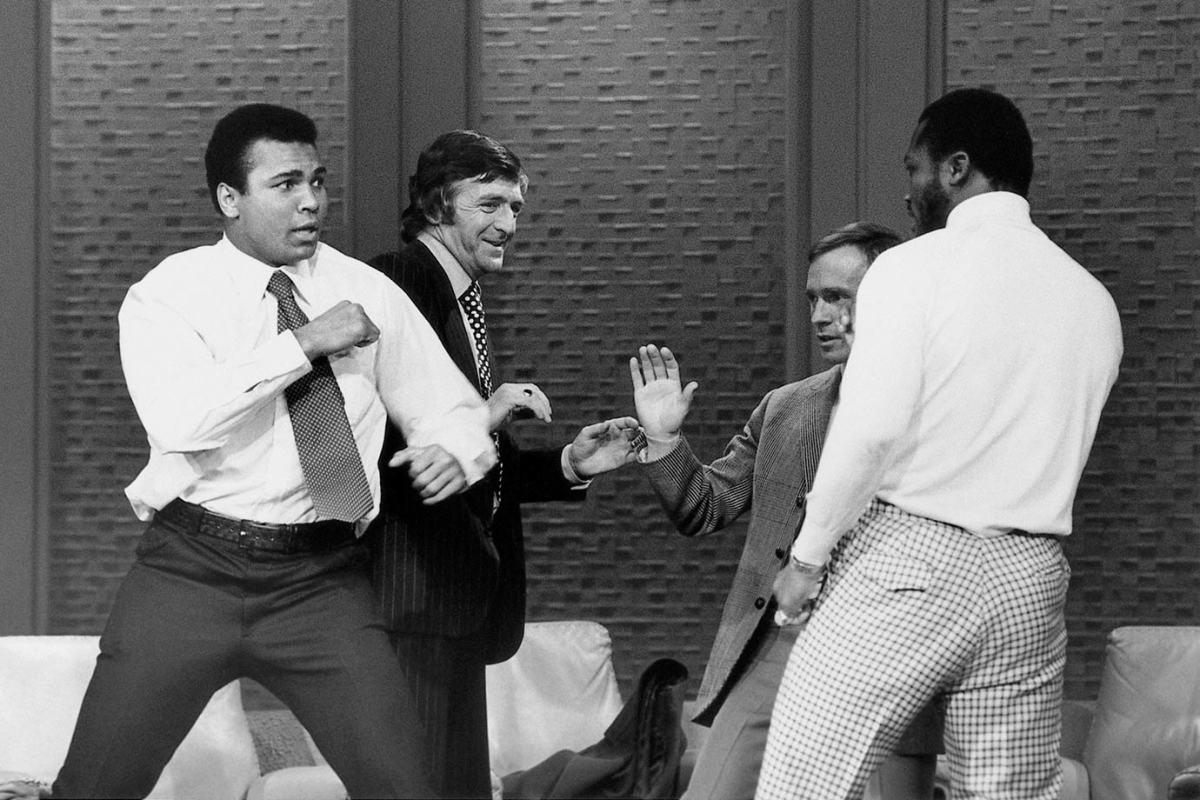
Ali and Joe Frazier fight on the set of The Dick Cavett Show while reviewing their 1971 bout in advance of their 1974 rematch. Ali called Frazier ignorant, to which Frazier took exception. As the studio crew tried to calm Frazier down, Ali held Frazier by the neck, forcing him to sit down and sparking a fight. The television set fight amped up anticipation of their January 1974 bout.
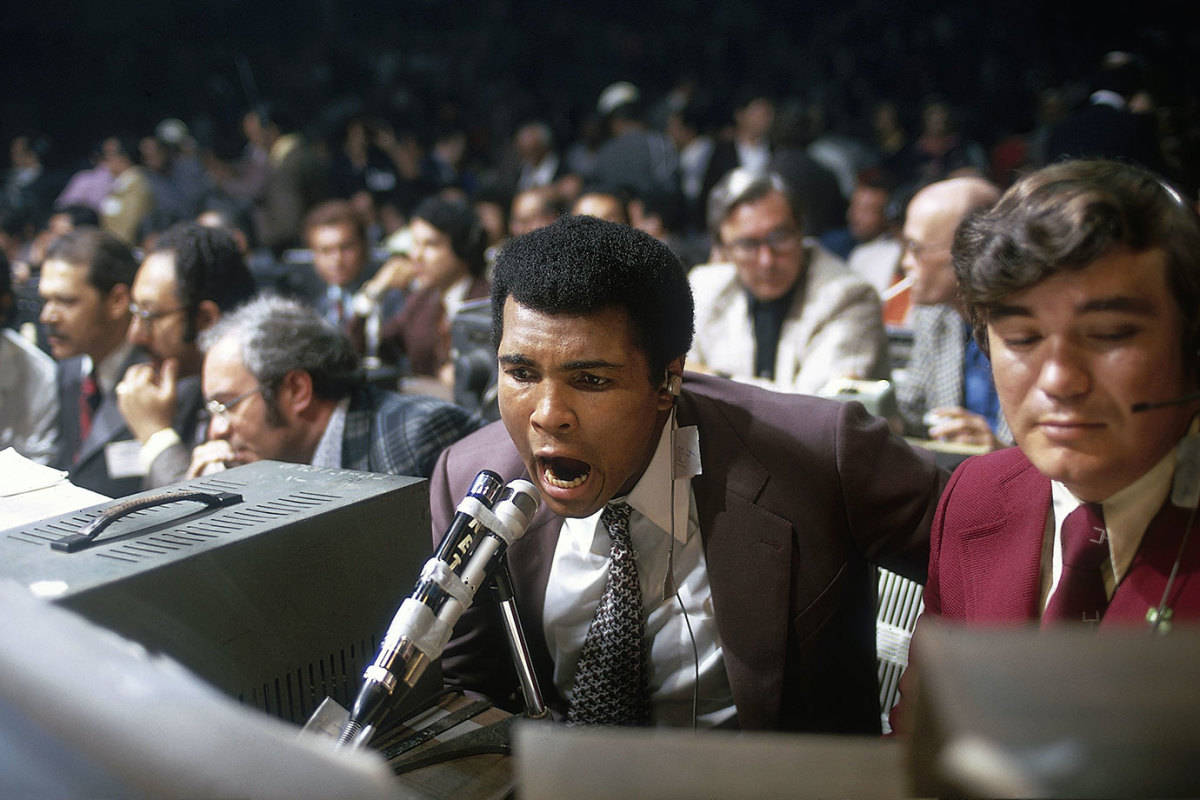
Exploring a different side of the sport, Ali broadcasts the fight between George Foreman and Ken Norton in March 1974. Foreman won the fight by technical knockout in the second round, setting up the showdown with Ali in Zaire.
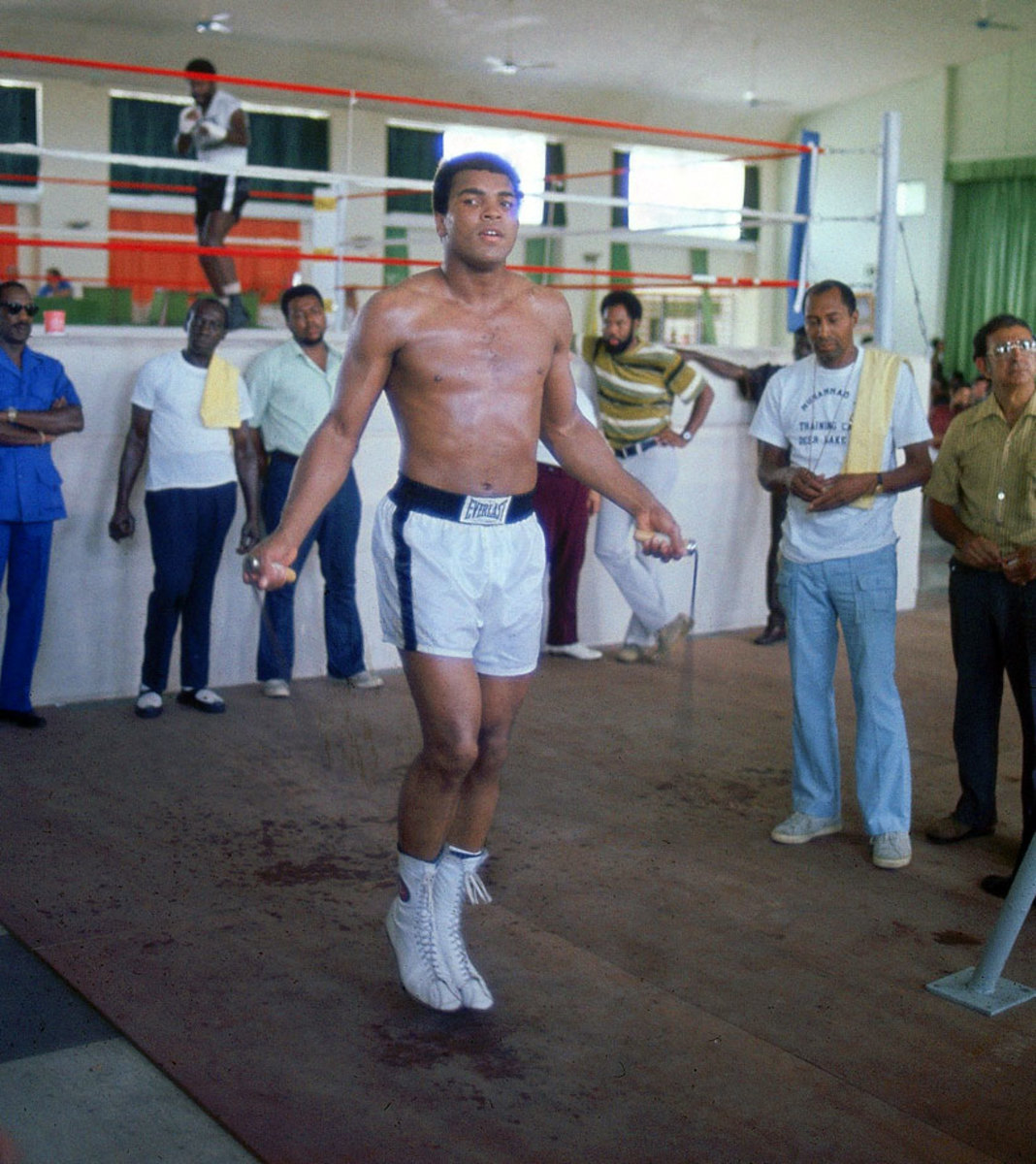
Ali jumps rope at the Salle de Congres in Kinshasa, Zaire, while training for his heavyweight title fight against George Foreman. Both Ali and Foreman spent most of the summer of 1974 training in Zaire to adjust to the climate.
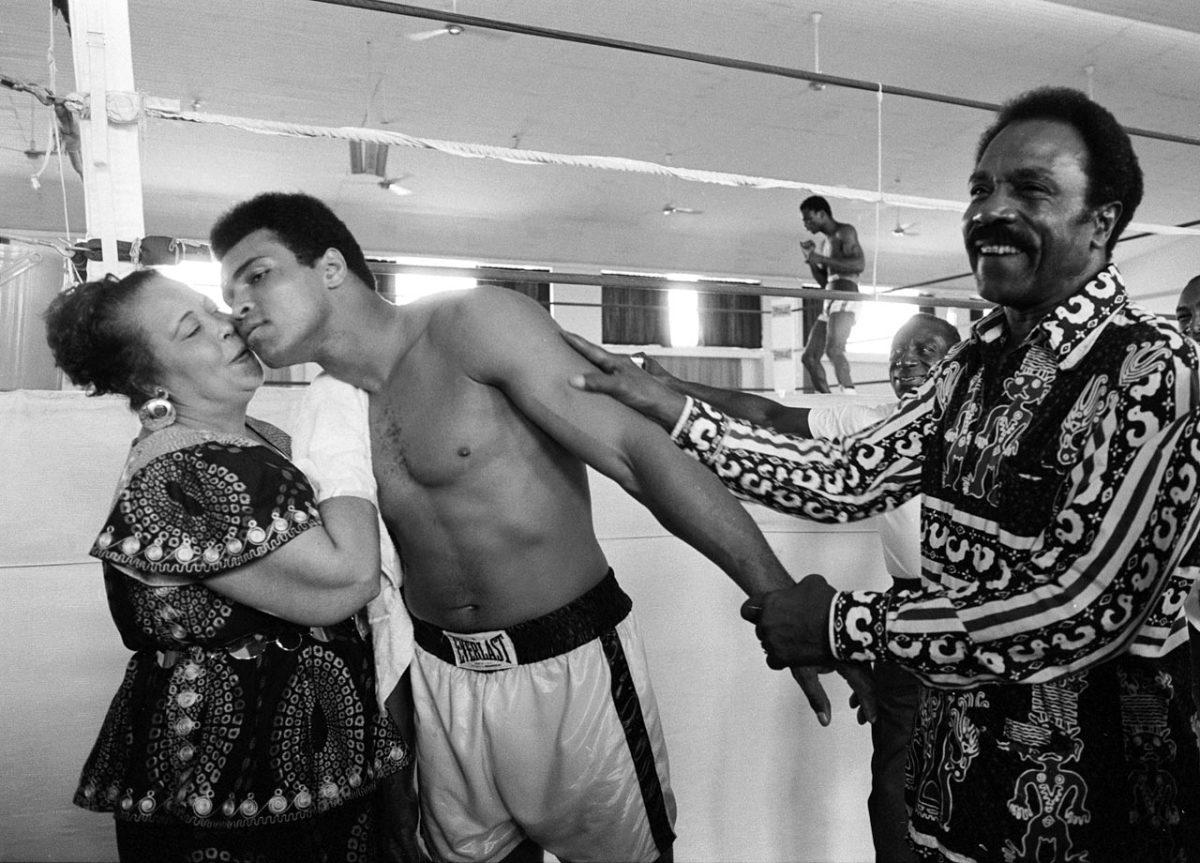
While training before his fight with George Foreman, Ali kisses his mother, Odessa Clay, while his father, Cassius Clay Sr., looks on. Ali's superior strategy and ability to take a punch led him to his upset victory as he absorbed body blows from Foreman before he responded with powerful combinations to Foreman's head.
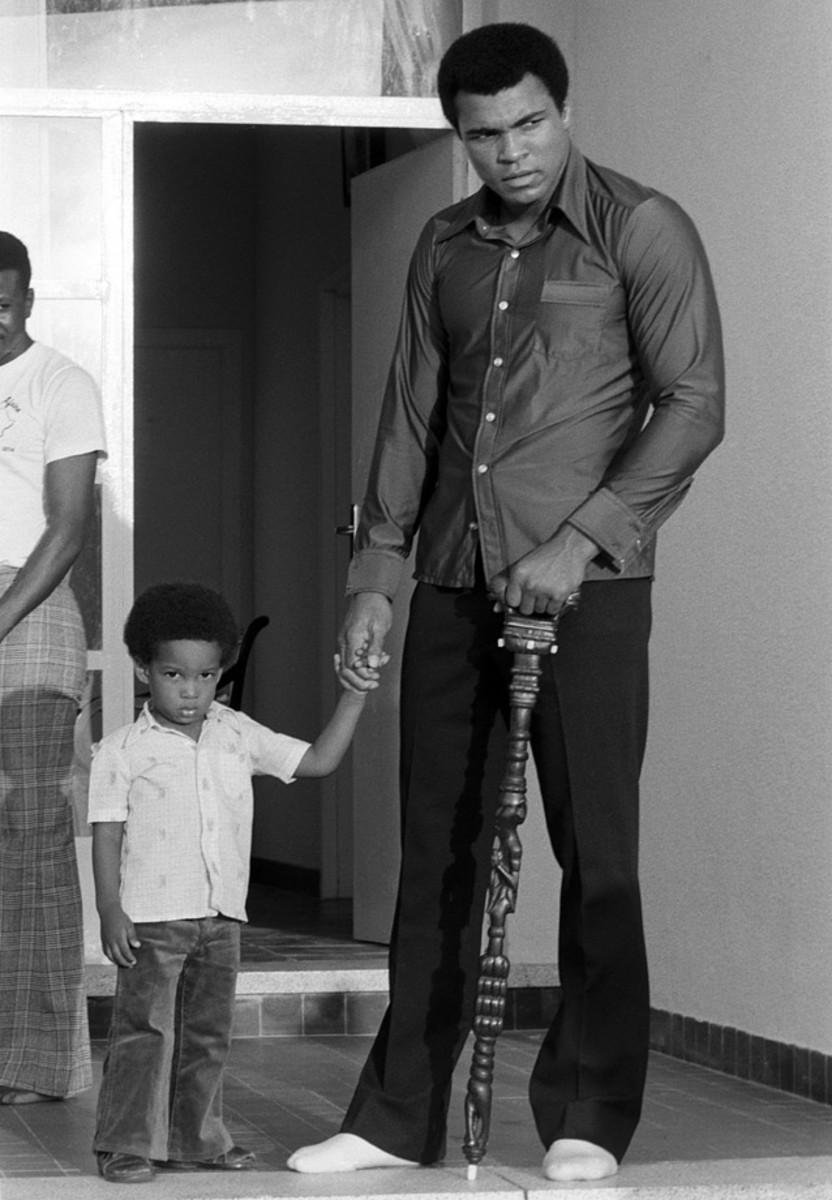
Four days before the fight, Ali holds the hand of his son Ibn in Zaire. Ali successfully courted the favor of the Zaire crowd, prompting chants of "Ali bomaye!" — translated as "Ali, kill him!"
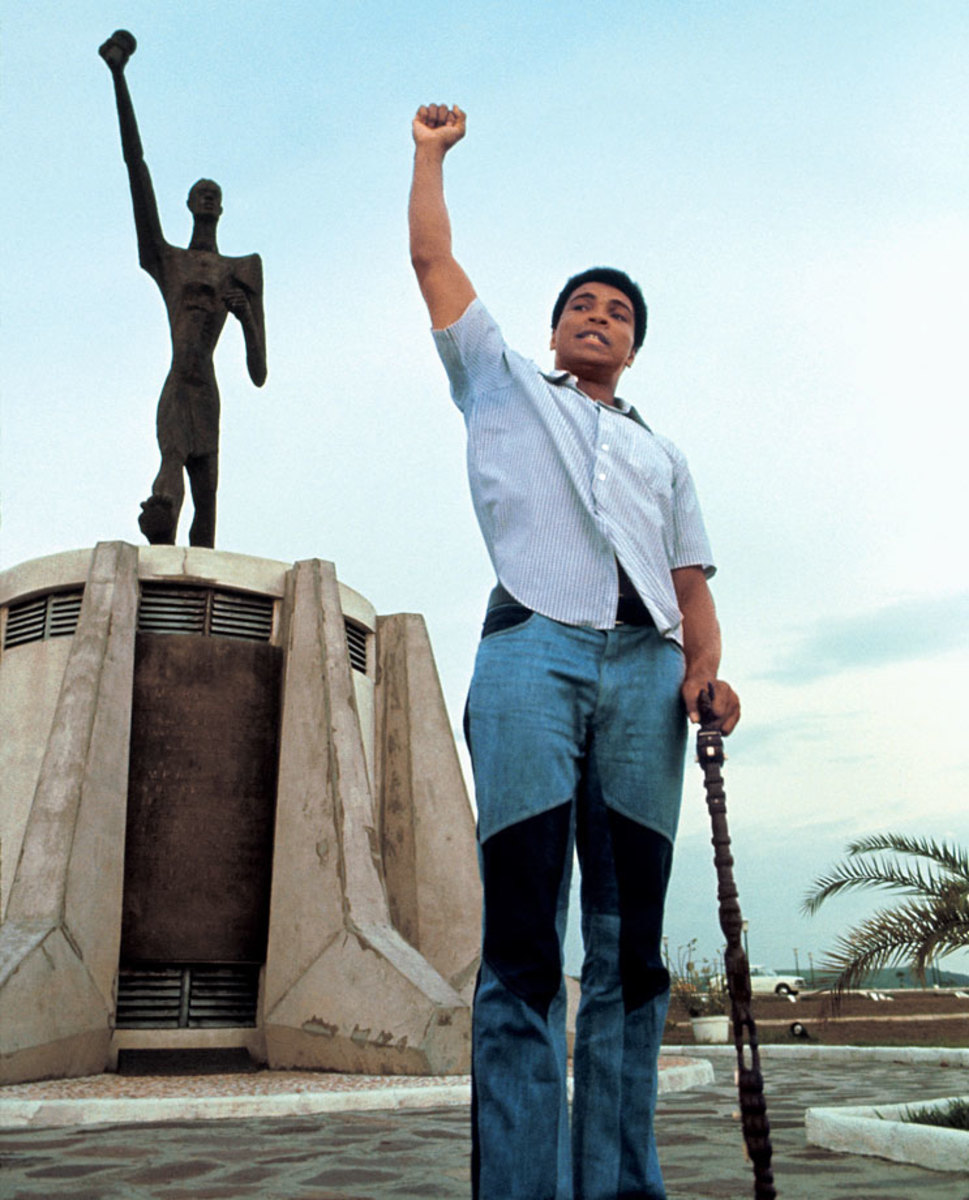
Ali poses in front of the Le Militant statue at the presidential complex that was the site of Ali's January heavyweight title bout with Foreman. The fight was originally set for a month earlier, but Foreman suffered a cut near his eye during training, forcing a delay.
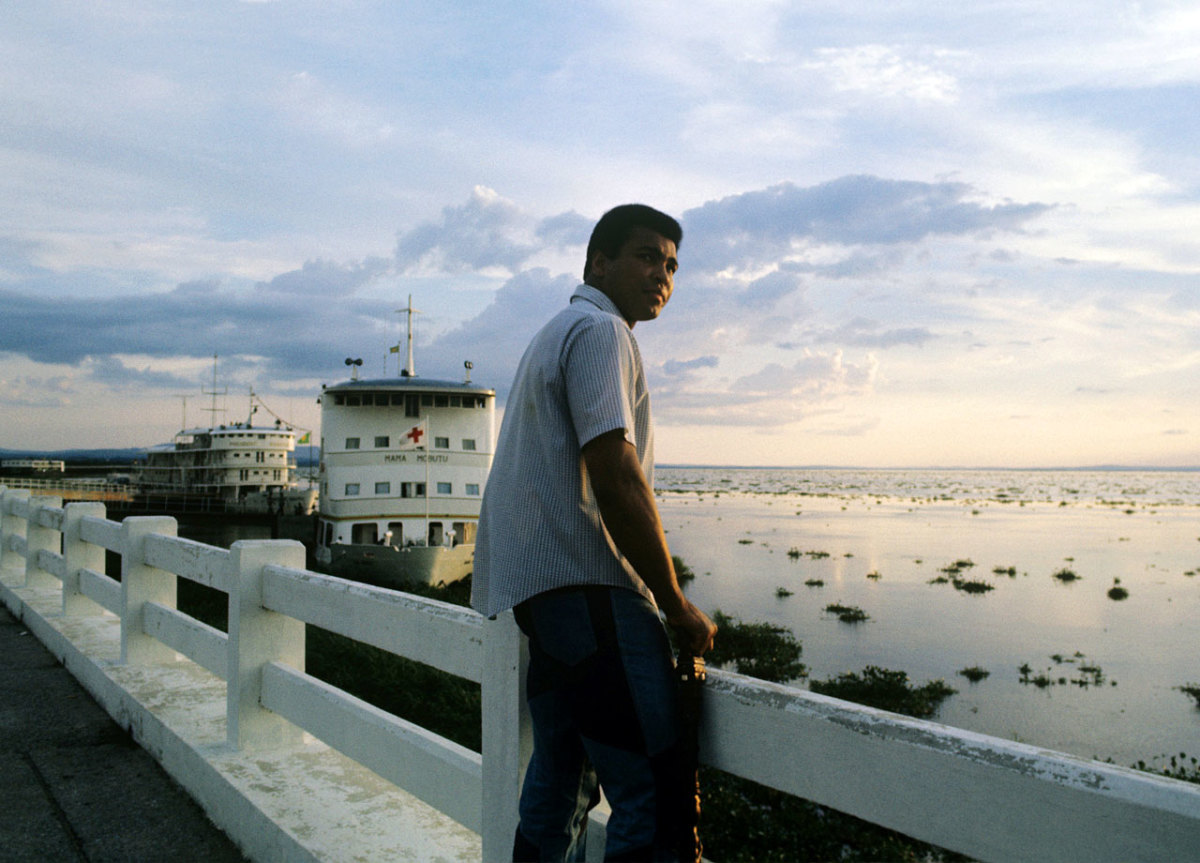
Ali stands against the railing on the River Zaire watching the sunset four days before the Rumble in the Jungle. The fight was sponsored by Zaire to achieve the $5 million purse promoter Don King had promised both Ali and Foreman.
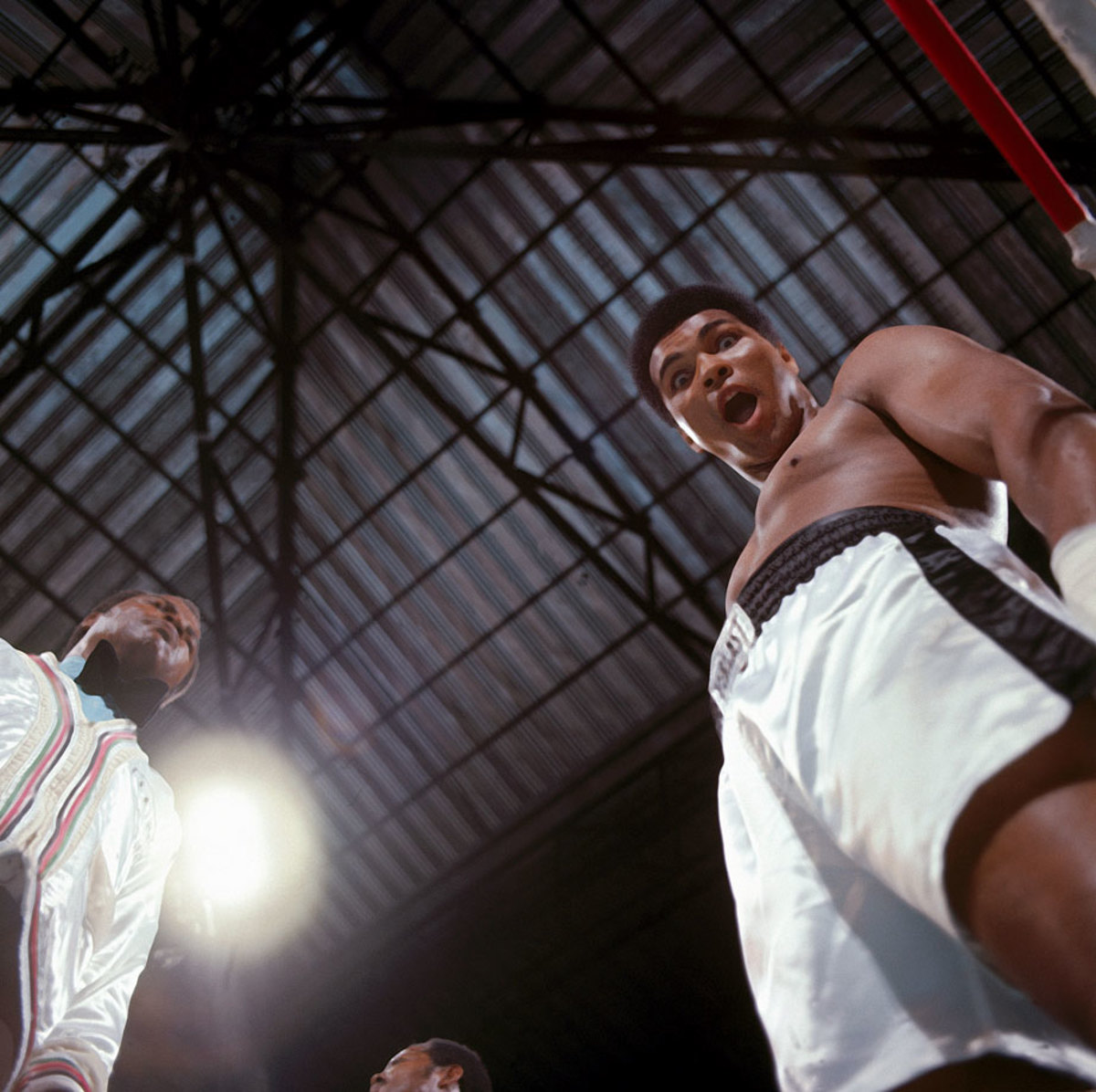
Before employing his famous rope-a-dope strategy against Foreman, Ali makes a face at the camera. Ali allowed Foreman to throw many punches but only into his arms and body, and when Foreman tired himself out from the mostly ineffective punches, Ali took control of the fight.
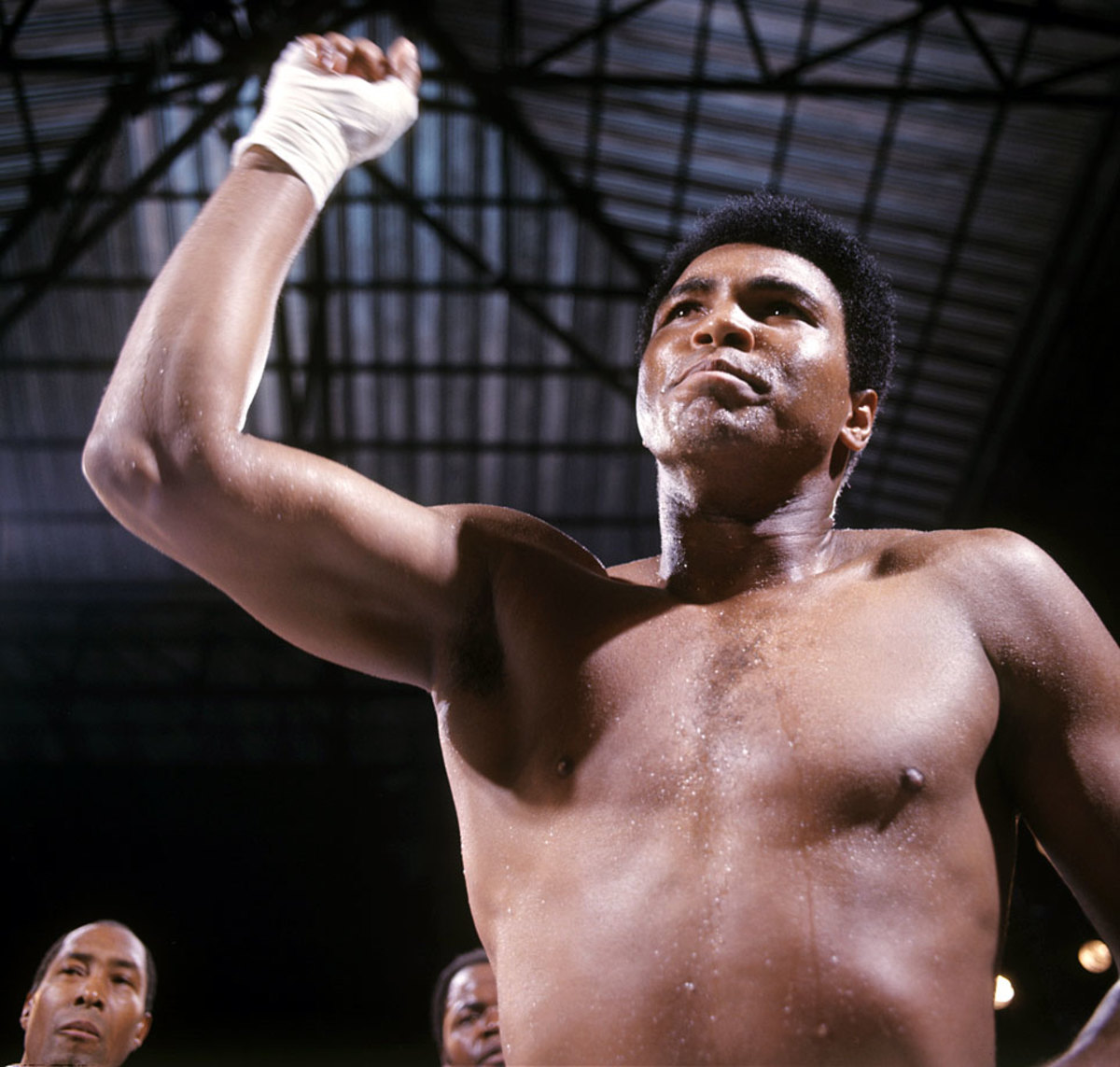
Ali points before his bout with Foreman. The victory over his favored opponent made him the heavyweight champion of the world for the first time since he was stripped of his titles in 1967.
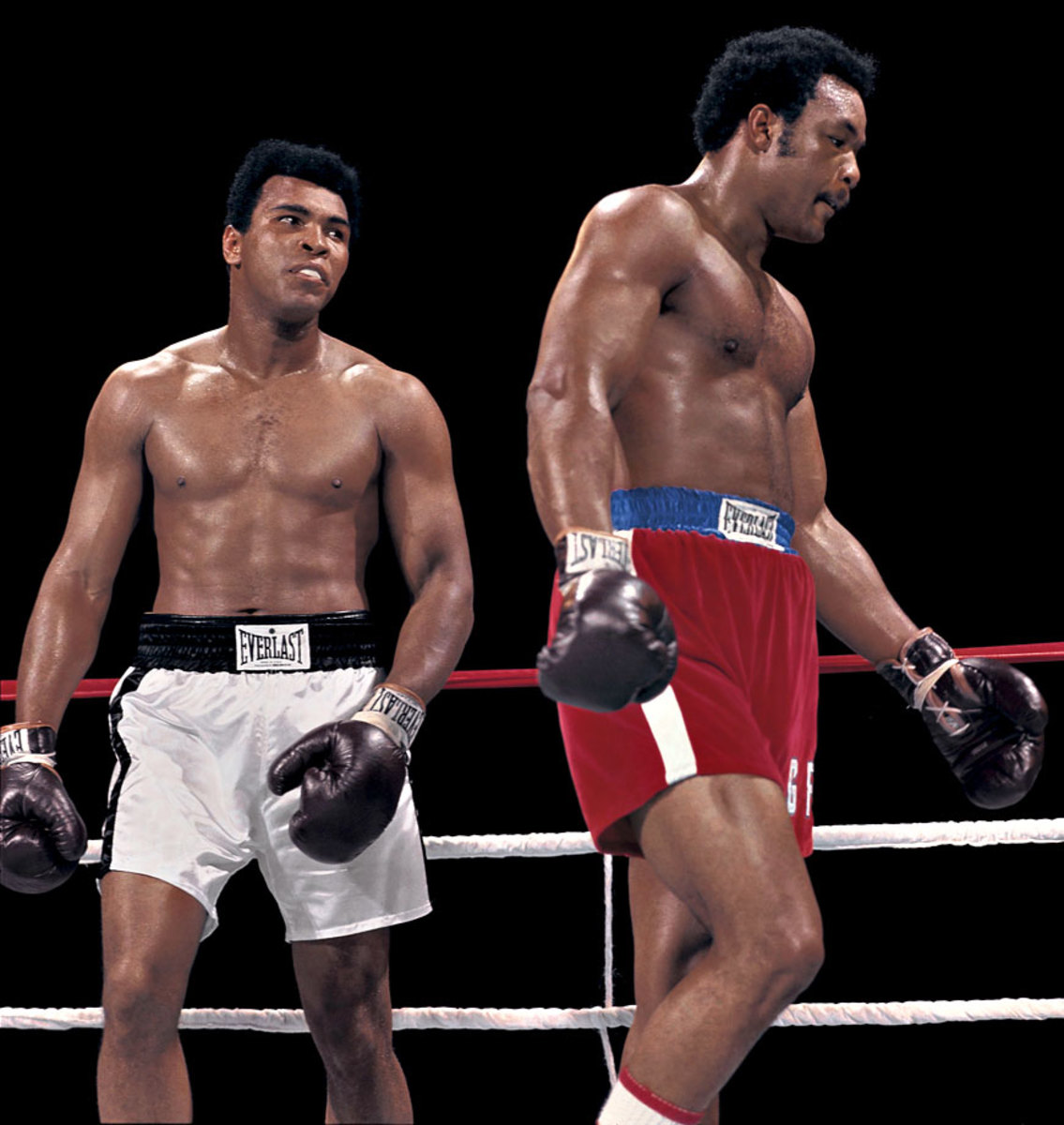
Ali stares at George Foreman during the Rumble in the Jungle. Ali earned his shot at the heavyweight title by defeating Joe Frazier in January 1974, avenging a loss three years earlier.
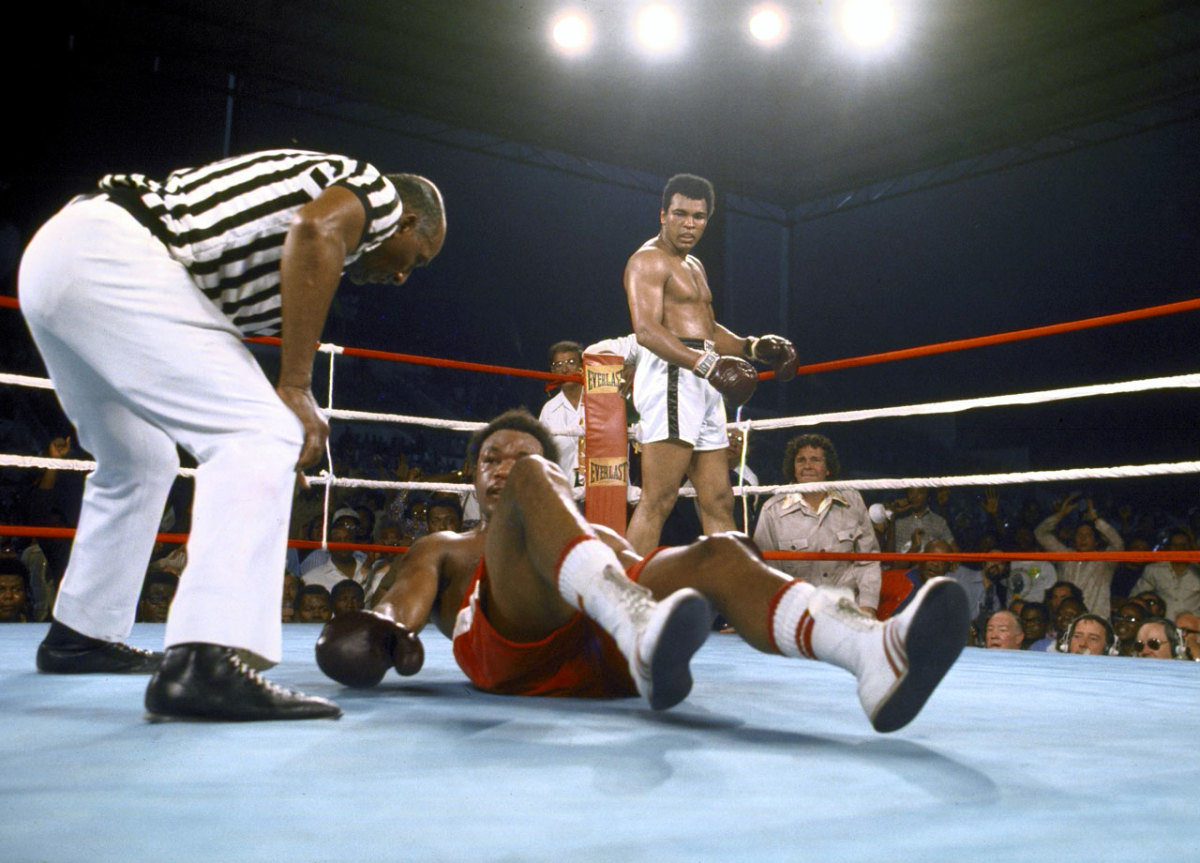
Foreman lies down on the canvas as Ali stands in the background during the Rumble in the Jungle. Ali knocked Foreman down with a five-punch combination in the eighth round, and referee Zack Clayton counted him out.
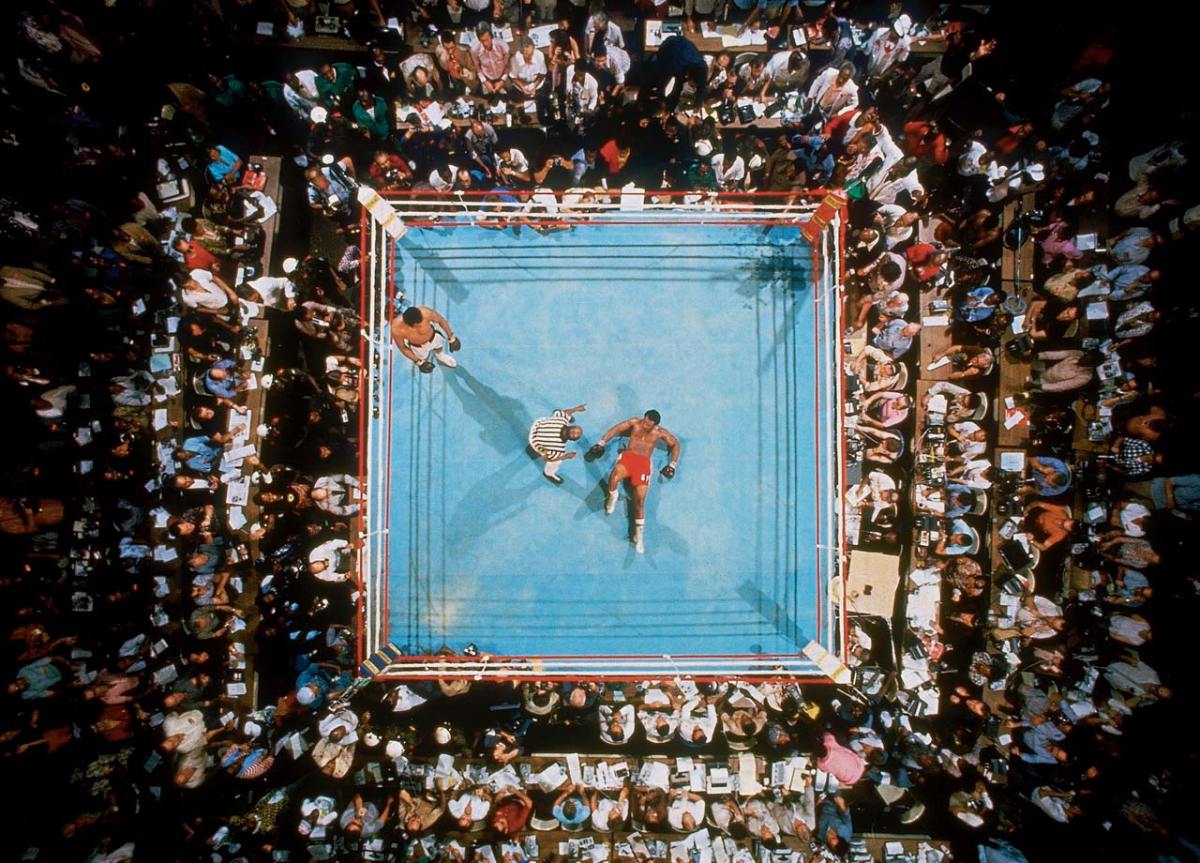
Big George stares at the ceiling as referee Zack Clayton counts him out in the eighth round. The victory made Ali, once again, the heavyweight champion of the world.
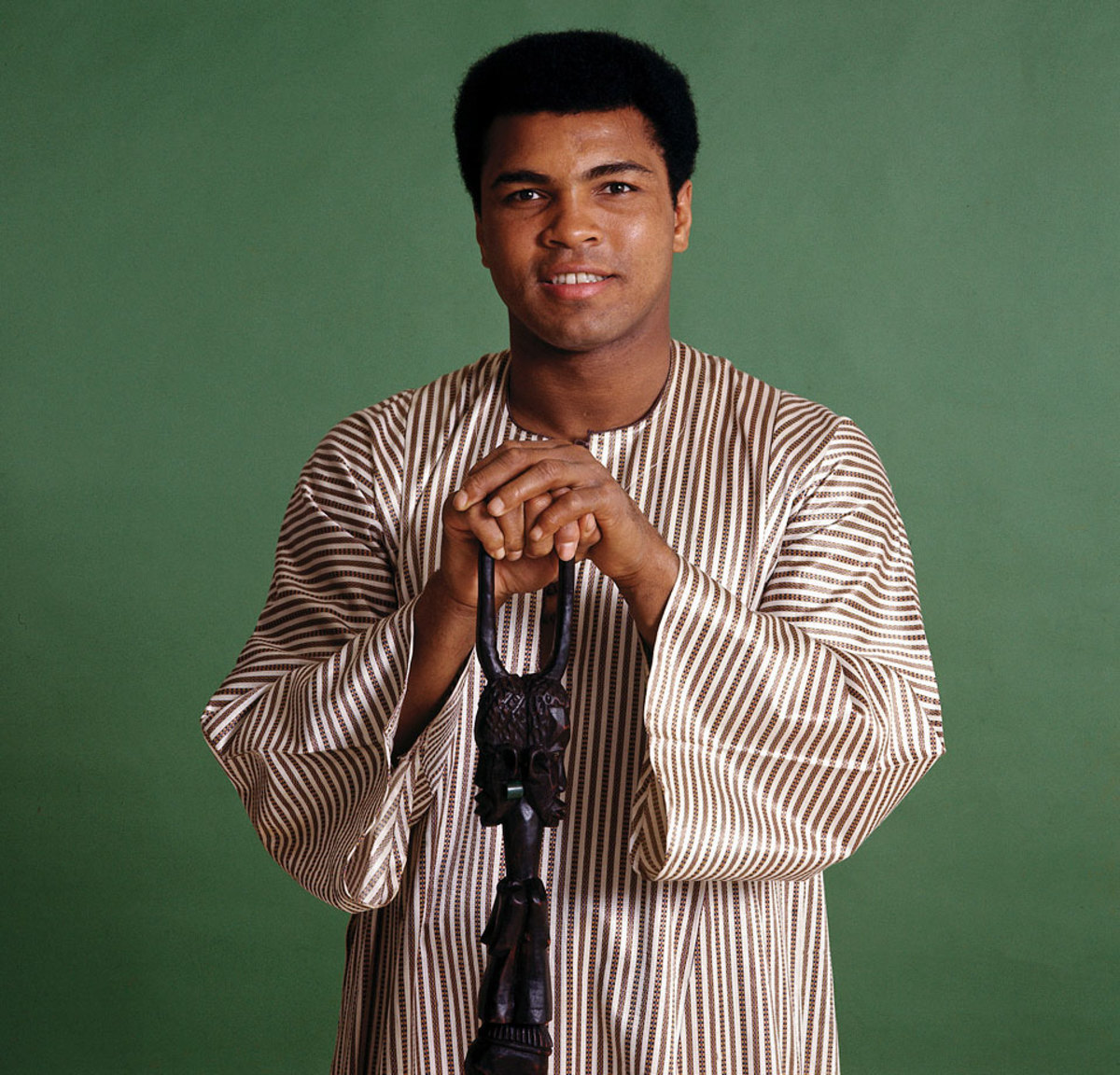
Ali poses for a portrait after being selected as the Sports Illustrated Sportsman of the Year in 1974. Ali wore a dashiki, a men's garment widely worn in West Africa. He also brought the walking stick given to him by Zaire's president.
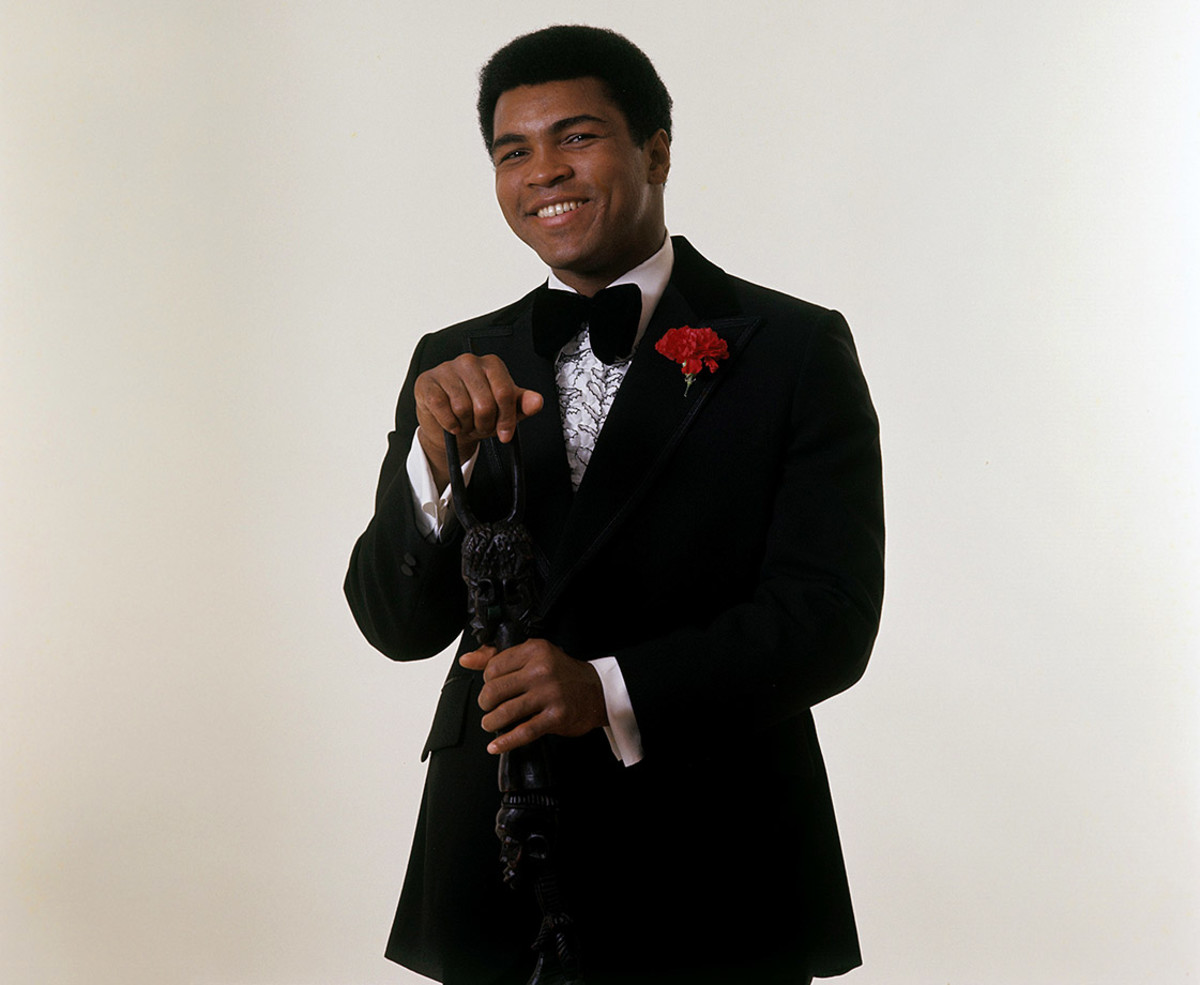
This time Ali wears a tuxedo, but keeps the walking stick, during the November photo shoot for Sports Illustrated's Sportsman of the Year.
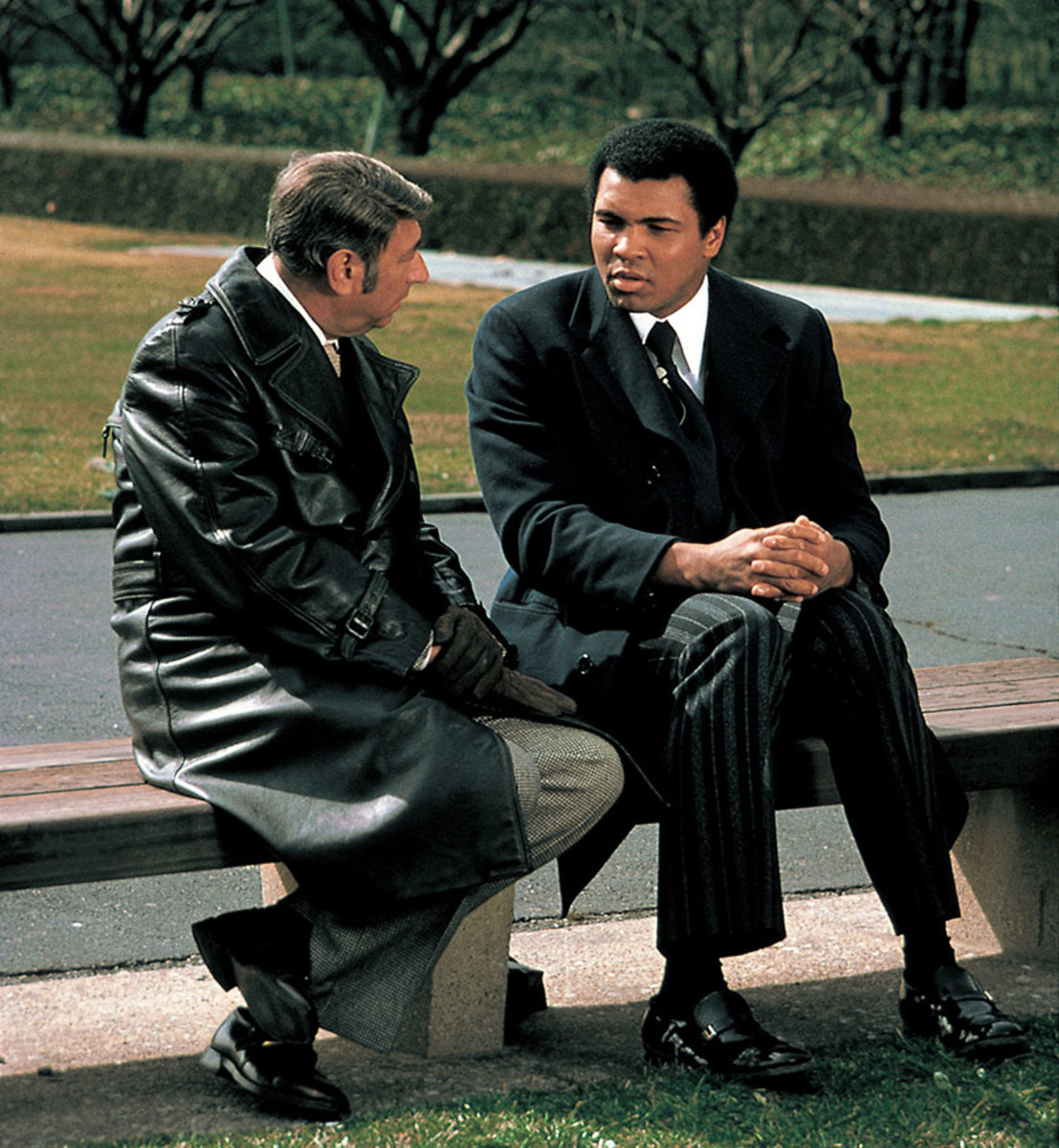
Ali talks with Howard Cosell outside of the United Nations Headquarters for a segment on the Wide World of Sports. Later that day, Ali held a press conference to announce that he would donate part of the proceeds from his fight against Chuck Wepner to help Africans in the Sahel drought.
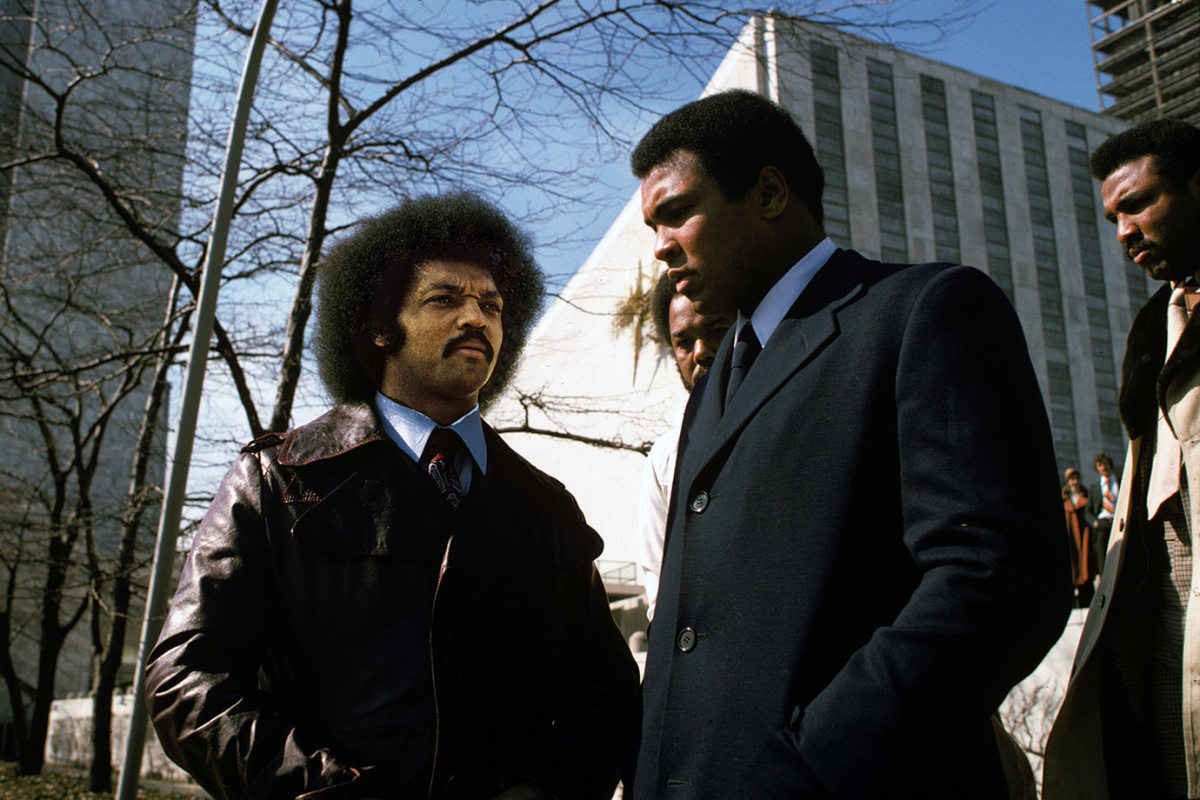
Ali talks with Reverend Jesse Jackson outside of the United Nations Headquarters before a press conference to announce that he would donate part of the proceeds from his fight against Chuck Wepner to help Africans in the Sahel drought.
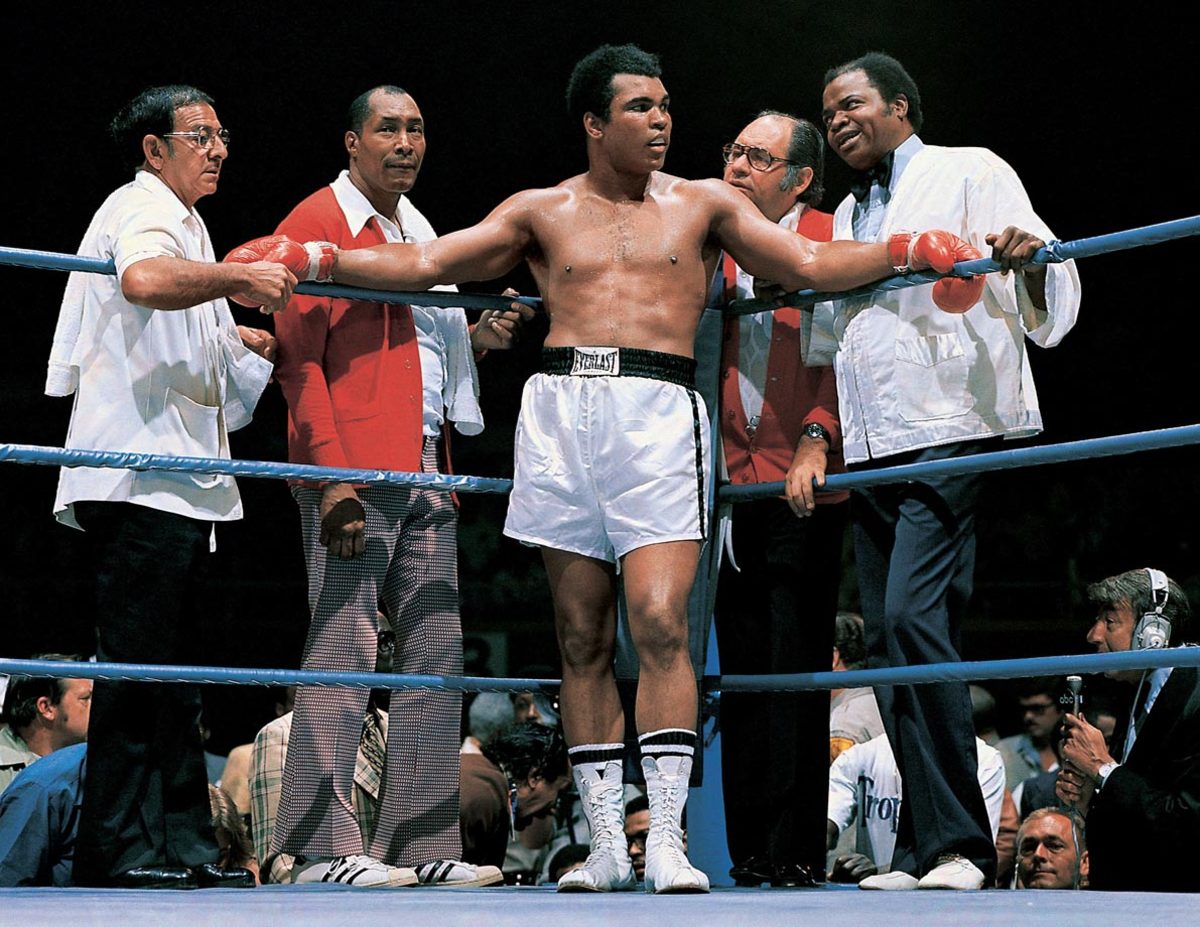
Ali stands with trainer Angelo Dundee, assistant trainer Wali Muhammad, physician Dr. Ferdie Pacheco and assistant trainer Drew Bundini Brown before his bout with Ron Lyle in May 1975. Ali won the fight by technical knockout in the 11th round.
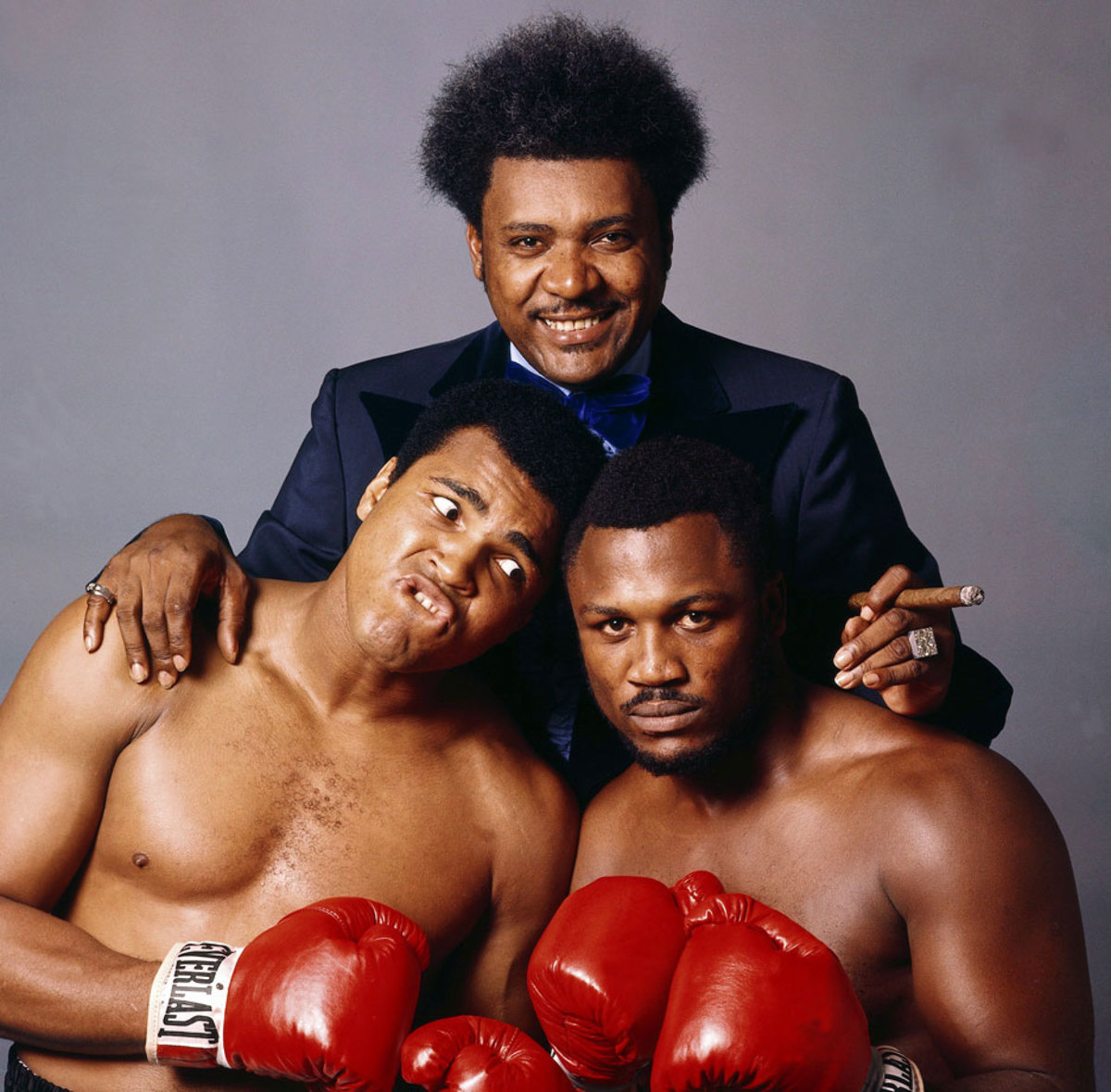
Along with Don King and Joe Frazier, Ali sat for a portrait leading up to the Thrilla in Manila. Ali verbally abused Frazier during the buildup to the fight, telling the media that "it will be a killa and a thrilla and a chilla when I get the gorilla in Manila."
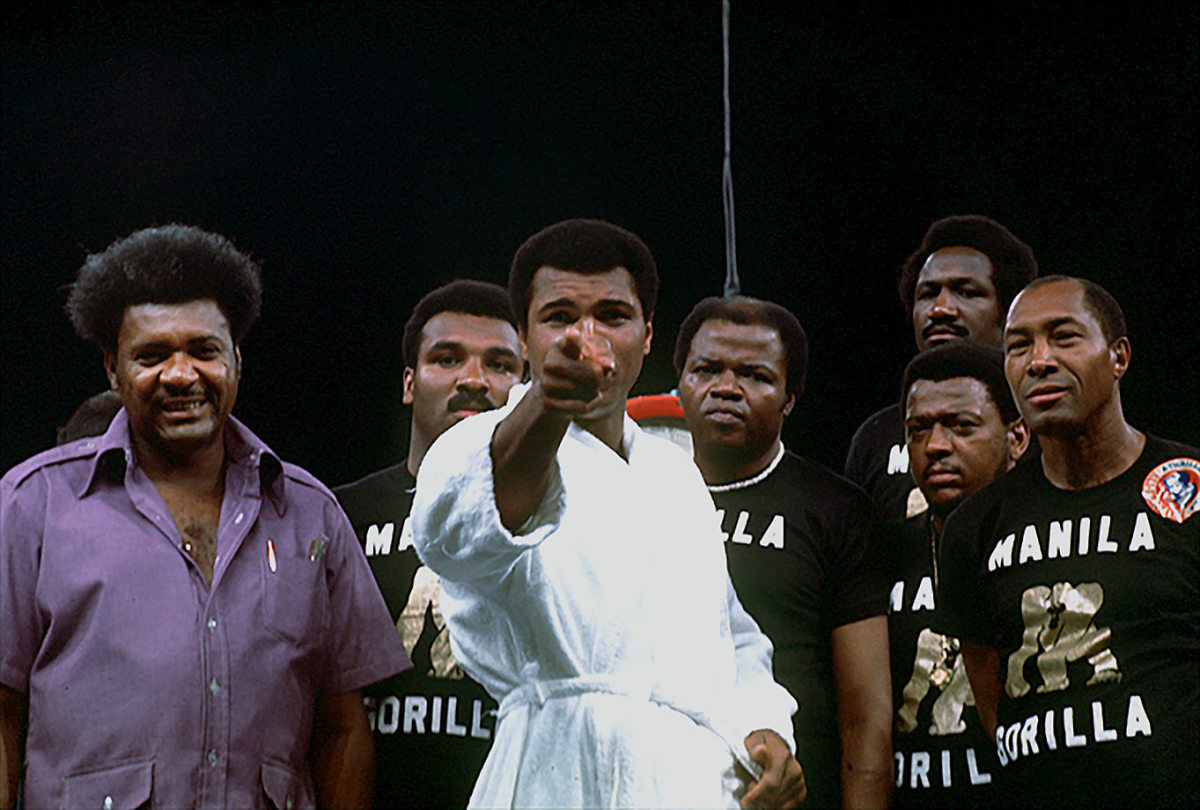
Ali points at the camera with Don King and his training staff behind him before the weigh-in for the Thrilla in Manila in October 1975. Philippine president Ferdinand Marcos offered to sponsor the bout and hold it in Metro Manila to divert attention from the turmoil in the country that had forced the imposition of martial law in 1972.
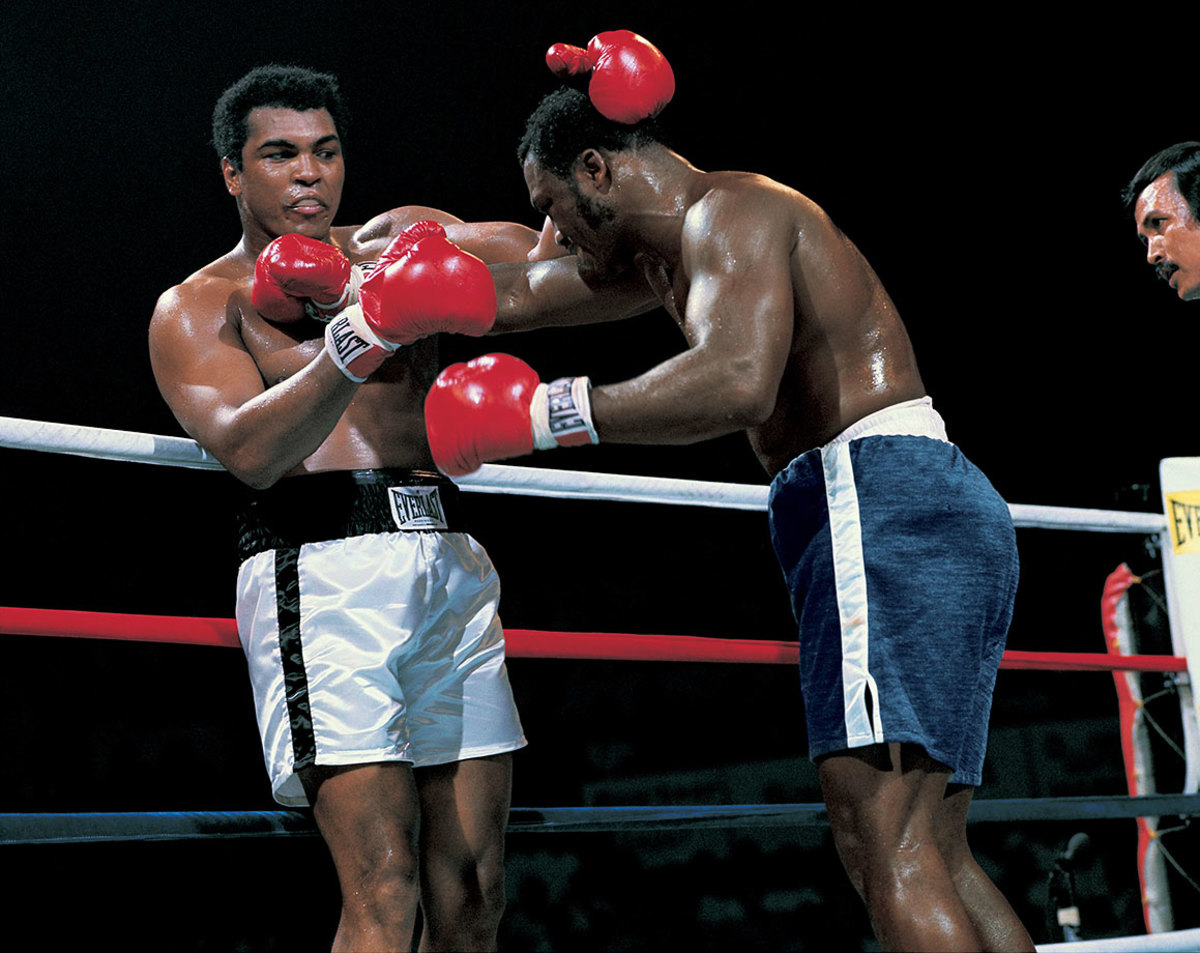
Wrapping up Joe Frazier proved more difficult than Ali expected, having thought Frazier would represent an easy payday and be unable to live up to his billing. The fight turned out to be a brutal affair.
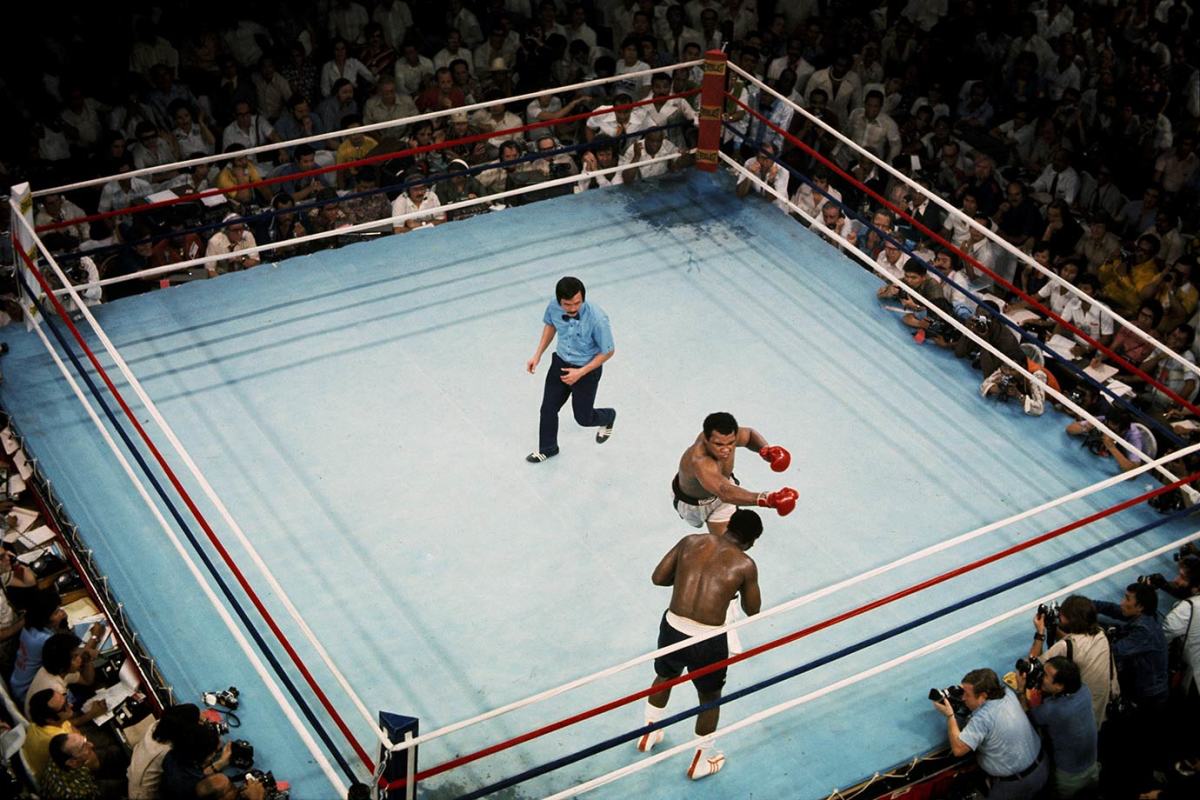
Frazier faces an Ali right hook in their fight in Quezon City, Philippines. The two fighters traded vicious blows during their 14 rounds. "Man, I hit him with punches that'd bring down the walls of a city," Frazier said. Ali withstood the blows to win by TKO in the 15th round.
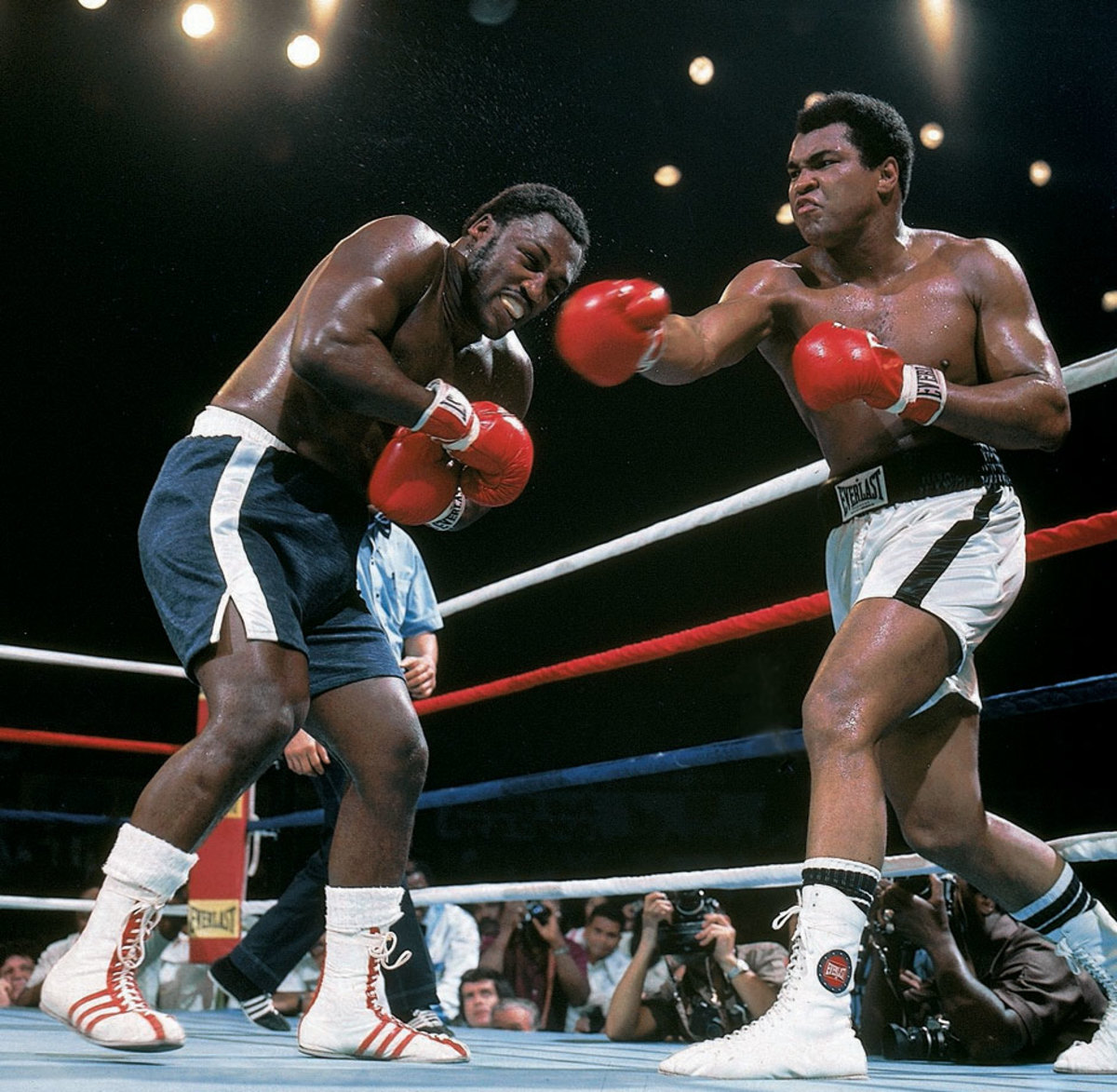
The third fight between Ali and Frazier, Ali won the bruising battle between the two powerful punching heavyweights when Frazier's trainer, Eddie Futch, stopped the fight before the 15th round.
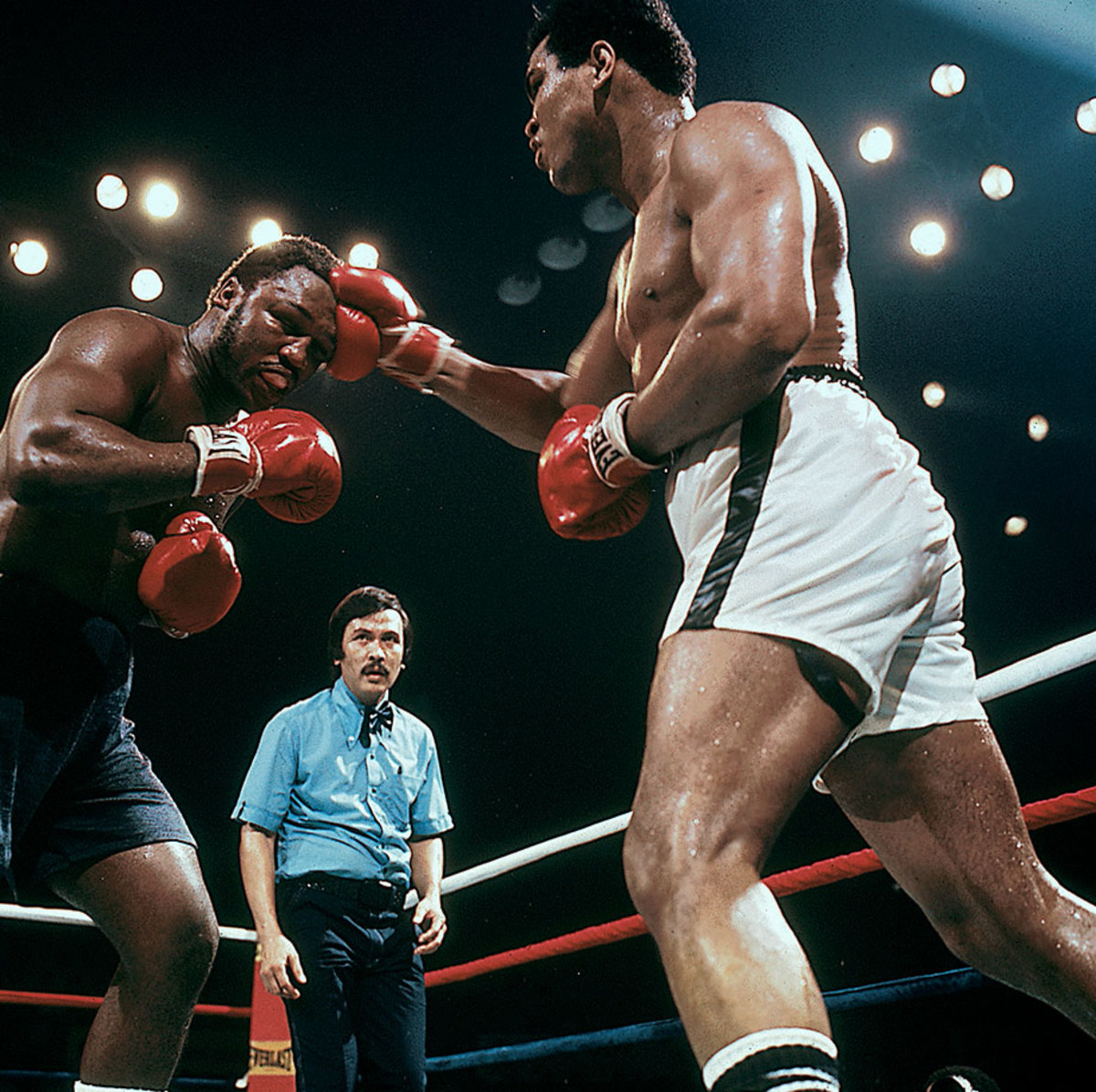
A back and forth exchange, Ali controlled the early rounds of the Thrilla in Manila before Frazier fought back with powerful hooks. Ali finished strong, regaining momentum in the later rounds.
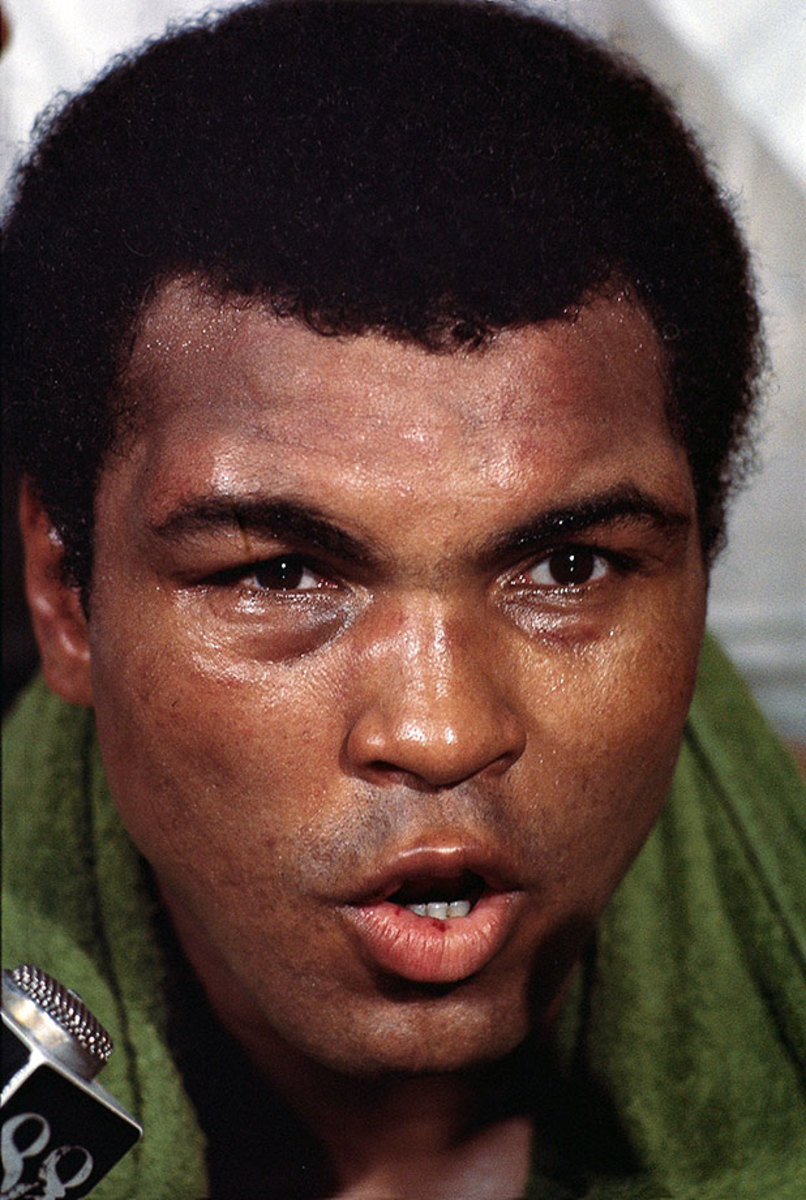
Ali speaks to the press after winning the Thrilla in Manila bout with Frazier.
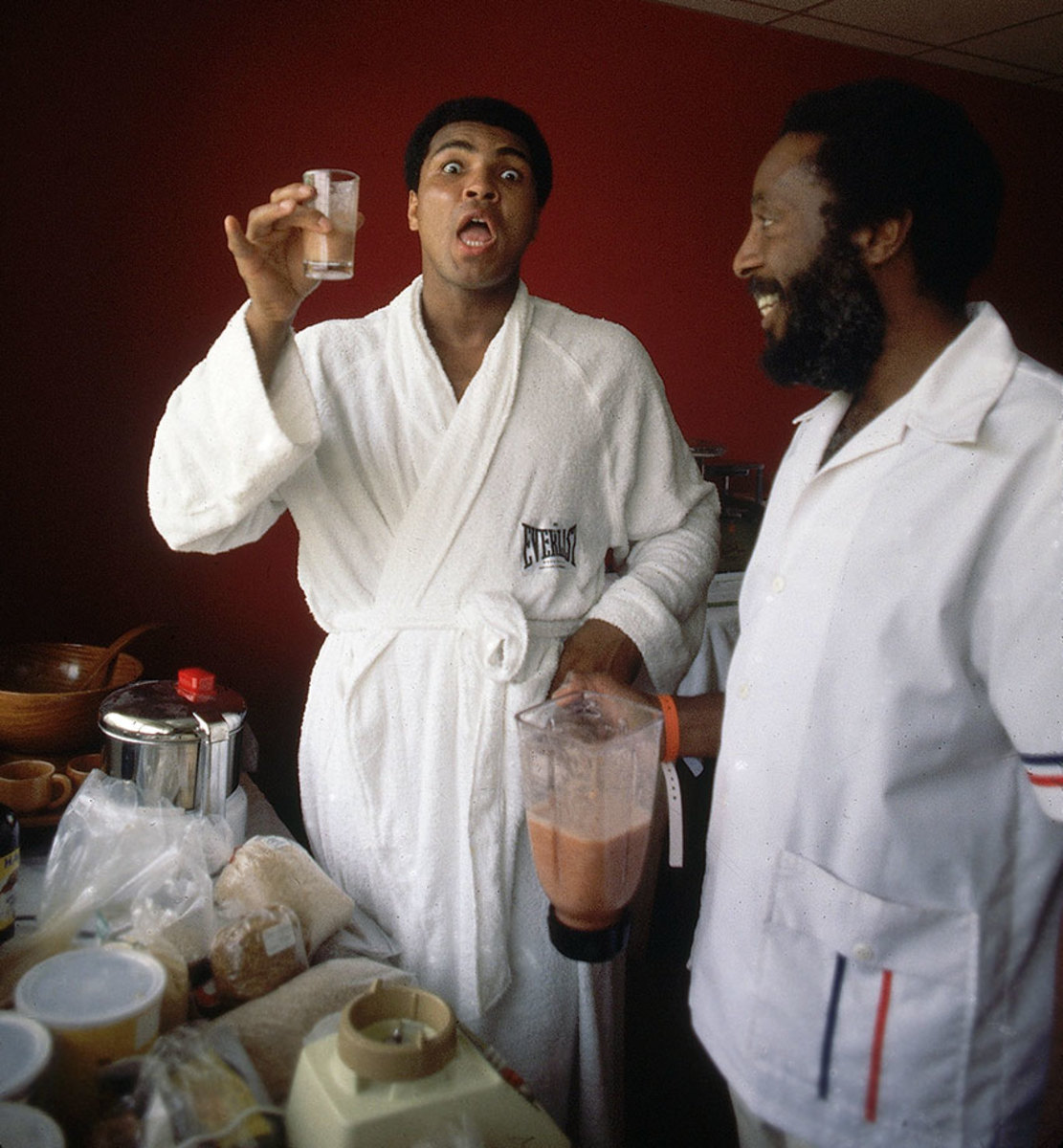
Ali holds a drinking concoction given to him by Dick Gregory, an advocate of a raw fruit and vegetable diet, in 1976.
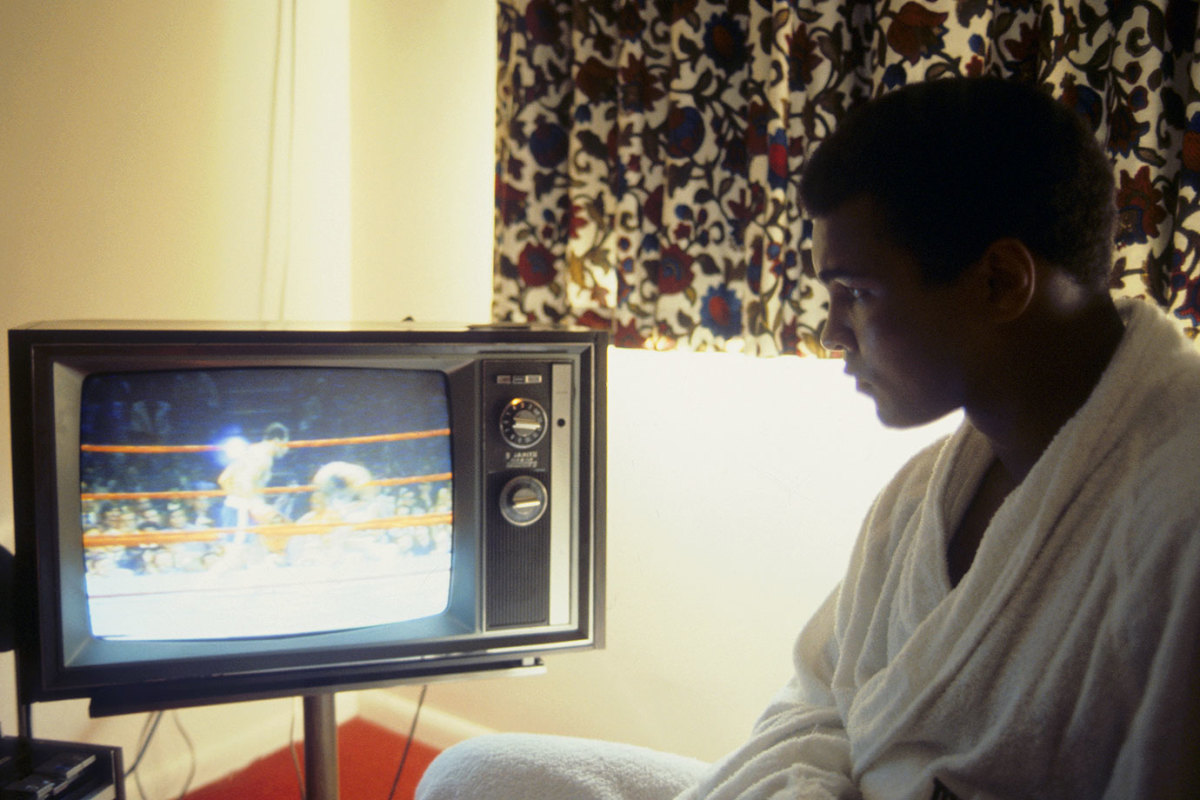
Before his 1976 fight against Ken Norton at Yankee Stadium, Ali watches a fight on television from his hotel room. A police strike at the time of the fight created a dangerous environment outside the stadium that all but eliminated walk-up sales.
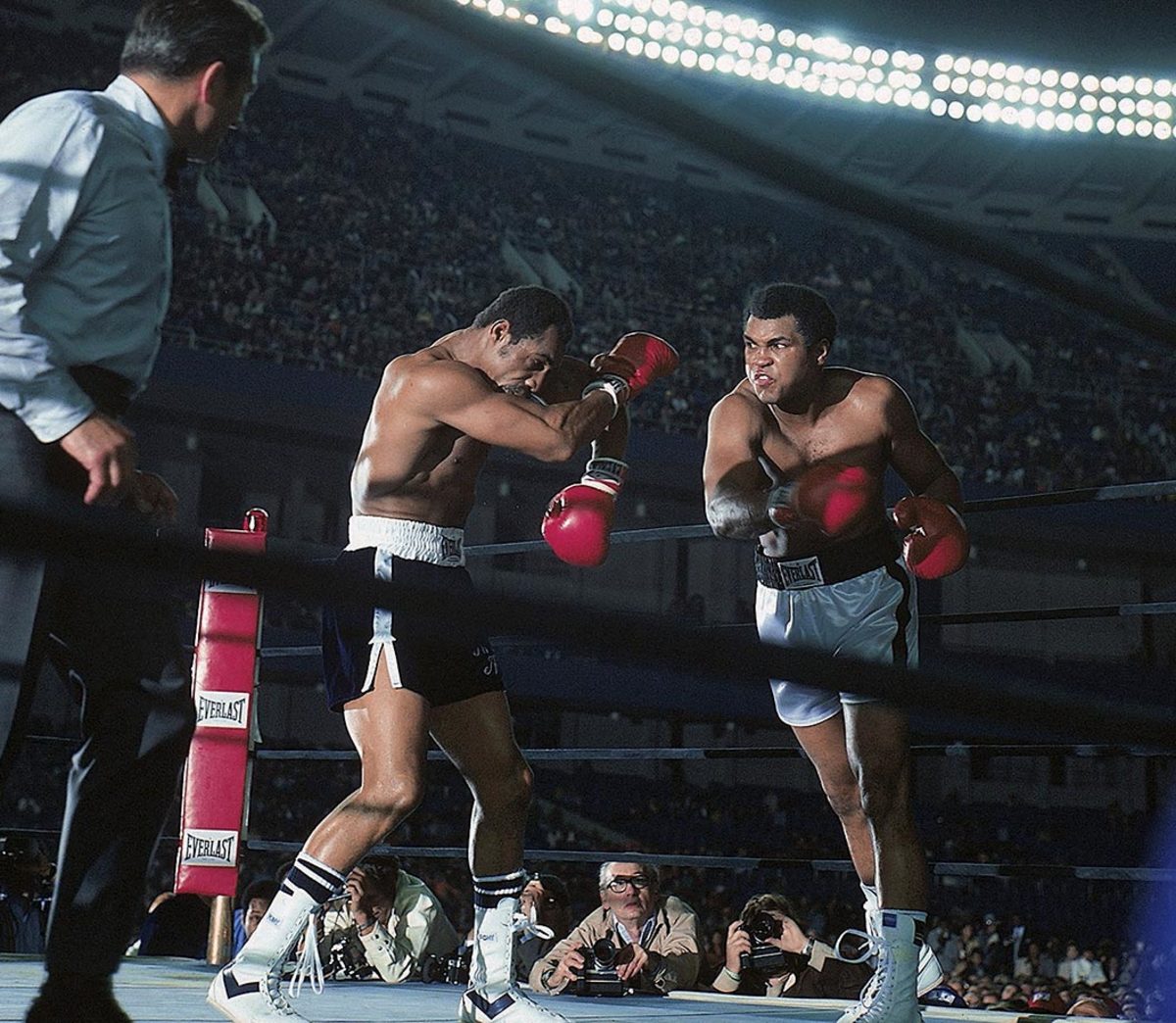
Norton takes a right hook during the heavyweight title fight against Ali. The bout, which Ali won by a unanimous, but controversial, decision, was the last boxing match at Yankee Stadium until 2010.
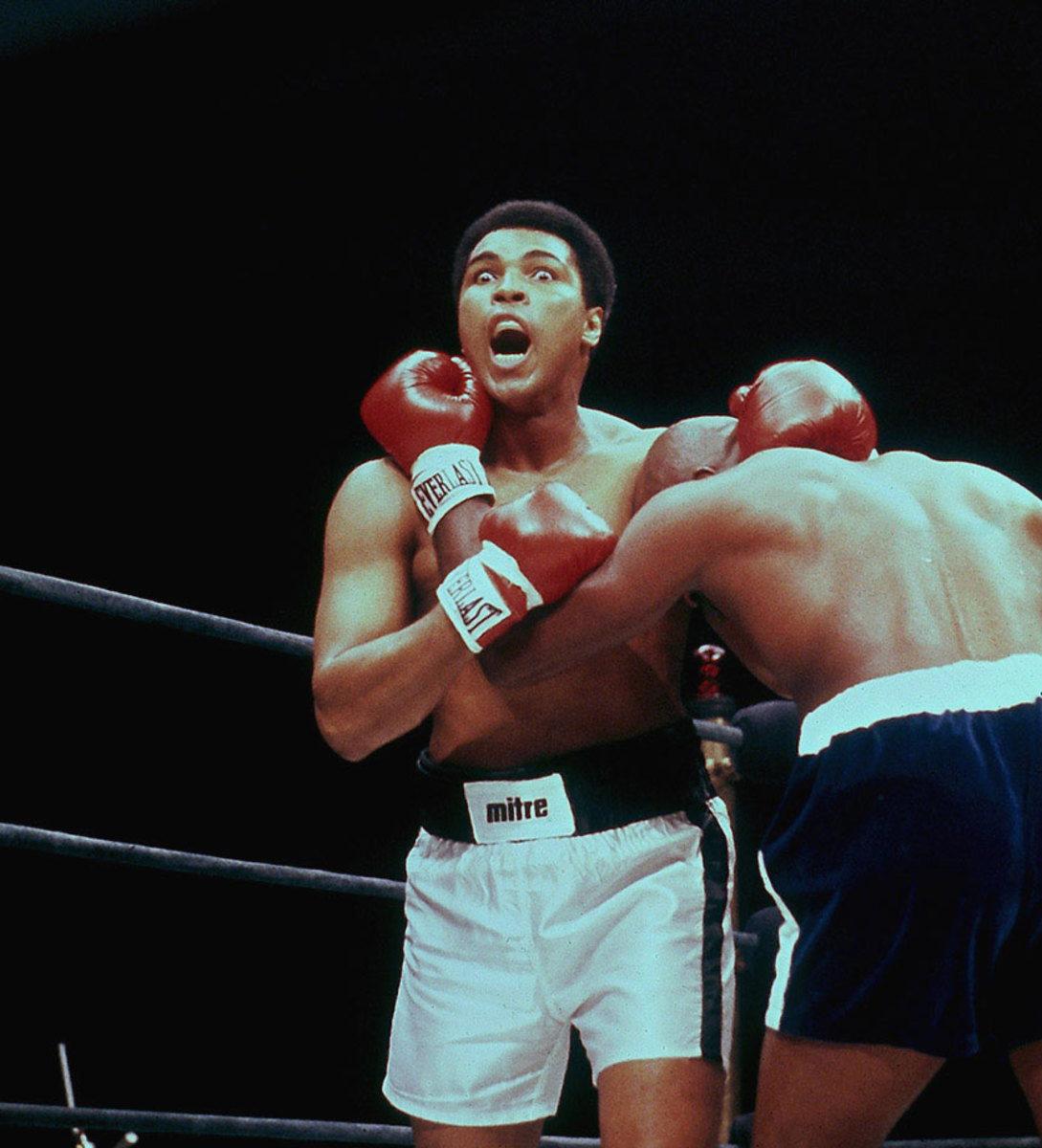
Ali makes a face during his fight with Earnie Shavers in 1977 at Madison Square Garden. Hurt badly by Shavers in the second round, Ali rebounded and outboxed Shavers throughout to build a lead on points before Shavers came on again in the later rounds. Seemingly exhausted going into the 15th and final round, Ali remained victorious by producing a closing flurry that left Shavers wobbling at the bell and the Garden crowd once again in delirium over his Ali magic.
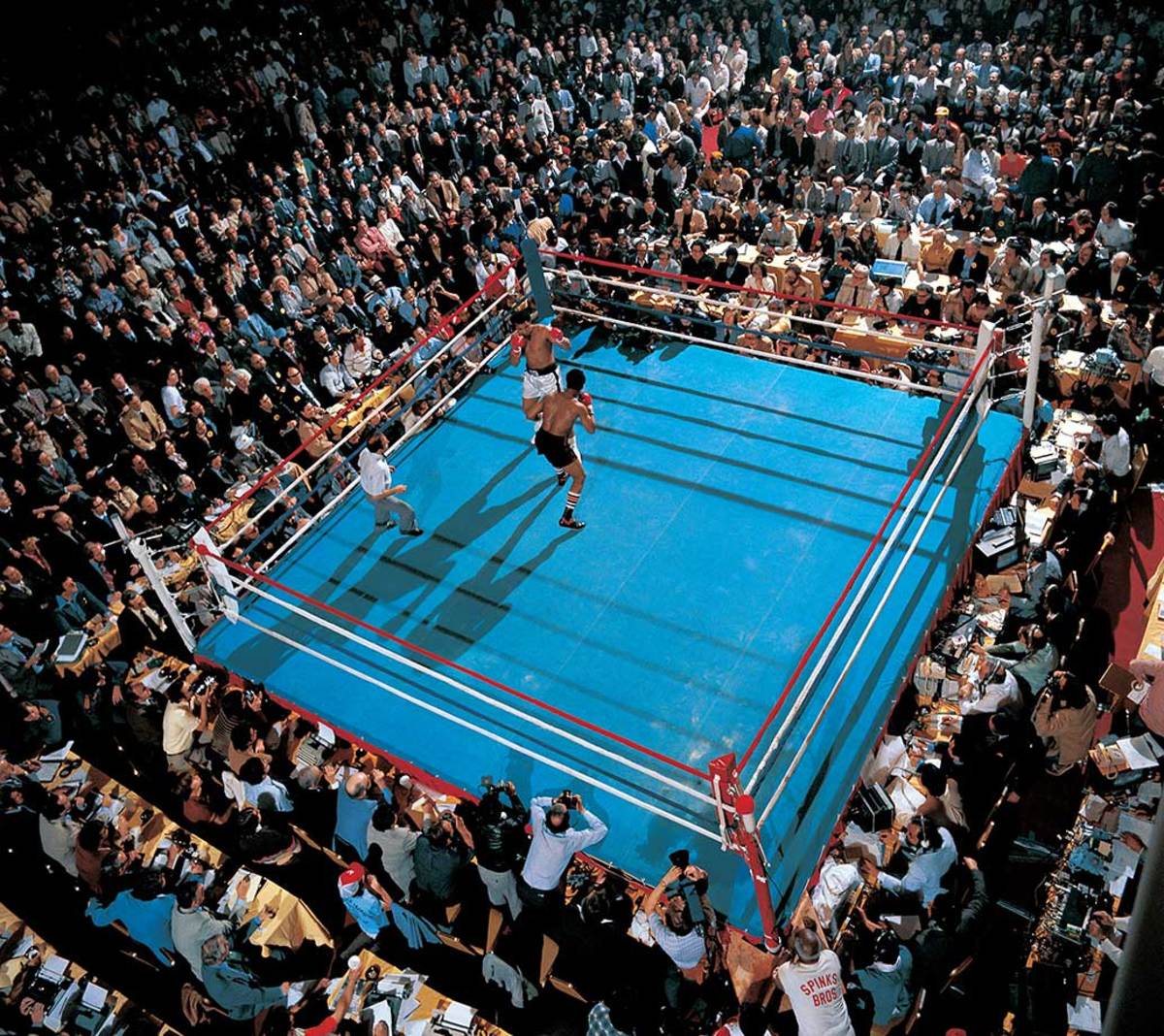
Ali squares off with Leon Spinks at the Las Vegas Hilton Hotel in February 1978. Spinks won the fight in a split decision, ending Ali's 3.5-year reign as the heavyweight champion. It was the only time in Ali's career that he lost his championship title in the ring.
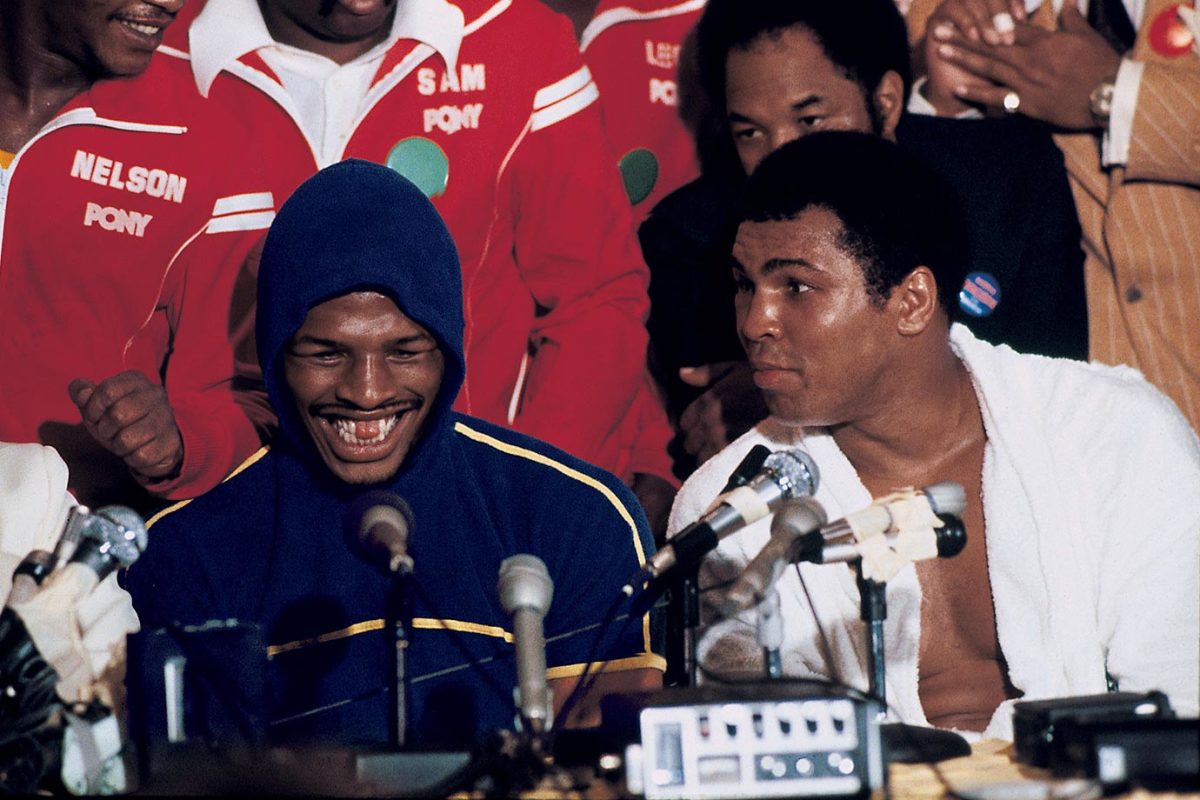
Leon Spinks took center stage over Ali at the press conference after their fight. The victorious Spinks and his gap-toothed grin were featured on the Feb. 19, 1978 cover of Sports Illustrated.
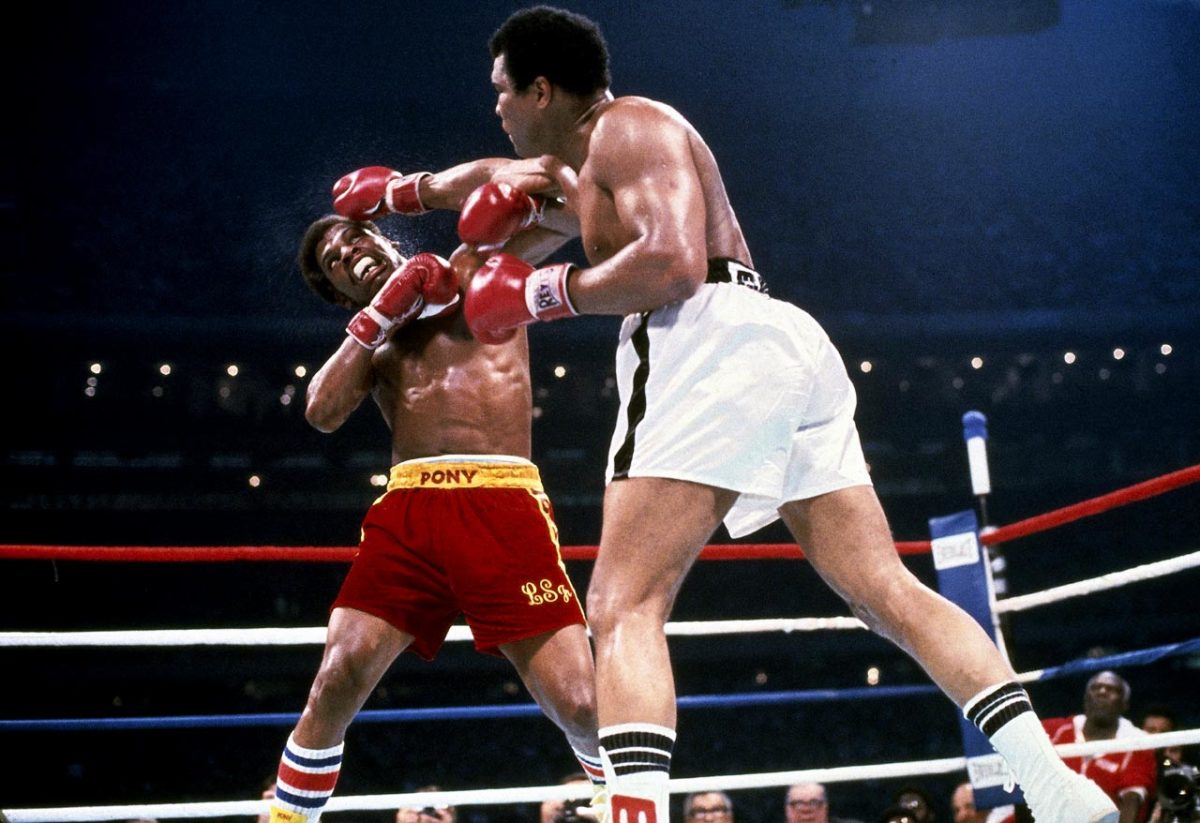
Ali lands a straight right hand to the head of Spinks in the rematch of their title bout in 1978. Ali won on a 15 round decision.
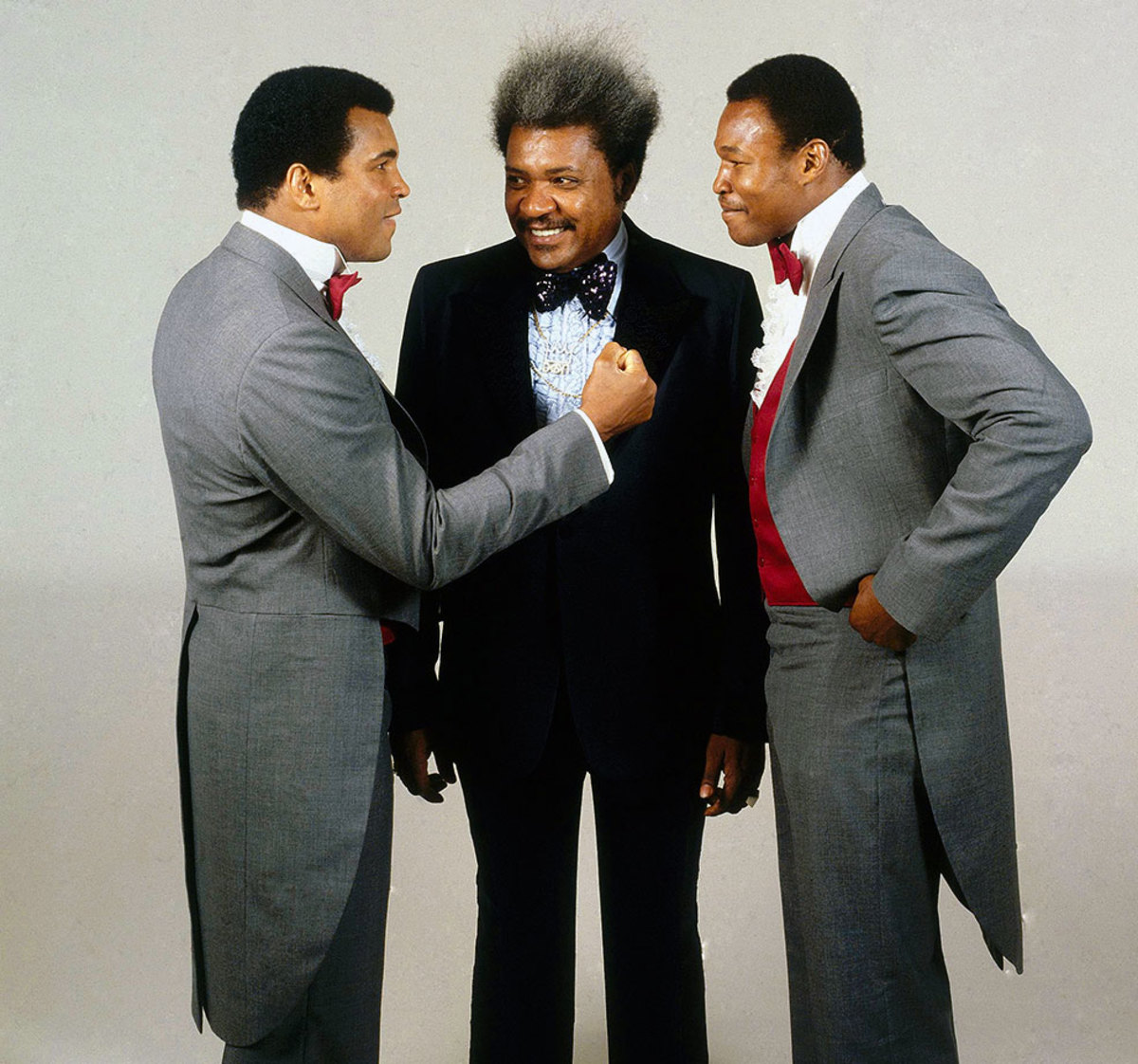
Don King pulled the strings again when Ali faced Larry Holmes before their November 1980 fight. King became a key figure in Ali's career, promoting his biggest fights, the Thrilla in Manila and the Rumble in the Jungle.
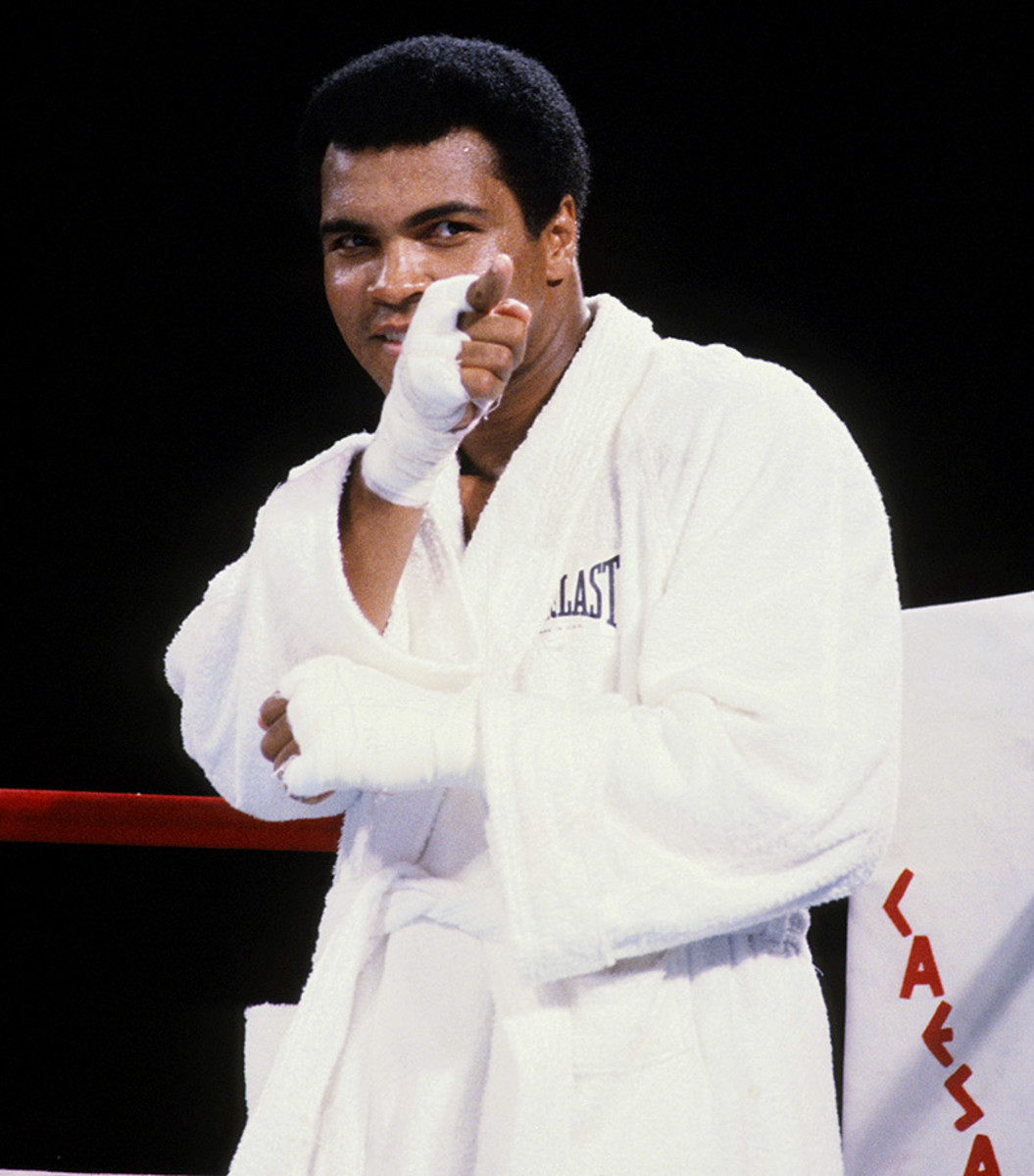
Ali points at Larry Holmes before their bout at Caesars Palace in 1980.
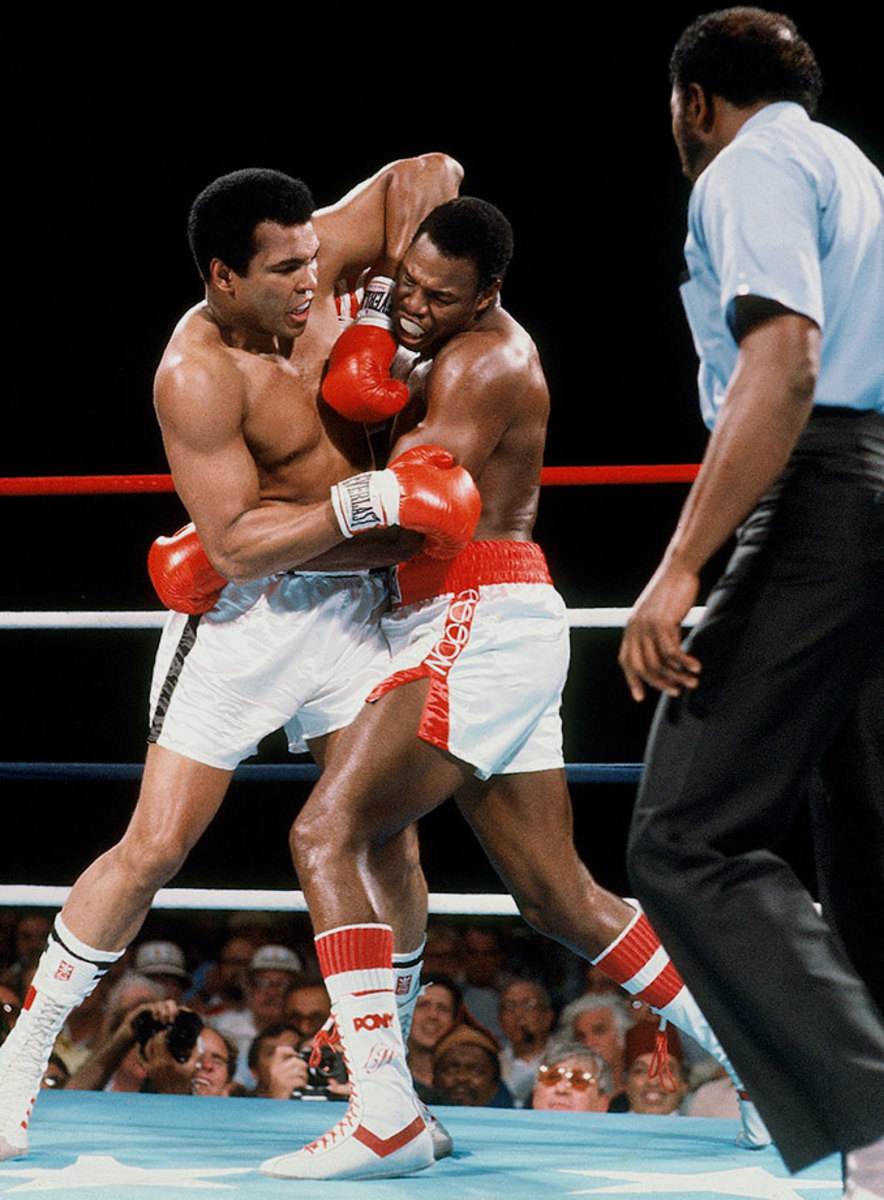
Ali grapples with Holmes during their bout in 1980. Trainer Angelo Dundee stopped the fight in the 11th round, marking the fight as Ali's only career loss by knockout.
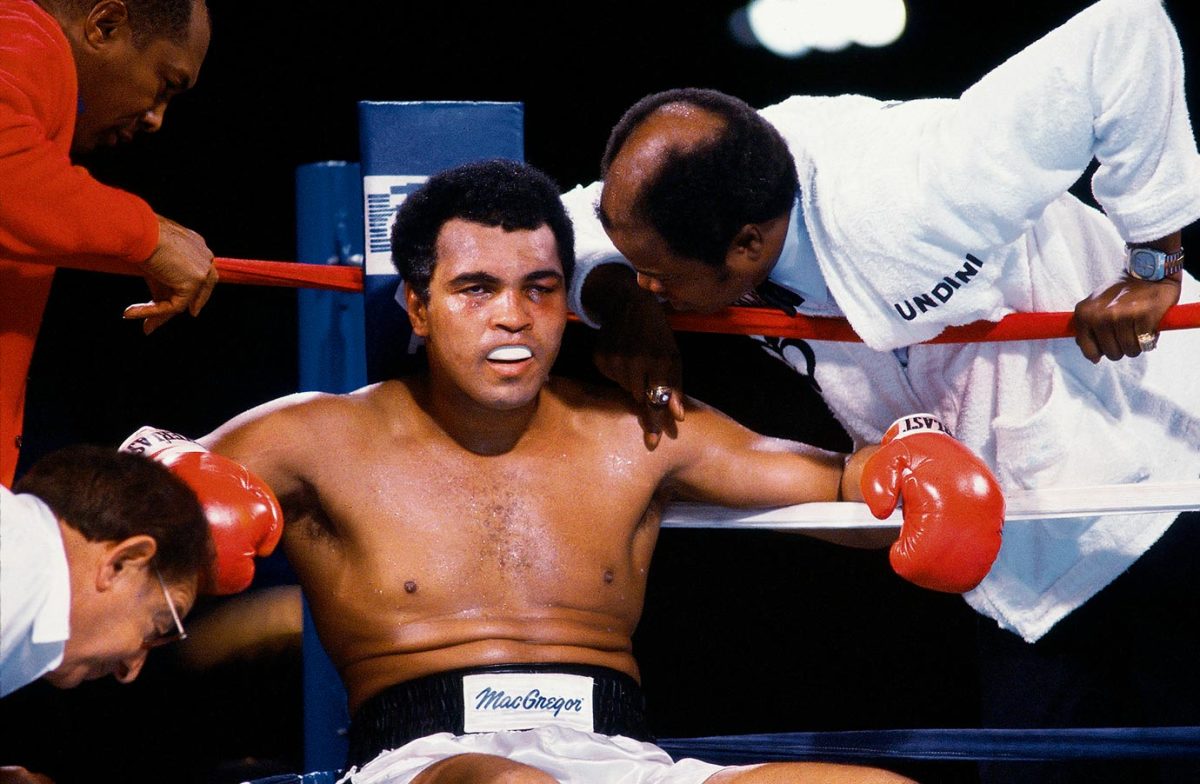
Drew Bundini Brown leans in to speak to Ali, who returned to fight Holmes after a brief retirement. By this time, Ali had already begun developing a vocal stutter and trembling hands and taken thyroid medication to lose weight that left him tired and short of breath.
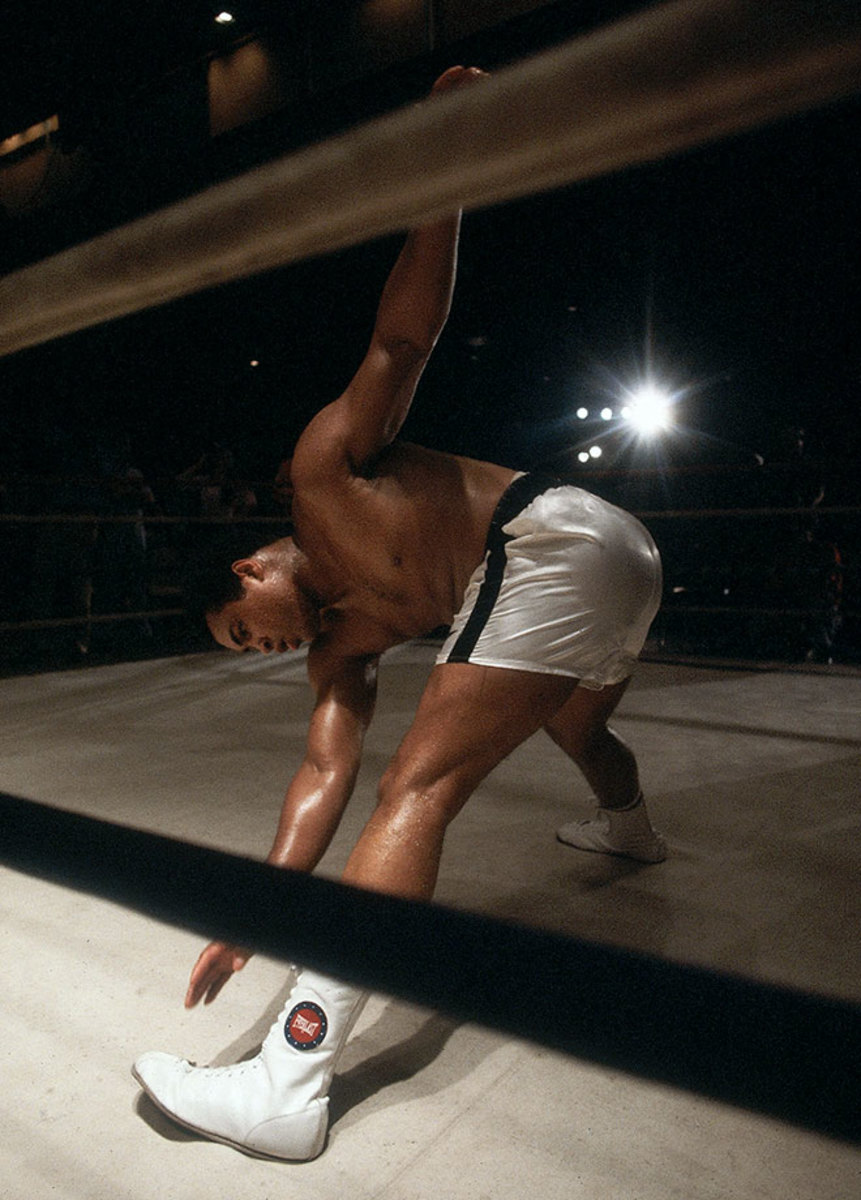
Ignoring pleas for his retirement, Ali stretches before a fight against Trevor Berbick in Nassau, Bahamas. Ali lost to Berbick in a unanimous decision and retired after the bout, the 61st of his career.
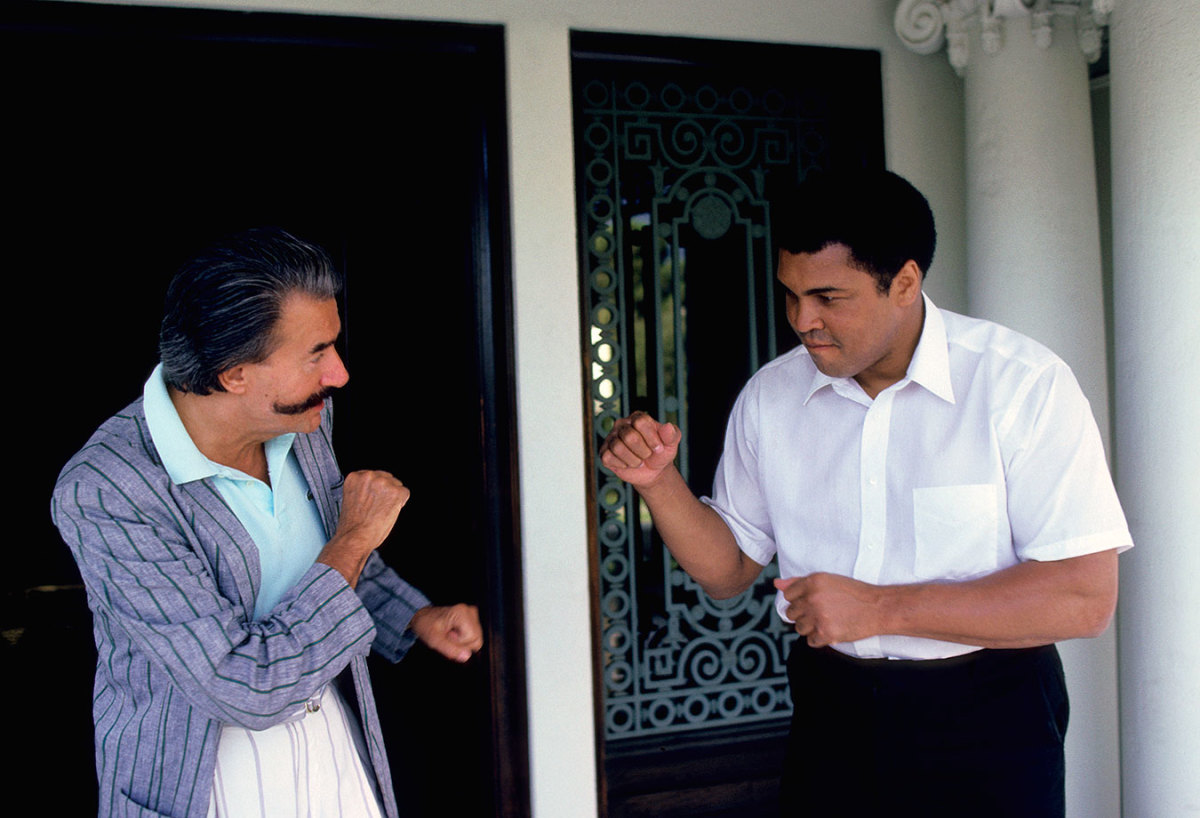
Ali pretends to spar with artist LeRoy Neiman at his home in Los Angeles. Neiman met Ali in 1962 and made many paintings and sketches from throughout Ali's life.
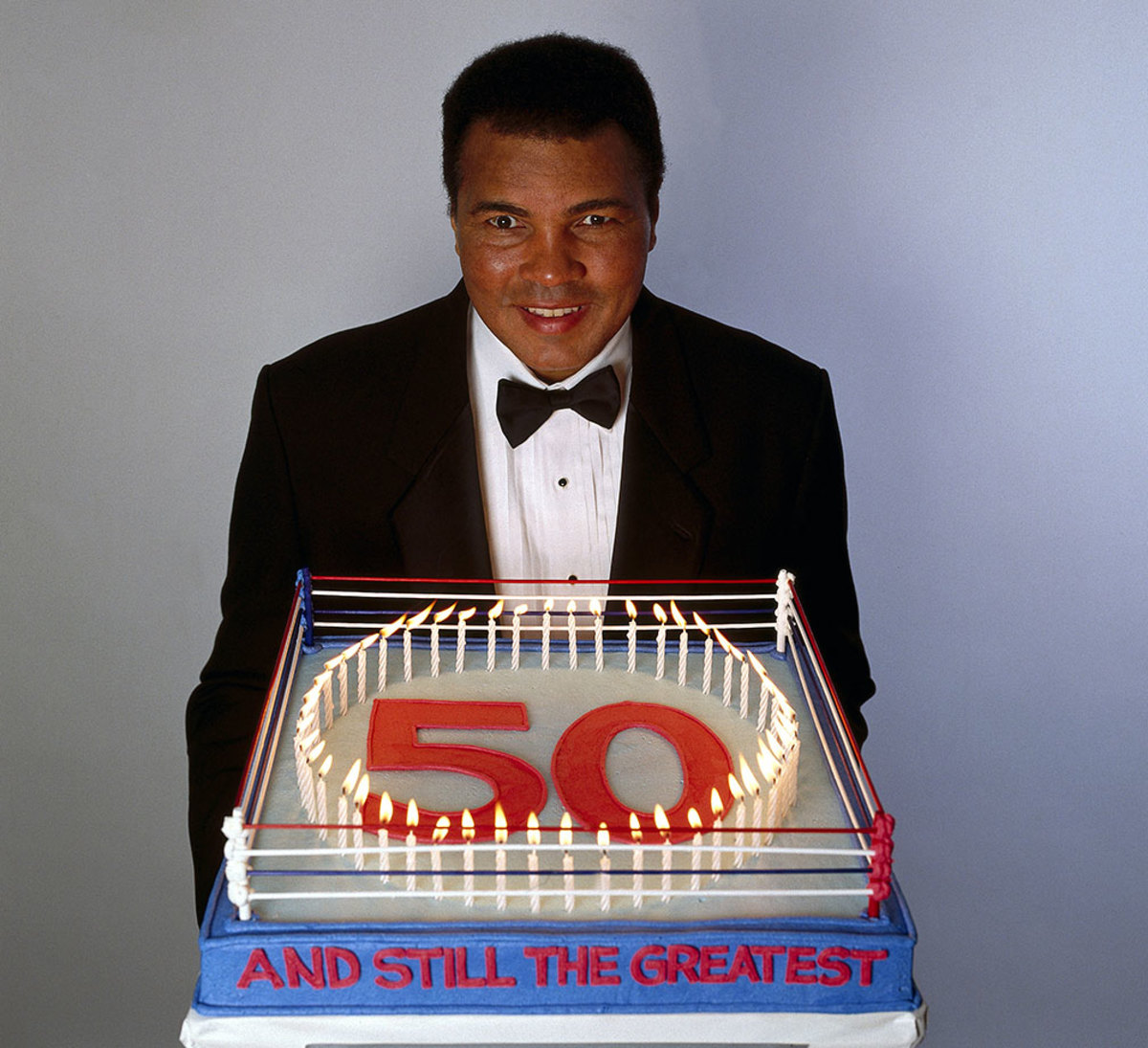
Cake in hand, Ali poses for a 50th birthday portrait in 1991. Although diagnosed with Parkinson's syndrome seven years earlier, Ali was still active, traveling to Iraq during the Gulf War to meet with Saddam Hussein in an attempt to negotiate the release of American hostages.
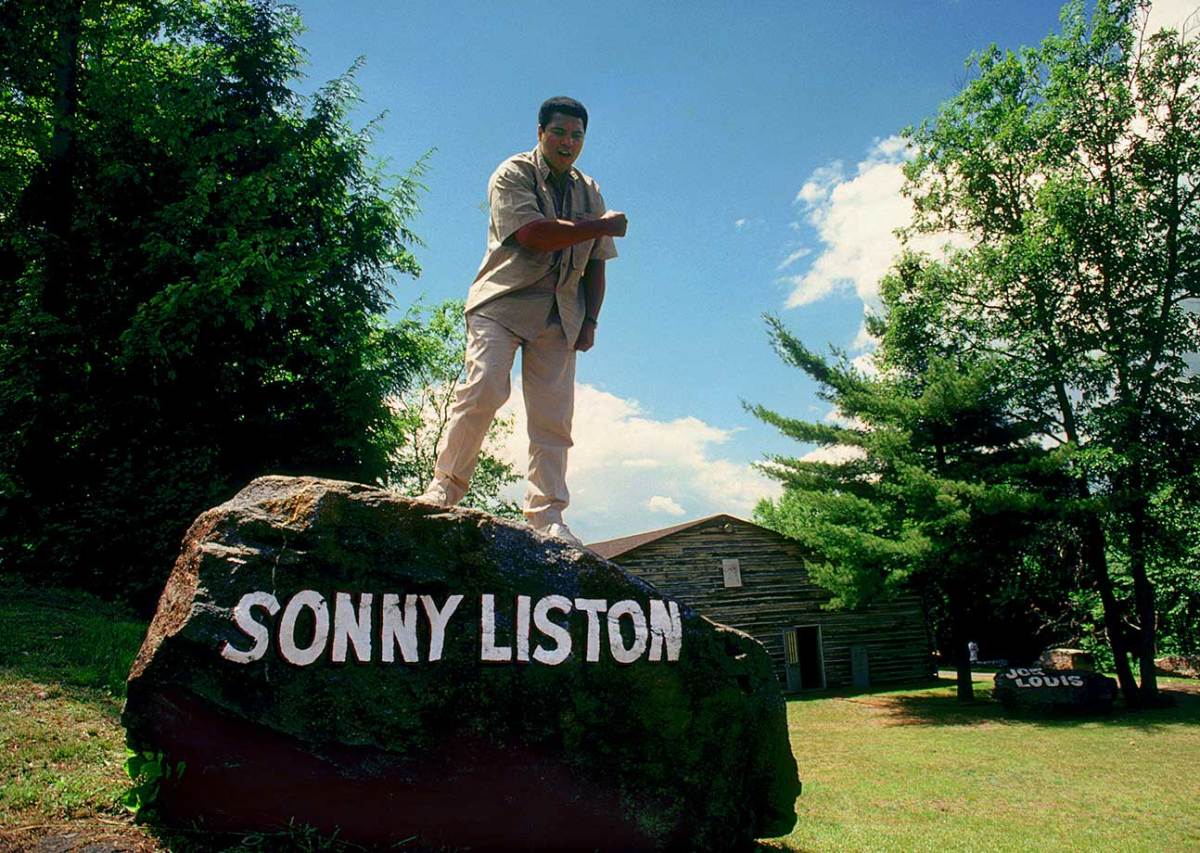
The same year, Ali stands atop of the Sonny Liston rock at his old training camp cabin. Ali and his father painted the names of famous boxers he admired on 18 boulders at the camp.
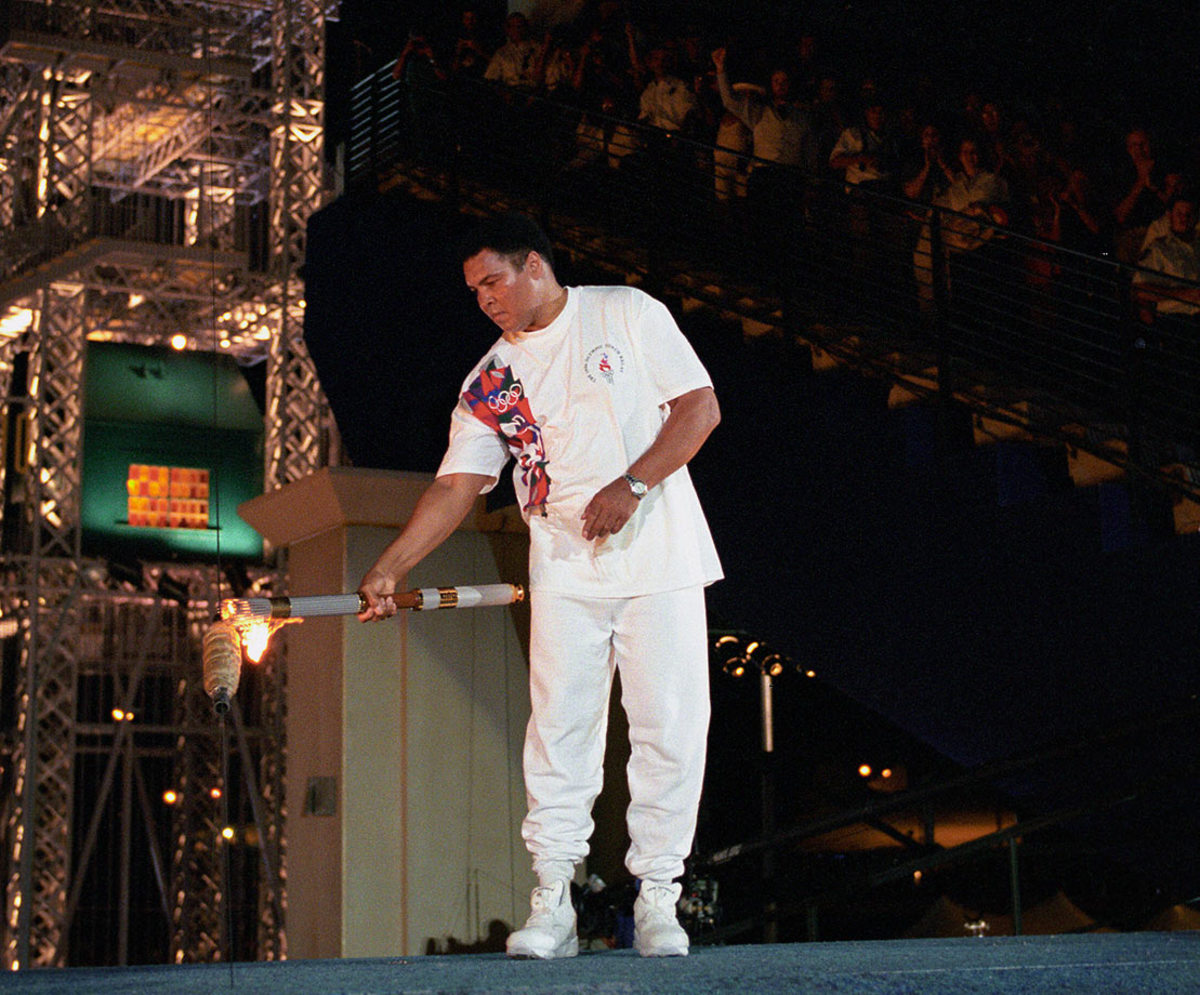
Ali carries the Olympic torch inside Centennial Olympic Stadium at the 1996 Atlanta Olympics. Despite trembling hands, Ali had the honor to light the Olympic flame in the stadium.
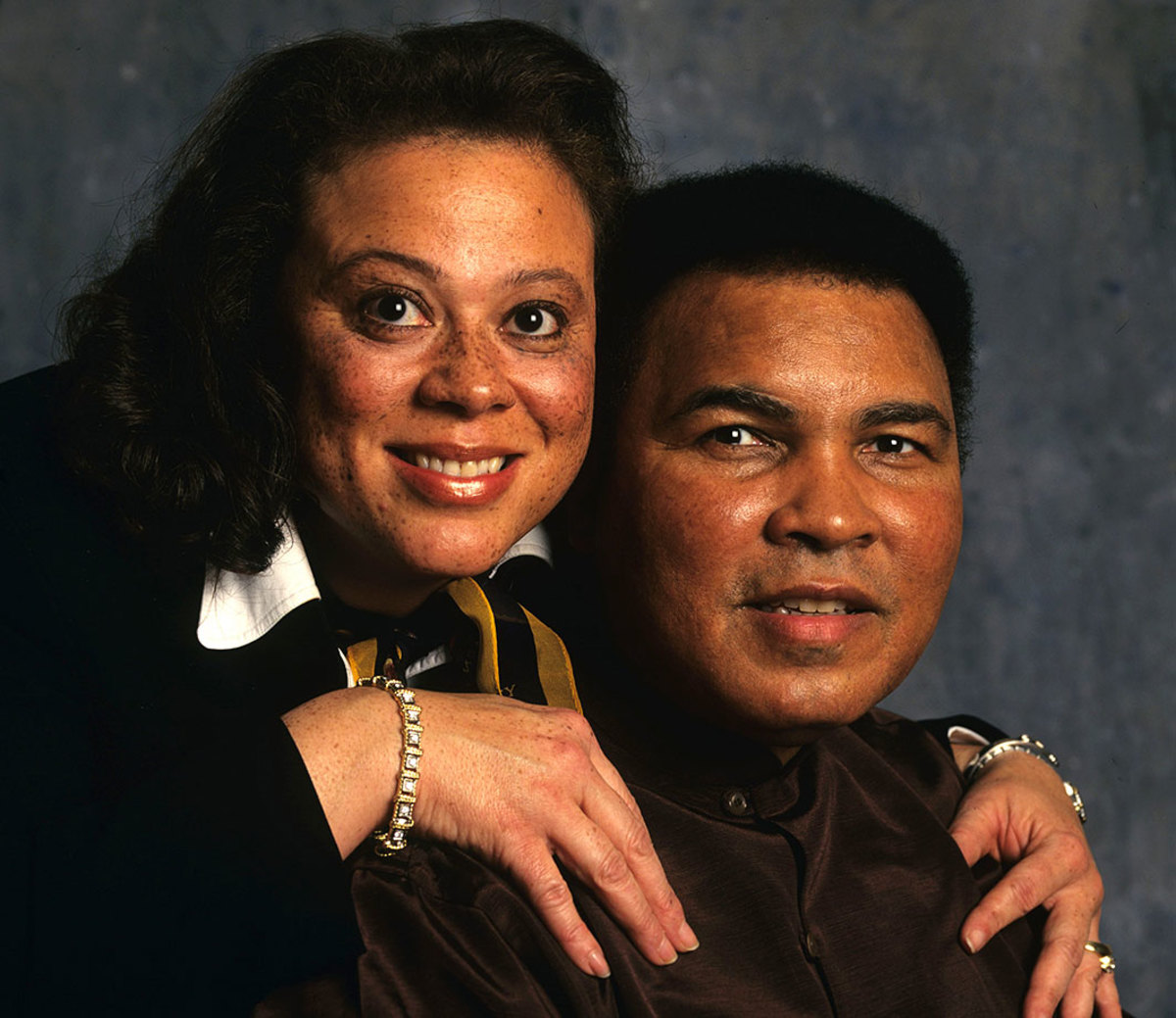
Husband and wife pose for a portrait during a photo shoot in 1997. Muhammad and Lonnie married in 1986 and have an adopted son together, Asaad Amin Ali.
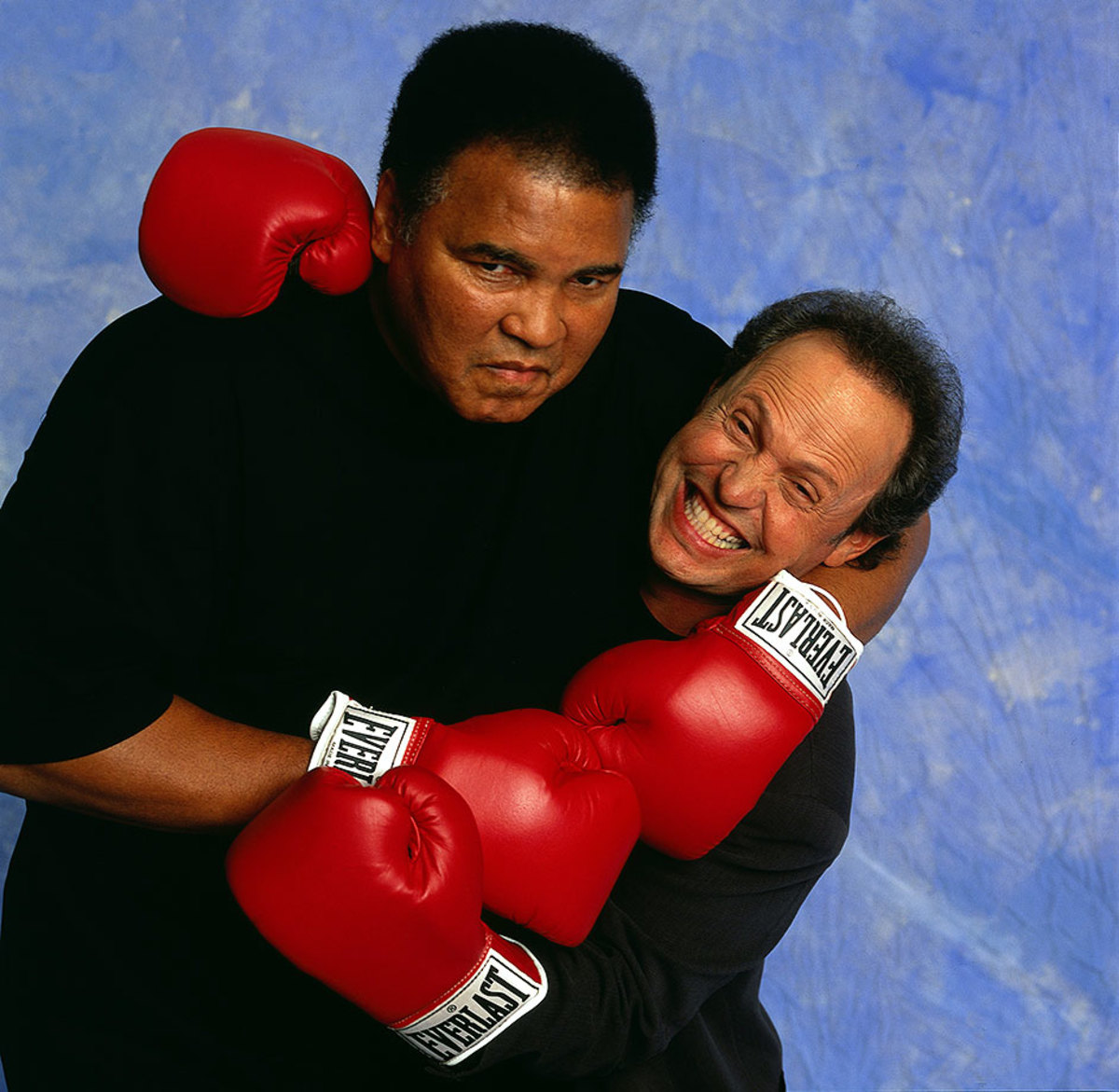
Ali messes around with actor Billy Crystal during a photo shoot in 2000. Crystal's impression of Ali was notorious, and he performed at a tribute to the boxer on his 50th birthday in December 1991.
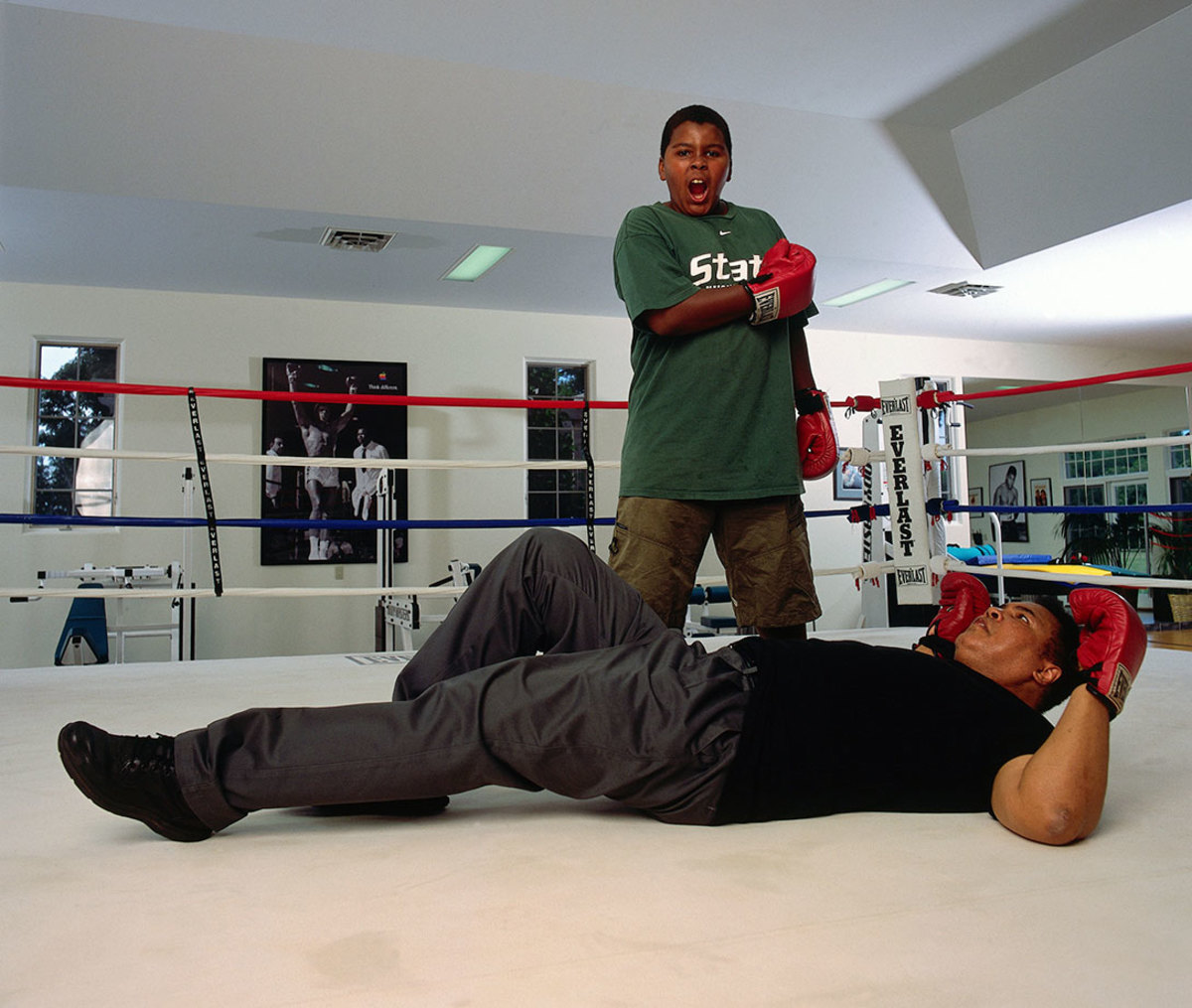
Ali lies on the canvas as his son, Assad Amin Ali, stands over him invoking memories of Ali's victory over Sonny Liston during a photo shoot in the gym at his farm on Kephart Road near Berrien Springs in 2001.
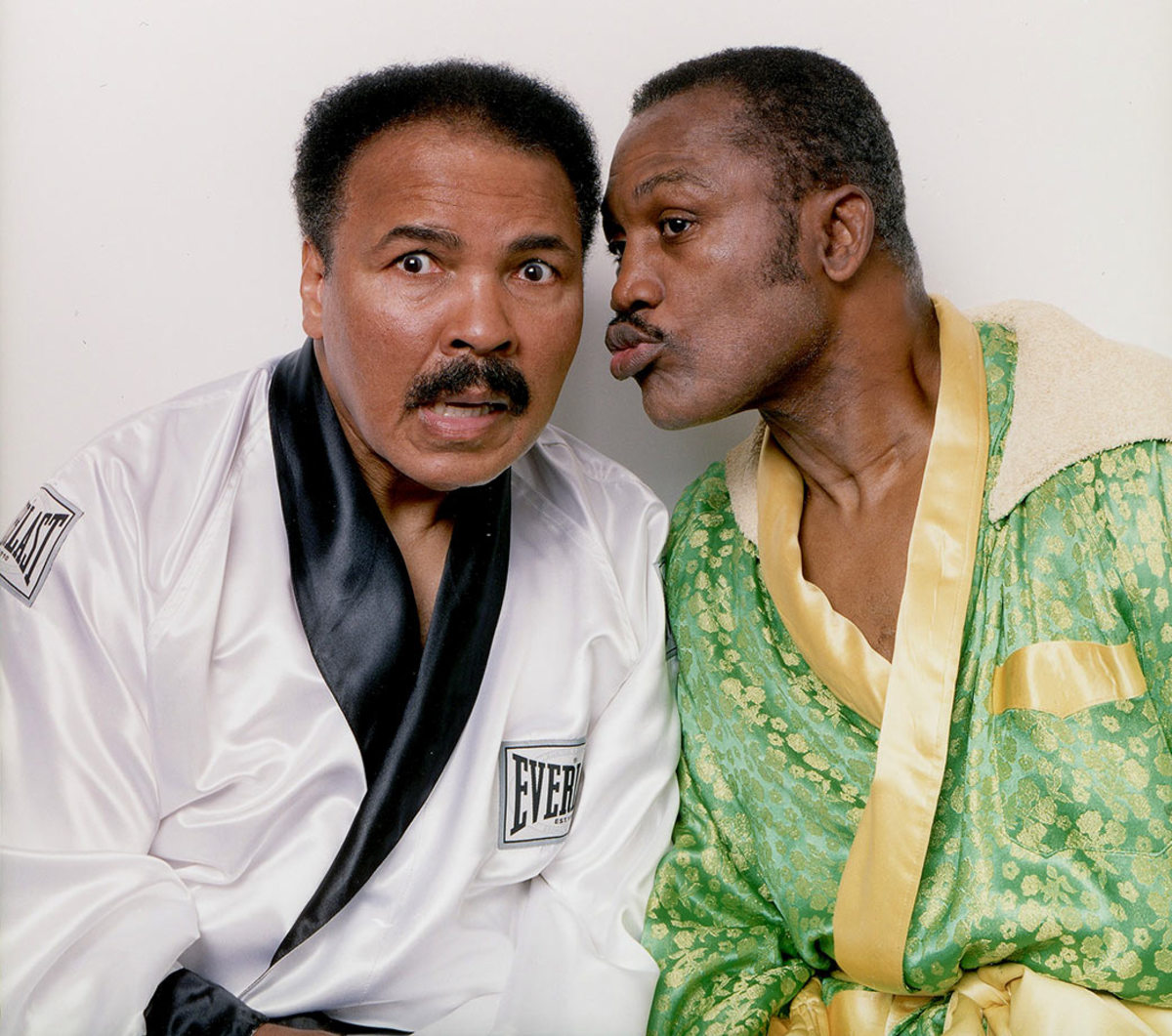
Fierce rivals in the ring, Ali and Joe Frazier pose for a portrait in the boxing robes they wore the night of their first bout at Frazier's Gym in 2003. Ali said after Frazier's death in 2011 that he was "a great champion."
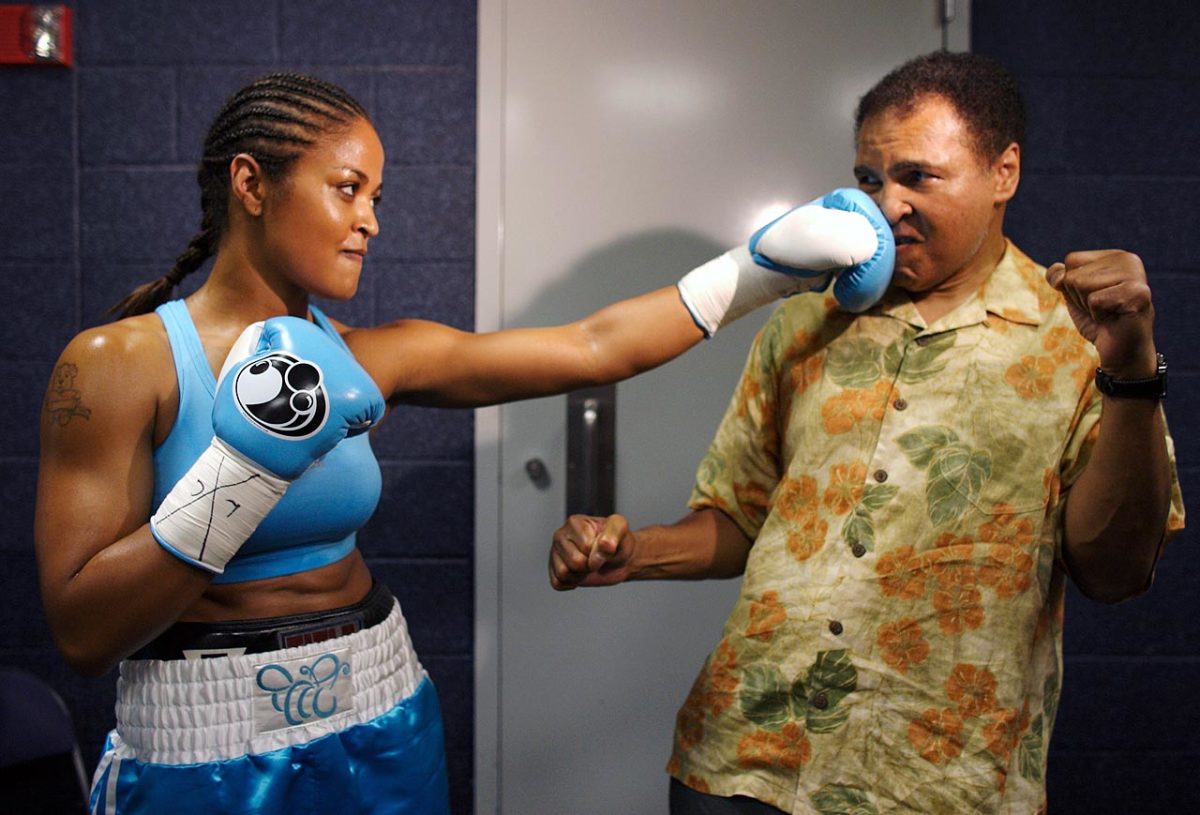
Ali takes a punch from his daughter Laila Ali while sparring before her fight against Erin Toughill in 2005. Laila retired from her own successful boxing career with a professional record of 24-0.
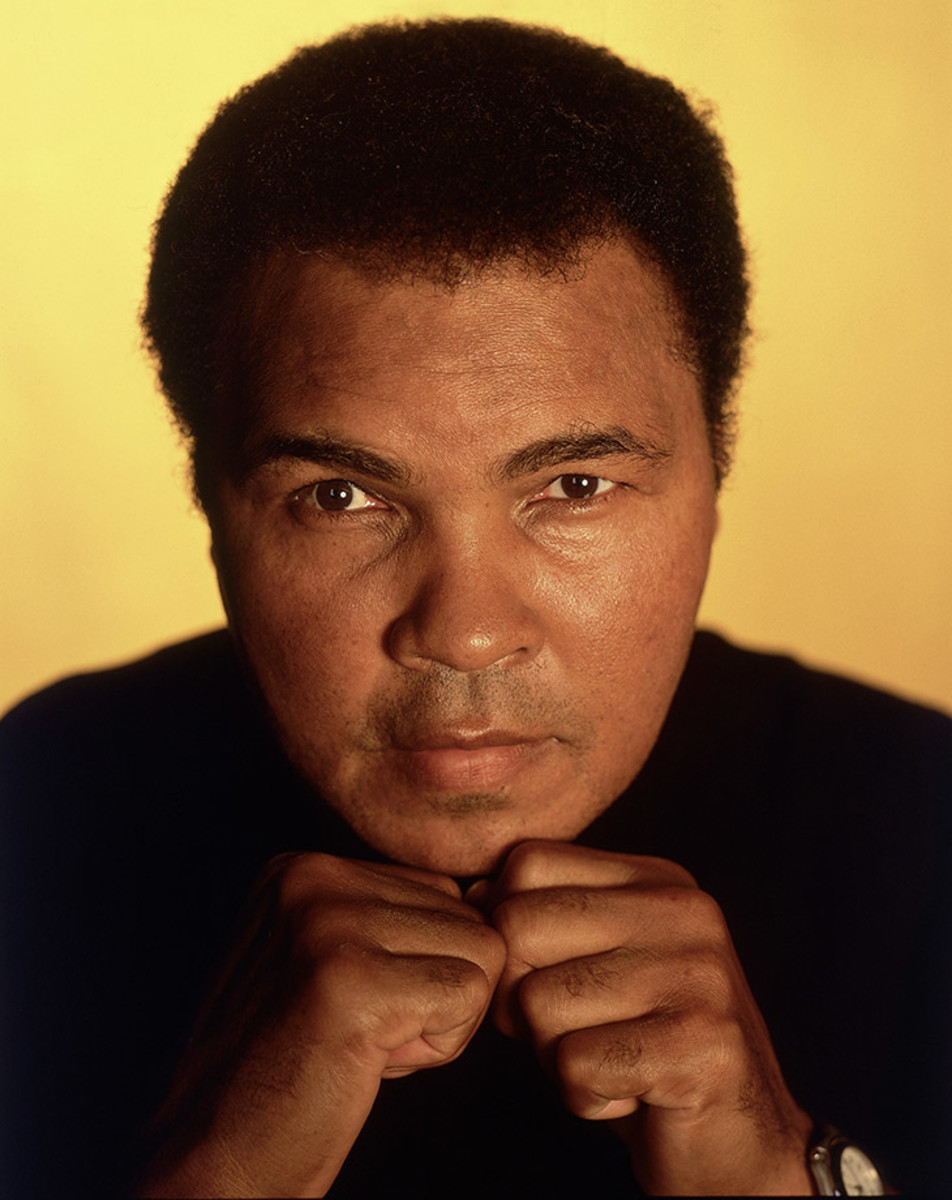
Ali poses with his fists up for a portrait in 2005.
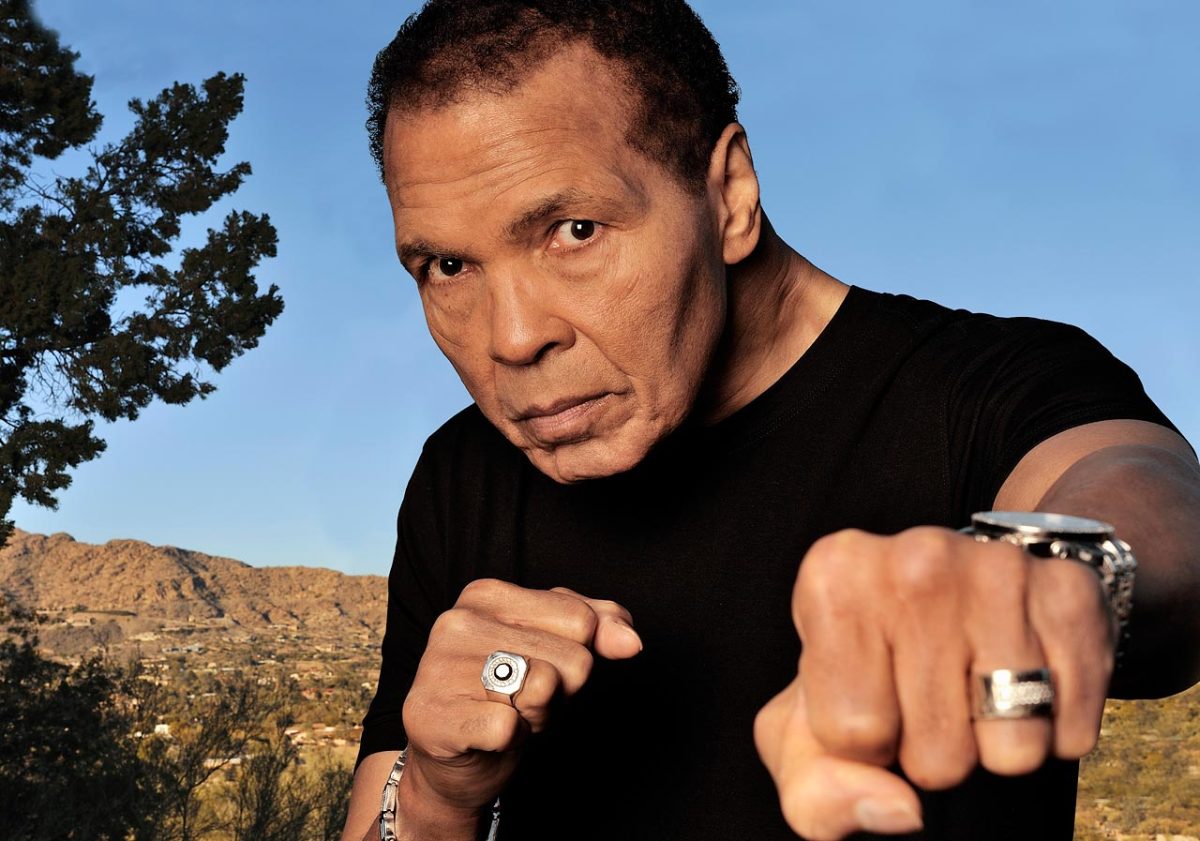
Ali poses with an extended punch in a 2012 photo shoot at his home in Paradise Valley, Ariz., to mark his 70th birthday.
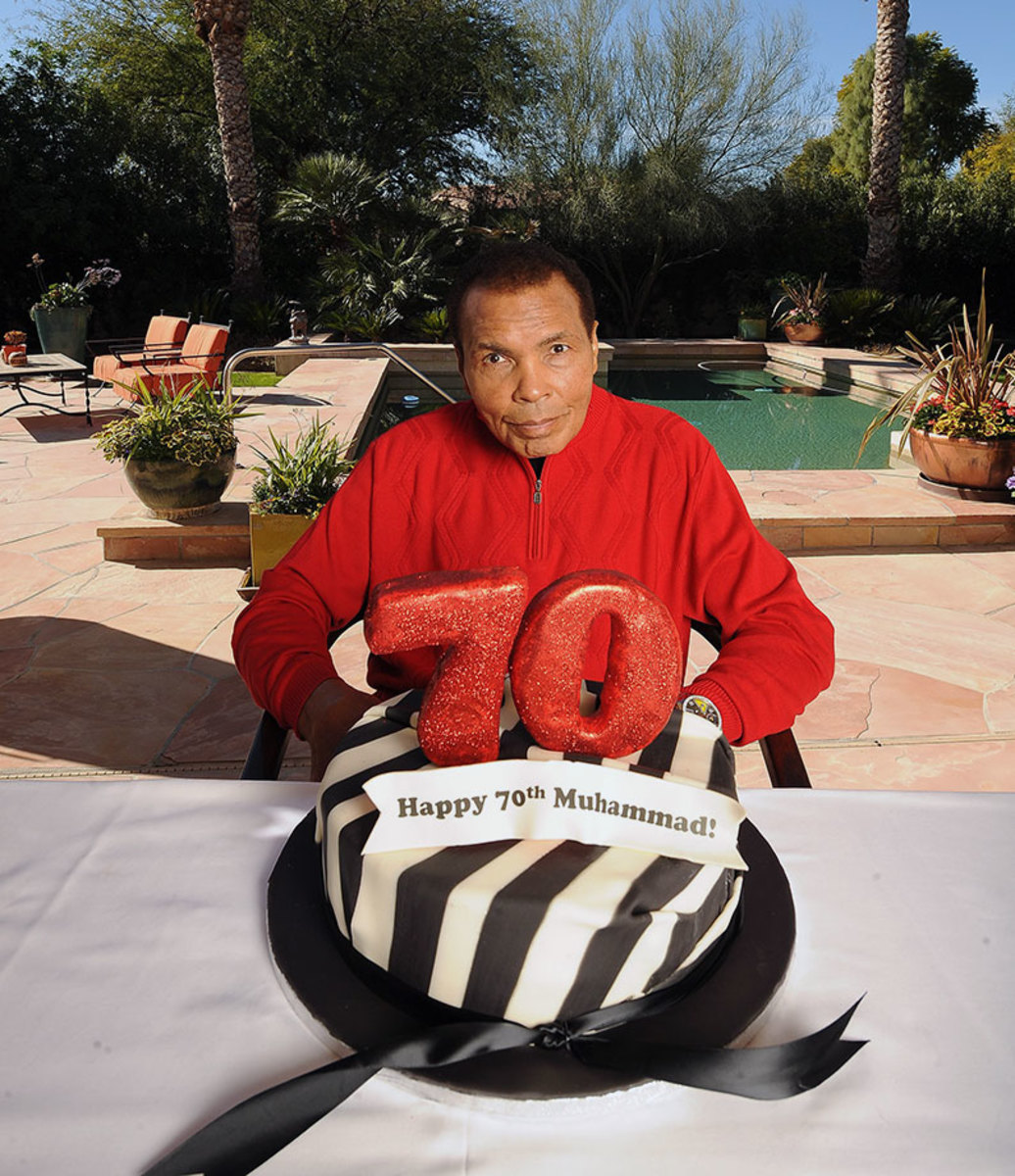
Ali sits in front of a 70th birthday cake in January 2012 at his Arizona home. Later that year he appeared at the opening ceremonies for the 2012 Olympics in London to escort the Olympic flag into the stadium, 52 years after he won gold in Rome.
